DEF 14A: Definitive proxy statements
Published on August 12, 2020
UNITED STATES
SECURITIES AND EXCHANGE COMMISSION
Washington, D.C. 20549
SCHEDULE 14A
Proxy Statement
Pursuant to Section 14(a) of the Securities
Exchange Act of
1934
 |
Filed by the Registrant |  |
Filed by a Party other than the Registrant |
| Check the appropriate box: | |
 |
Preliminary Proxy Statement |
 |
CONFIDENTIAL, FOR USE OF THE COMMISSION ONLY (AS PERMITTED BY RULE 14a-6(e)(2)) |
 |
Definitive Proxy Statement |
 |
Definitive Additional Materials |
 |
Soliciting Material under to §240.14a-12 |
Korn Ferry

(Name of Registrant as Specified In Its Charter)
(Name of Person(s) Filing Proxy Statement, if other than the Registrant)
| Payment of Filing Fee (Check the appropriate box): | |
 |
No fee required. |
 |
Fee computed on table below per Exchange Act Rules 14a-6(i)(1) and 0-11. |
| (1) Title of each class of securities to which transaction applies: | |
| (2) Aggregate number of securities to which transaction applies: | |
| (3) Per unit price or other underlying value of transaction computed pursuant to Exchange Act Rule 0-11 (set forth the amount on which the filing fee is calculated and state how it was determined): | |
| (4) Proposed maximum aggregate value of transaction: | |
| (5) Total fee paid: | |
 |
Fee paid previously with preliminary materials. |
 |
Check box if any part of the fee is offset as provided by Exchange Act Rule 0-11(a)(2) and identify the filing for which the offsetting fee was paid previously. Identify the previous filing by registration statement number, or the form or schedule and the date of its filing. |
| (1) Amount Previously Paid: | |
| (2) Form, Schedule or Registration Statement No.: | |
| (3) Filing Party: | |
| (4) Date Filed: | |
Inclusion Honesty Knowledge Performance NOTICE OF 2020 ANNUAL STOCKHOLDERS’ MEETING AND PROXY STATEMENT

Dear Fellow Stockholders
On behalf of the Korn Ferry (the “Company”) Board of Directors, I am pleased to invite you to attend our 2020 Annual Meeting of Stockholders on Wednesday, September 23, 2020 at 8:00 a.m. Pacific Time. In light of the coronavirus pandemic (“COVID-19”), the annual meeting will be conducted online this year through a live audiocast, which is often referred to as a “virtual meeting” of stockholders. Our digital format allows stockholders to participate safely, conveniently, and effectively at a time of increasing limitations on public gatherings and travel.
As we issue this 2020 Proxy Statement, our world has and continues to change rapidly, driven in large measure by COVID-19 and its economic, social, and personal impacts. Our thoughts and hearts are with everyone affected.
In addition to protecting our employees, clients, and others with whom we interact, we have challenged ourselves to remain leaders during this time. As a global enterprise, we have been agile in responding to local conditions, emphasized our adaptability across the Company, and pushed ourselves to keep moving forward. We have enacted detailed business continuity plans that allow us to continue to serve our clients while protecting the well-being of our people.
Korn Ferry colleagues have demonstrated time and again the resiliency of the firm’s culture as they work to maintain minimal operational disruption or reduction of service levels. Through this challenging time, they have powered numerous client conversations with guidance about navigating the impacts of COVID-19, including sharing insights about how some of our clients are approaching the path to recovery through their organizations, people, and leadership.
Alongside COVID-19, we have raised our voice on diversity, equity, and inclusion — both within Korn Ferry and in the services provided to our clients. Amid the long-overdue calls for racial equality, we quickly mobilized our expertise and offerings to answer the call not just for our clients, but also to reflect and improve ourselves.
While so much has happened in calendar year 2020, this Proxy Statement provides a moment to reflect on accomplishments throughout the fiscal year, such as in November 2019 when Korn Ferry acquired three companies in the leadership development area: Miller Heiman Group, AchieveForum, and Strategy Execution. This combination brought to us a world-class portfolio of learning, development, and performance improvement offerings that bolstered our firm’s substantial leadership development capabilities.
We believe that our long-term strategy is sound, and that our focus on clients, performance, knowledge, and operating discipline will best position us to navigate the future, just as it has throughout our firm’s history. The speed of change in global markets, and demand for coherent institutional responses will accelerate as we move forward. With this, we will continue to find better ways to do our work, to develop new capabilities, and to create strategies for success in these transformative times as we build an even stronger and more innovative company that delivers value to its employees, clients, stockholders, and communities.
I also want to take a moment to acknowledge Len Lauer, a member of our Board who passed in April 2020. The Company has lost a gifted and experienced advisor as Len continually sought to deepen his contribution to Korn Ferry’s strategic plans and execution. In turn, we also want to thank George Shaheen for rejoining the Board after Len’s passing, following many years of outstanding service to Korn Ferry.
I am honored to serve as Chair of this great company and to work alongside such an engaged, inclusive, and collaborative Board, dedicated management team, and outstanding workforce.
On behalf of our Board and all of our Korn Ferry colleagues, thank you for being a Korn Ferry stockholder and for your continued support of Korn Ferry.
Sincerely,

Christina A. Gold,
Chair of the Board
August 12, 2020
Korn Ferry
1900 Avenue of the Stars,
Suite 2600
Los Angeles, CA 90067
(310) 552-1834
|
i
|
This page intentionally left blank

Notice of
2020 Annual Meeting
Meeting Information
Date: September 23, 2020
Time: 8:00 a.m. Pacific Time
Virtual Meeting Site:
www.virtualshareholdermeeting.com/KFY2020
Record Date: July 29, 2020
Meeting Agenda
To the Stockholders:
In light of the public health and travel safety concerns relating to the coronavirus pandemic (“COVID-19”), on September 23, 2020, Korn Ferry (the “Company,” “we,” “its” and “our”) will hold its 2020 Annual Meeting of Stockholders (the “Annual Meeting”) online this year at www.virtualshareholdermeeting.com/KFY2020. The Annual Meeting will begin at 8:00 a.m. Pacific Time.
The purposes of the Annual Meeting are to:
| 1. | Elect the eight directors nominated by our Board of Directors and named in the Proxy Statement accompanying this notice to serve on the Board of Directors until the 2021 Annual Meeting of Stockholders and until their successors have been duly elected and qualified, subject to their earlier death, resignation or removal; |
| 2. | Vote on a non-binding advisory resolution to approve the Company’s executive compensation; |
| 3. | Ratify the appointment of Ernst & Young LLP as the Company’s independent registered public accounting firm for the Company’s 2021 fiscal year; and |
| 4. | Transact any other business that may be properly presented at the Annual Meeting. |
Only stockholders who owned our common stock as of the close of business on July 29, 2020 (the “Record Date”) can vote online at the Annual Meeting or any adjournments or postponements thereof. To attend the Annual Meeting online, vote or submit questions during the Annual Meeting, or view the stockholder list, go to www.virtualshareholdermeeting.com/KFY2020.
In the event of a technical malfunction or situation that the chair of the Annual Meeting determines may affect the ability of the Annual Meeting to satisfy the requirements for a meeting of stockholders to be held by means of remote

RECOMMENDATION
OF THE BOARD
THE BOARD UNANIMOUSLY RECOMMENDS THAT YOU VOTE YOUR SHARES “FOR” THE ELECTION OF EACH OF THE NOMINEES NAMED IN THE PROXY STATEMENT AND “FOR” EACH OF THE OTHER PROPOSALS.
communication under the Delaware General Corporation Law, or that otherwise makes it advisable to adjourn the Annual Meeting, the chair of the Annual Meeting will convene the meeting at 9:00 a.m. Pacific Time on the date specified above and at the Company’s address at 1900 Avenue of the Stars, Suite 2600, Los Angeles, CA 90067, solely for the purpose of adjourning the Annual Meeting to reconvene at a date, time and physical or virtual location announced by the chair of the Annual Meeting. Under either of the foregoing circumstances, we will post information regarding the announcement on the Investors page of the Company’s website at ir.kornferry.com/investor-relations.
Please read the proxy materials carefully before voting.
Your vote is important, and we appreciate your cooperation in considering and acting on the matters presented. See pages 61 - 63 in the accompanying Proxy Statement for a description of the ways by which you may cast your vote on the matters being considered at the Annual Meeting.
August 12, 2020
Los Angeles, California
By Order of the Board of Directors,

Jonathan Kuai
General Counsel, Managing Director of Business Affairs, and
Corporate Secretary
Important Notice Regarding the Availability of Proxy Materials for the Stockholder Meeting to be Held on September 23, 2020:
The Proxy Statement and accompanying Annual
Report to Stockholders are available at
www.proxyvote.com.
This page intentionally left blank
Proxy Summary
This summary highlights information contained elsewhere in this Proxy Statement. This summary does not contain all of the information that you should consider, and you should read the entire Proxy Statement carefully before voting. Page references are supplied to help you find further information in this Proxy Statement.
Annual Meeting of Stockholders (page 61)
Date and Time: September 23, 2020 at 8:00 a.m. Pacific Time
Virtual Meeting Site: www.virtualshareholdermeeting.com/KFY2020
Admission: To participate in the Annual Meeting online, including to vote during the Annual Meeting, stockholders will need the 16-digit control number included on their proxy card or voting instruction form.
Eligibility to Vote: You can vote if you were a holder of Korn Ferry’s common stock at the close of business on July 29, 2020.
Voting Matters (page 61)
| 1 |
Election of Directors Reference (for more detail) page 8 |
Board Vote Recommendation FOR each Director Nominee |
| 2 |
Advisory Resolution to Approve Executive Compensation Reference (for more detail) page 26 |
Board Vote Recommendation FOR |
| 3 |
Ratification of Independent Registered Public Accounting Firm Reference (for more detail) page 54 |
Board Vote Recommendation FOR |
How to Cast Your Vote (pages 61 - 63)
On or about August 12, 2020, we will mail a Notice of Internet Availability of Proxy Materials to stockholders of our common stock as of July 29, 2020, other than those stockholders who previously requested electronic or paper delivery of communications from us. Stockholders can vote by any of the following methods:
 |
Via telephone by calling 1-800-690-6903; |
 |
Via Internet: Before the Annual Meeting by visiting www.proxyvote.com; During the Annual Meeting by visiting www.virtualshareholdermeeting.com/KFY2020; or |
 |
Via mail (if you received your proxy materials by mail) by signing, dating and mailing the enclosed proxy card. |
| • | If you vote via telephone, you must vote no later than 11:59 p.m. Eastern Time on September 22, 2020. If you return a proxy card by mail, it must be received before the polls close at the Annual Meeting. |
|
1
|
Highlights for Fiscal Year 2020
Governance of the Company (page 17)
 |
||
| Responsive Governance Practices | ||
|
• Replaced Classified Board Structure with Annual Director Elections.
• Implemented Majority Voting in Uncontested Elections. |
• Removed Supermajority Voting Standards.
• In Response to Stockholder Feedback, Adopted Stockholder Right (at 25% Threshold) to Call Special Stockholder Meetings (see page 23 for more information). |
|
 |
 |
 |
||
| Board Structure | Committees, Attendance and | Stockholder Engagement | ||
| Commitments | ||||
|
• Independent Chair of the Board.
• 7 of the 8 Directors on the Board are Independent.
• Independent Directors Meet in Regular Executive Sessions.
• 10-Term Service Limit for Non-Executive Directors Joining the Board after October 1, 2020. |
• Independent Audit, Compensation and Nominating Committees.
• All Directors Attended at Least 75% of Board and Their Respective Committee Meetings.
• No Director Serves on More Than Four Public Company Boards. |
• Stockholder Communication Process for Communicating with the Board.
• Regular Stockholder Engagement Throughout the Year. |
| * | Adjusted EBITDA, and Adjusted EBITDA margin are non-GAAP financial measures. For a discussion of these measures and for reconciliation to the nearest comparable GAAP measures, see Appendix A to this Proxy Statement. |
|
2
|
| I Independent Director Tenure* (in years) | I Board Diversity | ||
| As of August 12, 2020 | As of August 12, 2020 | ||
 |
 |
||
| 5 years and less: 42.9% 6 to 10 years: 28.6% More than 10 years: 28.6% | |||
|
*
This graphic includes Mr. Shaheen’s cumulative service with the Board of Directors from 2009 to 2019, and from April 2020 to present. |
|||
Governance Insights (pages 9, 28, and 56)
Each of the Company’s standing Board committees is committed to staying abreast of the latest issues impacting good corporate governance. The Company has included three sets of Questions & Answers (“Q&As”), one with the chair of each of the Company’s standing committees.
These Q&As are meant to provide stockholders with insight into committee-level priorities and perspectives on environmental, social and governance matters, the impact of COVID-19 on compensation, and actions and oversight with regard to COVID-19 risks.
|
3
|
Board Nominees (pages 12 - 16)
 |
 |
 |
 |
|||
| Doyle N. BENEBY | Gary D. BURNISON | Christina A. GOLD | Jerry P. LEAMON | |||
| Director | Director and President/ CEO of Korn Ferry |
Director and Non-Executive Chair of the Board of Korn Ferry |
Director | |||
|
Age: 60 Director Since: 2015 Independent: Yes
Committee Memberships: • Nominating and Corporate Governance (Chair) • Compensation and Personnel
Experience/Qualifications: • President and CEO of Midland Cogeneration Venture. • Former CEO of New Generation Power International. • Former President and CEO of CPS Energy. • Brings extensive executive management experience in the energy industry. |
Age: 59 Director Since: 2007 Independent: No
Committee Memberships: -
Experience/Qualifications: • President and CEO of the Company. • Brings in-depth knowledge of the Company’s business, operations, employees and strategic opportunities.
|
Age: 72 Director Since: 2014 Independent: Yes
Committee Memberships: -
Experience/Qualifications: • Former President, CEO and Director of The Western Union Company. • Brings board experience, executive management and broad international experience.
|
Age: 69 Director Since: 2012 Independent: Yes
Committee Memberships: • Compensation and Personnel (Chair) • Audit
Experience/Qualifications: • Former Global Managing Director of Deloitte. • Brings financial accounting expertise and extensive global professional services experience. |
 |
 |
 |
 |
|||
| Angel R. MARTINEZ | Debra J. PERRY | Lori J. ROBINSON | George T. SHAHEEN | |||
| Director | Director | Director | Director | |||
|
Age: 65 Director Since: 2017 Independent: Yes
Committee Memberships: • Audit
Experience/Qualifications: • Former Chairman of the Board of Directors, and Former President and CEO, of Deckers Brands (formerly known as Deckers Outdoor Corporation). • Brings executive management, product, and marketing experience. |
Age: 69 Director Since: 2008 Independent: Yes
Committee Memberships: • Audit (Chair) • Nominating and Corporate Governance
Experience/Qualifications: • Former senior managing director in the Global Ratings and Research Unit of Moody’s Investors Service, Inc. • Brings executive management, corporate governance, finance and analytical expertise and board and committee experience. |
Age: 61 Director Since: 2019 Independent: Yes
Committee Memberships: • Compensation and Personnel • Nominating and Corporate Governance
Experience/Qualifications: • Former Commander, U.S. Northern Command and NORAD (North American Aerospace Defense Command), Department of the Air Force (Ret.). • Brings significant leadership, strategy oversight and execution and international experience and expertise. |
Age: 76 Director Since: 2020 (previously a Director from 2009-2019) Independent: Yes
Committee Memberships: - • Compensation and Personnel • Nominating and Corporate Governance
Experience/Qualification: • Former Non-Executive Chair of the Board of Korn Ferry and former Chief Executive Officer of Siebel Systems, Inc. • Brings executive management, consulting, board and advisory experience. |
|
4
|
2020 Executive Compensation Summary (pages 38 - 39)
|
Name and Principal Position |
Salary ($) |
Stock Awards ($) |
Non-Equity Incentive Plan Compensation ($) |
Change in Pension Value and Nonqualified Deferred Compensation Earnings ($) |
All Other Compensation ($) |
Total ($) |
||||||
|
Gary D. Burnison, President and Chief Executive Officer |
910,000 | 3,448,284 | — | 71,951 | 12,750 | 4,442,985 | ||||||
|
Robert P. Rozek, Executive Vice President, Chief Financial Officer and Chief Corporate Officer |
575,000 | 1,432,509 | — | — | 12,750 | 2,020,259 | ||||||
|
Byrne Mulrooney, Chief Executive Officer of RPO, Professional Search and Digital |
450,000 | 1,047,610 | — | — | 235,320 | 1,732,930 | ||||||
|
Mark Arian, Chief Executive Officer of Consulting |
450,000 | 518,818 | — | — | 262,084 | 1,230,902 |
2020 Executive Total Compensation Mix (page 29)
| * | Equity awards based upon grant date value. In light of the impact of COVID-19, the Compensation and Personnel Committee decided to eliminate the annual cash incentive payouts for fiscal year 2020. |
|
5
|
Compensation Process Highlights (pages 21 and 28 - 31)
| • | Our Compensation and Personnel Committee receives advice from its independent compensation consultant. |
| • | We review total direct compensation and the mix of the compensation components for the named executive officers relative to our peer group as one of the factors in determining if compensation is adequate to attract and retain executive officers with the unique set of skills necessary to manage and motivate our global people and organizational advisory firm. |
| • | In order to assist the Company’s efforts in weathering the economic environment created by COVID-19, the Company and each of the named executive officers agreed to a reduction in each named executive officer’s base salary by 50%, effective May 1, 2020 through August 31, 2020 (which period was subsequently extended through December 31, 2020). The Compensation and Personnel Committee exercised its negative discretion to eliminate entirely the annual cash incentives for each of the named executive officers for fiscal year 2020 in light of the ongoing economic impact of COVID-19 on the Company. |
Elements of Compensation (pages 31 - 35)
| Element | Purpose | Determination | ||
| Base Salary | Compensate for services rendered during the fiscal year and provide sufficient fixed cash income for retention and recruiting purposes. | Reviewed on an annual basis by the Compensation and Personnel Committee taking into account competitive data from our peer group, input from our compensation consultant, and the executive’s individual performance. Reduced by 50% through December 31, 2020 as described above in fiscal year 2021 to address the financial impact of COVID-19. | ||
| Annual Cash Incentives | Motivate and reward named executive officers for achieving financial and strategy execution goals over a one-year period. | Determined by the Compensation and Personnel Committee based upon performance goals, strategic objectives, competitive data, and individual performance. Negative discretion exercised resulting in no bonus for fiscal year 2020 in response to the financial impact of COVID-19. | ||
| Long-Term Incentives | Align the named executive officers’ interests with those of stockholders, encourage the achievement of the long-term goals of the Company, and motivate and retain top talent. | Determined by the Compensation and Personnel Committee based upon a number of factors including competitive data, total overall compensation provided to each named executive officer, and historic grants. |
Compensation Practices (page 28)
 |
Our Board has adopted a clawback policy applicable to all cash incentive payments and performance-based equity awards granted to executive officers. |
 |
Our named executive officers are not entitled to any “single trigger” equity acceleration in connection with a change in control. |
 |
We have adopted policies prohibiting hedging, speculative trading or pledging of Company stock. |
 |
All named executive officers are subject to stock ownership requirements. |
 |
We do not provide excise tax gross-ups to any of our executive officers. |
 |
We proactively reduced the compensation of our Board and our named executive officers to align ourselves with the challenges that COVID-19 is presenting globally. |
Forward-Looking Statements & Website References
This Proxy Statement contains “forward-looking statements” within the meaning of the “safe harbor” provisions of the United States Private Securities Litigation Reform Act of 1995. Forward-looking statements may be identified by the use of words such as “anticipate,” “believe,” “expect,” “estimate,” “plan,” “outlook,” and “project” and other similar expressions that predict or indicate future events or trends or that are not statements of historical matters. Such forward-looking statements include, but are not limited to, statements regarding the Company’s plans, objectives, expectations and intentions. Such statements are based on current expectations and are subject to numerous risks and uncertainties, many of which are outside of the control of Korn Ferry. Actual results may differ materially from those indicated by such forward-looking statements as a result of risks and uncertainties, including those factors discussed or referenced in our most recent annual report on Form 10-K filed with the SEC, under the heading “Risk Factors,” a copy of which is being made available with this Proxy Statement, and subsequent quarterly reports on Form 10-Q. Website references and hyperlinks throughout this document are provided for convenience only, and the content on the referenced websites is not incorporated by reference into this Proxy Statement, nor does it constitute a part of this Proxy Statement.
|
6
|

|
7
|
Election of Directors
Our stockholders will be asked to consider eight nominees for election to our Board of Directors to serve for a one-year term until the 2021 Annual Meeting of Stockholders and until their successors have been duly elected and qualified, subject to their earlier death, resignation or removal. Each of the nominees was previously elected by stockholders at the 2019 Annual Meeting of Stockholders, with the exception of George Shaheen, who retired from our Board of Directors at the 2019 Annual Meeting of Stockholders and rejoined our Board of Directors in April 2020 after the unexpected passing of Len Lauer. In light of Mr. Shaheen’s continued and significant contributions as a director, the Board, at the recommendation of the Nominating and Corporate Governance Committee, exercised its right under the Corporate Governance Guidelines to nominate Mr. Shaheen to a second additional term after his 74th birthday.
The names of the eight nominees for director and their current positions with the Company are set forth in the table to the right. Detailed biographical information regarding each of these nominees is provided in this Proxy Statement under the heading “The Board of Directors.”
Our Nominating and Corporate Governance Committee has reviewed the qualifications of each of the nominees and has recommended to the Board that each nominee be submitted to a vote at the Annual Meeting.
All of the nominees have indicated their willingness to serve, if elected, but if any should be unable or unwilling to serve, proxies may be voted for a substitute nominee designated by the Board. The Company did not receive any stockholder nominations for director. Mr. Shaheen was identified by the Nominating and Corporate Governance Committee. Proxies cannot be voted for more than the number of nominees named in this Proxy Statement.
| Name | Position with Korn Ferry |
| Doyle N. Beneby | Director |
| Gary D. Burnison | Director and Chief Executive Officer |
| Christina A. Gold | Director and Non-Executive Chair of the Board |
| Jerry P. Leamon | Director |
| Angel R. Martinez | Director |
| Debra J. Perry | Director |
| Lori J. Robinson | Director |
| George T. Shaheen | Director |
Required Vote
In uncontested elections, directors are elected by a majority of the votes cast, meaning that each director nominee must receive a greater number of shares voted “for” such nominee than the shares voted “against” such nominee. If an incumbent director does not receive a greater number of shares voted “for” such director than shares voted “against” such director, then such director must tender his or her resignation to the Board. In that situation, the Company’s Nominating and Corporate Governance Committee would make a recommendation to the Board about whether to accept or reject the resignation, or whether to take other action. Within 90 days from the date the election results were certified, the Board would act on the Nominating and Corporate Governance Committee’s recommendation and publicly disclose its decision and rationale behind it.
In a contested election — a circumstance we do not anticipate at the Annual Meeting — directors are elected by a plurality of the votes cast.

RECOMMENDATION
OF THE BOARD
The Board unanimously recommends that you vote “FOR” each of the nominees named above for election as a director.
|
8
|
The Company’s Restated Certificate of Incorporation provides that the number of directors shall not be fewer than eight nor more than fifteen, with the exact number of directors within such limits to be determined by the Board. Currently, the Board is comprised of eight directors. Upon the recommendation of the Company’s Nominating and Corporate Governance Committee, the Board has nominated the following persons to serve as directors until the 2021 Annual Meeting of Stockholders or their earlier death, resignation or removal:
| Doyle N. Beneby | Angel R. Martinez |
| Gary D. Burnison | Debra J. Perry |
| Christina A. Gold | Lori J. Robinson |
| Jerry P. Leamon | George T. Shaheen |
Each of the named nominees is independent under the NYSE rules, except for Mr. Burnison. If reelected, Ms. Gold will continue to serve as the Company’s independent Non-Executive Chair of the Board.
The Board held seven meetings during fiscal year 2020. Each of the incumbent directors attended at least 75% of the Board meetings and the meetings of committees of which they were members in fiscal year 2020. Directors are expected to attend each annual meeting of stockholders. Seven of the directors then-serving attended the 2019 Annual Meeting of Stockholders in person. William Floyd, who was not standing for re-election, did not attend.
Environmental, Social, and Governance (“ESG”) Matters
Q & A with Doyle Beneby, Chair of the Nominating and Corporate Governance Committee
Question: How has Korn Ferry aligned ESG principles with its purpose and values?
Our commitment to act ethically and with social awareness begins with each of us and is embedded in our core values, which guide the way we work together and with others. We sponsor initiatives that improve the way we work and live, give back to the communities in which we operate, and that empower diversity and inclusivity. Korn Ferry’s 2018 / 2019 Corporate Responsibility Report highlights how the Company aligns ESG issues to our purpose and values. Some recent ESG initiatives and recognitions include:
| • | Appointment of a Chief Diversity Officer, Mike Hyter. Mr. Hyter has played an instrumental role in growing the breadth of Korn Ferry’s Diversity & Inclusion (“D&I”) business. As Chief Diversity Officer, Mr. Hyter reports directly to Mr. Burnison and is part of Korn Ferry’s senior executive team. The creation of this role elevates the Company’s ongoing focus on D&I programs and initiatives, the embrace of diverse perspectives and backgrounds, and Korn Ferry’s dedication to driving meaningful change within Korn Ferry and with clients. |
| • | For the second consecutive year, Korn Ferry earned a perfect score of 100 on the Human Rights Campaign Foundation’s Corporate Equality Index, which is the U.S. national benchmarking tool on corporate policies and practices pertinent to LGBTQ employees. In 2019 and 2020, the Human Rights Campaign Foundation named Korn Ferry as a “best place to work” for LGBTQ equality. Korn Ferry was also recognized by Working Mother as one of the 2019 Best Companies. Working Mother honors companies that offer inclusive benefits for families, including generous maternity and parental leave, and affordable emergency childcare. Korn Ferry is committed to D&I, and these awards validate our efforts to be a premier career destination for our current and future colleagues from all backgrounds. |
| • | Korn Ferry was awarded the 2020 Silver Status Medal from EcoVadis for its Corporate Social Responsibility (“CSR”) practices. This represents a score in the top 25% of the approximately 65,000 companies that EcoVadis assessed. EcoVadis is an independent industry standard for evaluating and rating how well a company has integrated the principles of CSR into its business practices by using a stringent methodology covering numerous criteria across categories of the environment, labor and human rights, ethics and sustainable procurement. Korn Ferry also achieved Silver Status in 2019, and increased its performance scores in 2020 by 20% for environment, 20% for labor and human rights, and 15% for business ethics. For the past four years, Korn Ferry has also responded to the CDP Climate Change survey, reporting on our greenhouse gas emissions and broader practices related to climate change, and we have improved our CDP score over time. |
|
9
|
The Board believes that the Board, as a whole, should possess a combination of skills, professional experience, and diversity of backgrounds necessary to oversee the Company’s business. In addition, the Board believes there are certain attributes every director should possess, as reflected in the Board’s membership criteria discussed below. Accordingly, the Board and the Nominating and Corporate Governance Committee consider the qualifications of directors and director candidates individually and in the broader context of the Board’s overall composition and the Company’s current and future needs.
The Nominating and Corporate Governance Committee is responsible for developing and recommending Board membership criteria to the full Board for approval. The criteria, which are set forth in the Company’s Corporate Governance Guidelines include:
| • | a reputation for integrity, |
| • | honesty and adherence to high ethical standards, |
| • | strong management experience, |
| • | current knowledge of and contacts in the Company’s industry or other industries relevant to the Company’s business, |
| • | the ability and willingness to commit adequate time and attention to Board and Committee activities, and |
| • | the fit of the individual’s skills and personality with those of other directors in building a Board that is effective, collegial, diverse, and responsive to the needs of the Company. |
The Nominating and Corporate Governance Committee seeks a variety of occupational, educational, and personal backgrounds on the Board in order to obtain a range of viewpoints and perspectives and to enhance the diversity of the Board in such areas as professional experience, geography, race, gender, and ethnicity. While the Nominating and Corporate Governance Committee does not have a formal policy with respect to diversity, the Nominating and Corporate Governance Committee believes it is essential that Board members represent diverse viewpoints and backgrounds. The Nominating and Corporate Governance Committee periodically evaluates the composition of the Board to assess the skills and experience that are currently represented on the Board, as well as the skills and experience that the Board will find valuable in the future, given the Company’s current business and strategic plans. This periodic assessment enables the Board to update the skills and experience it seeks in the Board as a whole and in individual directors as the Company’s needs evolve and change over time, and to assess the effectiveness of efforts to pursue diversity. In identifying director candidates from time to time, the Nominating and Corporate Governance Committee considers recommendations from Board members, management, and stockholders, and may from time to time engage a third-party search firm or Company resources. The Nominating and Corporate Governance Committee may establish specific skills and experience that it believes the Company should seek in order to constitute a balanced and effective board.
In evaluating director candidates, and considering incumbent directors for renomination to the Board, the Nominating and Corporate Governance Committee takes into account a variety of factors. These include each nominee’s independence, financial literacy, personal and professional accomplishments, and experience, each in light of the composition of the Board as a whole and the needs of the Company in general, and for incumbent directors, past performance on the Board. The Nominating and Corporate Governance Committee also considers each nominee’s or incumbent director’s ability and willingness to commit adequate time to Board and committee matters, including, for 2020, Ms. Perry’s additional responsibilities as a board chair and member of three other public company or mutual fund complex boards, and in the case of Mr. Shaheen, his service on three other public company board of directors.
|
10
|

All director nominees possess:
| • | Relevant Senior Leadership / CEO Experience |
| • | Innovative Thinking |
| • | High Ethical Standards |
| • | Appreciation of Diverse Cultures and Backgrounds |
The Board and Company are focused on creating a Board that reflects a wide range of backgrounds, experiences and cultures. 62.5% of our current Board members and director nominees are women or ethnically diverse individuals.

The Company believes that a variety of tenures on our Board helps to provide an effective mix of deep knowledge and new perspectives. The current tenure of our Board is as follows:
| * | This graphic includes Mr. Shaheen’s cumulative service with the Board of Directors from 2009 to 2019, and from April 2020 to present. |
|
11
|
Background Information Regarding Director Nominees
The biographies below set forth information about each of the director nominees, including each such person’s specific experience, qualifications, attributes, and skills that led our Board to conclude that such director nominee should serve on our Board in light of the Company’s current business, structure, and strategic plans. The process undertaken by the Nominating and Corporate Governance Committee in recommending qualified director candidates is described below under “Corporate Governance—Board Committees—Nominating and Corporate Governance Committee.”
|
Doyle N. BENEBY
Director Since: 2015
President and Chief Executive Officer, Midland Cogeneration Venture
Age: 60
|
Board Qualifications and Skills:
Extensive Senior Leadership/Executive Officer Experience: Currently serves as President and Chief Executive Officer of Midland Cogeneration Venture, and previously served in a multitude of senior leadership positions, including as former Chief Executive Officer of New Generation Power International, as President and Chief Executive Officer of CPS Energy, and various leadership roles at PECO Energy and Exelon Power, where he served as President.
Broad Energy Industry Experience: Over 30 years of experience in the energy industry, with expertise in many facets of the electric & gas utility industry.
Other Directorships:
Public Companies:
Quanta Services and Capital Power Corporation
Other Companies:
Midland Business Alliance
|
Mr. Beneby has been the President and Chief Executive Officer of Midland Cogeneration Venture, a natural gas fired combined electrical energy and steam energy generating plant, since November 2018, and is also currently an independent consultant and professional director. Mr. Beneby previously served as Chief Executive Officer of New Generation Power International, a start-up international renewable energy company, based in Chicago, Illinois, from November 2015 until May 2016. Prior to that, Mr. Beneby served as President and Chief Executive Officer of CPS Energy, the largest municipal electric and gas utility in the nation, from July 2010 to November 2015. Prior to joining CPS Energy, Mr. Beneby served at Exelon Corporation from 2003 to 2010 in various roles, most recently, as President of Exelon Power and Senior Vice President of Exelon Generation from 2009 to 2010. From 2008 to 2009, Mr. Beneby served as Vice President, Generation Operations for Exelon Power. From 2005 to 2008, Mr. Beneby served as Vice President, Electric Operations for PECO Energy, a subsidiary of Exelon Corporation. Mr. Beneby also serves on the boards of Capital Power Corporation and Quanta Services, in addition to being a member of the board of the Midland Business Alliance.
|
12
|
|
Gary D. BURNISON
Director Since: 2007
President and Chief Executive Officer
Age: 59
|
Board Qualifications and Skills:
High Level of Financial Experience: Substantial financial experience gained in roles as President, Chief Executive Officer and as former Chief Financial Officer and Chief Operating Officer of the Company, as Chief Financial Officer of Guidance Solutions, as an executive officer of Jefferies & Company, Inc. and as a partner at KPMG Peat Marwick.
Senior Leadership/Executive Officer Experience: In addition to serving as the Company’s President and Chief Executive Officer, served as Chief Financial Officer of Guidance Solutions.
Extensive Knowledge of the Company’s Business and Industry: Over 18 years of service with the Company, including as President and Chief Executive Officer of the Company since July 2007, Chief Financial Officer from March 2002 until June 2007, and Chief Operating Officer of the Company from October 2003 until June 2007.
Thought Leader: Author of seven leadership and career development books, and regular content focused on the intersection of strategy, talent, and leadership; frequent contributor to media outlets.
Other Directorships:
Public Companies:
N/A
Other Companies:
N/A
|
Mr. Burnison has served as President and Chief Executive Officer of the Company since July 2007. He was the Executive Vice President and Chief Financial Officer of the Company from March 2002 until June 30, 2007. He also served as Chief Operating Officer of the Company from October 2003 until June 30, 2007. From 1999 to 2001, Mr. Burnison was Principal and Chief Financial Officer of Guidance Solutions and from 1995 to 1999 he served as an executive officer and member of the board of directors of Jefferies & Company, Inc., the principal operating subsidiary of Jefferies Group, Inc. Prior to that, Mr. Burnison was a partner at KPMG Peat Marwick.
|
Christina A. GOLD
Director Since: 2014
Chair of the Board
Age: 72
|
Board Qualifications and Skills:
Extensive Senior Leadership/Executive Officer Experience: Served in numerous senior leadership positions, including as Chief Executive Officer and President of The Western Union Company, President of Western Union Financial Services, Vice Chairman and Chief Executive Officer of Excel Communications and President and CEO of Beaconsfield Group, Inc.
Broad International Experience: Significant international experience from 28-year career at Avon Products, Inc., including as Senior Vice President & President of Avon North America.
Significant Public Company Board Experience: Over 23 years of public company board experience, including as a director of International Flavors & Fragrances, Inc. since 2013, ITT Inc. (formerly ITT Corporation) from 1997 to 2020, Exelis Inc. from 2011 to 2013, and The Western Union Company from 2006 to 2010.
Other Directorships:
Public Companies:
International Flavors & Fragrances, Inc.
Other Companies:
Safe Water Network
|
From September 2006 until her retirement in September 2010, Ms. Gold was Chief Executive Officer, President and a director of The Western Union Company, a leading company in global money transfer. Ms. Gold was President of Western Union Financial Services, Inc. and Senior Executive Vice President of First Data Corporation, former parent company of The Western Union Company and provider of electronic commerce and payment solutions, from May 2002 to September 2006. Prior to that, Ms. Gold served as Vice Chairman and Chief Executive Officer of Excel Communications, Inc., a former telecommunications and e-commerce services provider, from October 1999 to May 2002. From 1998 to 1999, Ms. Gold served as President and Chief Executive Officer of Beaconsfield Group, Inc., a direct selling advisory firm that she founded. Prior to founding Beaconsfield Group, Ms. Gold spent 28 years (from 1970 to 1998) with Avon Products, Inc., in a variety of positions, including as Executive Vice President, Global Direct Selling Development, Senior Vice President and President of Avon North America, and Senior Vice President & Chief Executive Officer of Avon Canada. Ms. Gold is currently a director of International Flavors & Fragrances, Inc. She also sits on the board of Safe Water Network, a non-profit organization working to develop locally owned, sustainable solutions to provide safe drinking water. From 1997 to 2020, Ms. Gold was a director of ITT Inc. (formerly ITT Corporation); from 2001 to 2020, she was a director of New York Life Insurance; and from October 2011 to May 2013, she was a director of Exelis, Inc. Ms. Gold is also on the Board of Governors of Carleton University in Ottawa Canada.
|
13
|
|
Jerry P. LEAMON
Director Since: 2012
Former Global Managing Director, Deloitte
Age: 69
|
Board Qualifications and Skills:
High Level of Financial Experience: Substantial financial experience gained from an almost 40-year career with Deloitte, including as leader of the tax practice and as leader of the mergers and acquisition (“M&A”) practice for more than 10 years.
Accounting Expertise: In addition to an almost 40-year career with Deloitte, Mr. Leamon is a certified public accountant.
Broad International Experience: Served as leader of Deloitte’s tax practice, both in the U.S. and globally, and was Global Managing Director for all client programs.
Service Industry Experience: Deep understanding of operational and leadership responsibilities within the professional services industry, having held senior leadership positions at Deloitte while serving some of their largest clients.
Other Directorships:
Public Companies:
Credit Suisse USA, a subsidiary of Credit Suisse Group AG
Other Companies:
Geller & Company, Americares Foundation, Jackson Hewitt Tax Services, and member of Business Advisory Council of the Carl H. Lindner School of Business.
|
Mr. Leamon served as Global Managing Director for Deloitte until his retirement in 2012, having responsibility for all of Deloitte’s businesses at a global level. In a career of almost 40 years at Deloitte, 31 of which as a partner, he held numerous roles of increasing responsibility. Previously, Mr. Leamon served as the leader of the tax practice, both in the U.S. and globally, and had responsibility as Global Managing Director for all client programs including industry programs, marketing communication and business development. In addition, Mr. Leamon was leader of the M&A practice for more than 10 years. Throughout his career, Mr. Leamon served some of Deloitte’s largest clients. Mr. Leamon serves on a number of boards of public, privately held and non-profit organizations, including Credit Suisse USA, where he chairs the Audit Committee, Geller & Company, and Jackson Hewitt Tax Services, and he is Chairman of the Americares Foundation. Mr. Leamon is also a Limited Partner of Lead Edge Capital. He is also Trustee Emeritus of the University of Cincinnati Foundation and Board and serves as a member of the Business Advisory Council of the Carl H. Lindner School of Business. Mr. Leamon is a certified public accountant.
|
Angel R. MARTINEZ
Director Since: 2017
Former Chairman of the Board of Directors, and former Chief Executive Officer and President, of Deckers Brands
Age: 65
|
Board Qualifications and Skills:
Extensive Senior Leadership/Executive Officer Experience: Served in numerous senior leadership positions, including as Chief Executive Officer and President of Deckers Brands, Executive Vice President and Chief Marketing Officer of Reebok International Ltd., President of The Rockport Company, and President and Chief Executive Officer of Keen, LLC.
Broad Product and Marketing Experience: Almost 40 years of experience in product and marketing from senior positions with, among other companies, Deckers Brands, Reebok International and The Rockport Company.
Significant Public Company Board and Corporate Governance Experience: Over 22 years of public company board service, including as a director of Tupperware Brands Corporation from 1998 to 2020 and Chairman of the Board of Deckers Brands from 2008 to 2017.
Other Directorships:
Public Companies:
N/A
Other Companies:
N/A
|
Mr. Martinez is the former President, Chief Executive Officer and Chairman of the Board of Directors of Deckers Brands (formerly known as Deckers Outdoor Corporation) (“Deckers”). Deckers is a global leader in designing, marketing and distributing innovative footwear, apparel, and accessories developed for both everyday casual lifestyle use and high performance activities. He served as Chief Executive Officer and President of Deckers from April 2005 until his retirement in June 2016, as Executive Chairman of the Board from 2008 until June 2016, and as non-executive Chairman from June 2016 until September 2017. Prior to joining Deckers, he was President, Chief Executive Officer and Vice Chairman of Keen LLC, an outdoor footwear manufacturer, from April 2003 to March 2005. Prior thereto, he served as Executive Vice President and Chief Marketing Officer of Reebok International Ltd. (Reebok) and as Chief Executive Officer and President of The Rockport Company, a subsidiary of Reebok. Mr. Martinez graduated from the University of California, Davis, in 1977.
|
14
|
|
Debra J. PERRY
Director Since: 2008
Former senior managing director in the Global Ratings and Research Unit of Moody’s Investors Service, Inc.
Age: 69
|
Board Qualifications and Skills:
High Level of Financial Experience: Substantial financial experience gained from 23 years of professional experience in financial services, including a 12-year career at Moody’s Corporation, where among other things, Ms. Perry oversaw the Americas Corporate Finance, Leverage Finance and Public Finance departments.
Significant Audit Committee Experience: Over 16 years of public company audit committee service, including as a member of MBIA Inc.’s Audit Committee (2004 to 2008), PartnerRe’s Audit Committee (from June 2013 to March 2016, including as Chair of the Audit Committee from January 2015 to March 2016) and Korn Ferry’s Audit Committee (since 2008; appointed Chair of Audit Committee in 2010).
Significant Public Company Board and Corporate Governance Experience: Previously served as a director (June 2013 to March 2016) and Chair of the Audit Committee (January 2015 to March 2016) of PartnerRe, and as a director of BofA Funds Series Trust (June 2011 to April 2016), MBIA Inc. (2004 to 2008) and CNO Financial Group, Inc. (2004 to 2011). Actively involved in corporate governance organizations, including the National Association of Corporate Directors (“NACD”). Named in 2014 to NACD’s Directorship 100, which recognizes the most influential people in the boardroom and corporate governance community.
Other Directorships:
Public Companies:
Assurant and Genworth Financial Inc.
Other Companies:
The Bernstein Funds, Inc., a mutual fund complex
|
Ms. Perry currently serves on the boards of directors of Assurant (as well as its Finance & Risk Committee, which she chairs, and its Nominating and Governance Committee) (elected August 2017), Genworth Financial Inc. (as well as its Audit Committee and Risk Committee) (elected December 2016), and The Bernstein Funds, Inc. (a mutual fund complex that includes the Sanford C. Bernstein Fund, Inc., Bernstein Fund and A/B Multi-Manager Alternative Fund) (elected July 2011 and Chair since July 2018). She was a member of the Board (from June 2013) and Chair of the Audit Committee (from January 2015) of PartnerRe, a Bermuda-based reinsurance company, until the sale of the company to a European investment holding company in March 2016. She was also a trustee of the Bank of America Funds from June 2011 until April 2016, where she served as Chair of the Board’s Governance Committee. Ms. Perry served on the Board of Directors and Chair of the Human Resources and Compensation Committee of CNO Financial Group, Inc., from 2004 to 2011.
In 2014, Ms. Perry was named to NACD’s Directorship 100, which recognizes the most influential people in the boardroom and corporate governance community. From September 2012 to December 2014, Ms. Perry served as a trustee of the Executive Committee of the Committee for Economic Development (“CED”) in Washington, D.C., a non-partisan, business-led public policy organization, until its merger with the Conference Board, and she continues as a trustee of CED. She worked at Moody’s Corporation from 1992 to 2004, when she retired. From 2001 to 2004, Ms. Perry was a senior managing director in the Global Ratings and Research Unit of Moody’s Investors Service, Inc. where she oversaw the Americas Corporate Finance, Leverage Finance, Public Finance and Financial Institutions departments. From 1999 to 2001, Ms. Perry served as Chief Administrative Officer and Chief Credit Officer, and from 1996 to 1999, she was a group managing director for the Finance, Securities and Insurance Rating Groups of Moody’s Corporation.
|
15
|
|
Lori J. ROBINSON,
General (ret.)
Director Since: 2019
Commander, U.S. Northern Command and North American Aerospace Defense Command, Department of the Air Force (Ret.)
Age: 61
|
Board Qualifications and Skills:
High Level of Leadership Experience: Four Star General and first female U.S. Combatant Commander, with numerous government leadership roles with the U.S. Department of Defense, including serving as Commander of the U.S. Northern Command and North American Aerospace Defense Command, and Commander, Pacific Air Forces and Air Component Commander for U.S. Pacific Command, leading more than 45,000 Airmen.
Significant Strategic Oversight and Execution Experience: Over three decades of experience with the U.S. Air Force overseeing, among other things, homeland defense, civil support and security cooperation.
Extensive International Experience: Interacted with counterparts in the Indo-Pacific (including China) and the Middle East, reported directly to the U.S. Secretary of Defense and Chief of the Canadian Defence Staff, served four combat tours, and oversaw U.S. Air Force operations in the Middle East.
Other Directorships:
Public Companies:
Nacco Industries and Centene Corp.
Other Companies:
The Robinson Group, LLC
|
Gen. (ret.) Robinson brings to the Board over three decades of experience with the U.S. Air Force, having most recently served as the Commander of the U.S. Northern Command (“USNORTHCOM”) and North American Aerospace Defense Command (“NORAD”) of the Department of Defense from 2016 to 2018, when she retired. USNORTHCOM partners to connect homeland defense, civil support and security cooperation to defend and secure the United States and its interests, while NORAD conducts aerospace warning, aerospace control and maritime warning in the defense of North America. Gen. (ret.) Robinson previously served as Commander, Pacific Air Forces and Air Component Commander for U.S. Pacific Command, from 2014 to 2016, and as Vice Commander, Air Combat Command, from 2013 to 2014. The Pacific Air Forces delivers space, air and cyberspace capabilities to support the U.S. Indo-Pacific Command’s objectives, and the U.S. Pacific Command is responsible for defending and promoting U.S. interests in the Pacific and Asia. Gen. (ret.) Robinson has also commanded an air control wing, an operations group, and a training wing; served as Director of the Secretary of the Air Force and Chief of Staff of the Air Force Executive Action Group at the Pentagon; and Director, Legislative Liaison, Office of the Secretary of the Air Force with the Pentagon, among a number of other leadership positions. Gen. (ret.) Robinson is a Four Star General and was the first female Combatant Commander for the United States. She was also an Air Force Fellow at The Brookings Institution in Washington, D.C. in 2002. Since retiring, Gen. (ret.) Robinson joined the Harvard Kennedy School, Belfer Center for Science and International Affairs in 2018, as a non-resident Senior Fellow where she shares her insights on leadership, public service, and international security issues with faculty, staff, and students. Gen. (ret.) Robinson is also an active speaker, which she pursues through The Robinson Group, LLC, an organization she founded for such purposes and of which she is also a director. Gen. (ret.) Robinson has been a member of the board of directors of Nacco Industries since September 2019, and of Centene Corp. since October 2019.
|
George T. SHAHEEN
Director Since: 2020
(previously a director from 2009 to 2019) Former Chief Executive Officer of Siebel Systems, Inc.
Age: 76
|
Board Qualifications and Skills:
Extensive Senior Leadership/Executive Officer Experience: Previously served as Chief Executive Officer of Siebel Systems, Inc., Chief Executive Officer and Global Managing Partner of Andersen Consulting, and CEO of Webvan Group, Inc.
Significant Public Company Board Experience: 16 years of public company board experience, including as a director of NetApp (since 2004), Marcus & Millichap (since 2013), and Green Dot Corporation (since 2013).
Service Industry Experience: Former Chief Executive Officer of Andersen Consulting.
Other Directorships:
Public Companies:
NetApp, Marcus & Millichap, and Green Dot Corporation
Other Companies:
[24]7.ai Customer
|
Mr. Shaheen, who served as non-executive Chair of our Board from 2012 to 2019, was Chief Executive Officer of Siebel Systems, Inc., a CRM software company, which was purchased by Oracle in January 2006, from April 2005 to January 2006, when he retired. He was Chief Executive Officer and Global Managing Partner of Andersen Consulting, which later became Accenture, from 1989 to 1999. He then became Chief Executive Officer and Chairman of the Board of Webvan Group, Inc. from 1999 to 2001. Mr. Shaheen serves on the boards of NetApp, [24]7.ai Customer, Marcus & Millichap, and Green Dot Corporation. He also served on the Strategic Advisory Board of Genstar Capital. He has served as IT Governor of the World Economic Forum, and was a member of the Board of Advisors for the Northwestern University Kellogg Graduate School of Management. He has also served on the Board of Trustees of Bradley University. Mr. Shaheen received a BS degree and an MBA from Bradley University.
|
16
|
The Board oversees the business and affairs of the Company and believes good corporate governance is a critical factor in our continued success and also aligns management and stockholder interests. Through our website, at www.kornferry.com, our stockholders have access to key governing documents such as our Code of Business Conduct and Ethics, Corporate Governance Guidelines and charters of each committee of the Board, as well as information regarding our Corporate Responsibility Program. The highlights of our corporate governance program are included below:
 |
 |
 |
||
| Board Structure | Stockholder Rights | Other Highlights | ||
|
• 87.5% of the Board consists of Independent Directors
• Independent Chair of the Board
• Independent Audit, Compensation and Nominating Committees
• Regular Executive Sessions of Independent Directors
• Annual Board and Committee Self- Evaluations
• 62.5% Diverse Board Members and nominees (if all are elected)
• Annual Strategic Off-Site Meeting
• No Director Serves on More than Four Public Company Boards
• 10-Term Service Limit for Non-Executive Directors Joining the Board after October 1, 2020 |
• Annual Election of Directors
• Majority Voting for Directors in Uncontested Elections
• No Poison Pill in Effect
• Stockholder Communication Process for Communicating with the Board
• Regular Stockholder Engagement
• No Supermajority Voting Standards
• Ability of Stockholders to Call Special Stockholder Meetings |
• Clawback Policy
• Stock Ownership Guidelines
• Pay-for-Performance Philosophy
• Policies Prohibiting Hedging, Pledging and Short Sales
• No Excise Tax Gross-Ups
• Quarterly Education on Latest Corporate Governance Developments
• Commitment to Environmental, Social and Governance Issues |
The Board has determined that as of the date hereof a majority of the Board is “independent” under the independence standards of The New York Stock Exchange (the “NYSE”). The Board has determined that the following directors and nominees are “independent” under the independence standards of the NYSE: Doyle N. Beneby, Christina A. Gold, Jerry P. Leamon, Angel R. Martinez, Debra J. Perry, Lori J. Robinson and George T. Shaheen. William R. Floyd and Len J. Lauer qualified as independent during the period they served on the Board.
For a director to be “independent,” the Board must affirmatively determine that such director does not have any material relationship with the Company. To assist the Board in its determination, the Board reviews director independence in light of the categorical standards set forth in the NYSE’s Listed Company Manual. Under these standards, a director cannot be deemed “independent” if, among other things:
| • | the director is, or has been within the last three years, an employee of the Company, or an immediate family member is, or has been within the last three years, an executive officer of the Company; |
| • | the director has received, or has an immediate family member who received, during any 12-month period within the last three years, more than $120,000 in direct compensation from the Company, other than director and committee fees and pension or other forms of deferred compensation for prior service (provided such compensation is not contingent in any way on continued service); |
| • | (1) the director or an immediate family member is a current partner of a firm that is the Company’s internal or external auditor, (2) the director is a current employee of such a firm, (3) the director has an immediate family member who is a current employee of such a firm and personally works on the Company’s audit, or (4) the director or an immediate family member was within the last three years a partner or employee of such firm and personally worked on the Company’s audit within that time; |
| • | the director or an immediate family member is, or has been within the last three years, employed as an executive officer of another company where any of the Company’s present executive officers at the same time serve or served on that company’s compensation committee; or |
|
17
|
| • | the director is a current employee, or an immediate family member is a current executive officer, of a company that has made payments to, or received payments from, the Company for property or services in an amount which, in any of the last three fiscal years, exceeds the greater of $1 million or 2% of the other company’s consolidated gross revenues. |
The independent directors of the Board meet regularly in executive sessions outside the presence of management. Ms. Christina Gold, as Chair of the Board, currently presides at all executive sessions of the independent directors.
I Director Independence
The Company’s Corporate Governance Guidelines provide that the Board is free to select its Chair and Chief Executive Officer in the manner it considers to be in the best interests of the Company and that the role of Chair and Chief Executive Officer may be filled by a single individual or two different persons. This provides the Board with flexibility to decide what leadership structure is in the best interests of the Company at any point in time. Currently, the Board is led by an independent, non-executive Chair, Ms. Gold. Ms. Gold will continue to serve as Chair of the Board, subject to her reelection as a director at the Annual Meeting. The Board has determined that having an independent director serve as Chair of the Board is in the best interests of the Company at this time as it allows the Chair to focus on the effectiveness and independence of the Board while the Chief Executive Officer focuses on executing the Company’s strategy and managing the Company’s business. In the future, the Board may determine that it is in the best interests of the Company to combine the role of Chair and Chief Executive Officer.
Board’s Oversight of Enterprise Risk and Risk Management
The Board plays an active role, both as a whole and also at the committee level, in overseeing the Company’s management of risks. Management is responsible for the Company’s day-to-day risk management activities. The Company has established an enterprise risk framework for identifying, aggregating and evaluating risk across the enterprise. The risk framework is integrated with the Company’s annual planning, audit scoping, and control evaluation management by its internal auditor. The review of risk management is a dedicated periodic agenda item for the Audit Committee, and the Company’s other Board committees also consider and address risk during the course of their performance of their committee responsibilities, as summarized in the following graphic.
|
18
|
| The Board | ||
| • | Oversees Company process for assessing and managing risk | |
| • | Monitors risks through regular reports from each Committee chair and the General Counsel | |
| • | Apprised of particular risk management matters in connection with its general oversight and approval of corporate matters | |
 |
 |
 |
 |
|||
| Audit Committee |
Nominating and Corporate Governance Committee |
Compensation and Personnel Committee |
Management | |||
• Periodically reviews management’s financial and operational risk assessment and risk management policies, the Company’s major financial risk exposures (including risks related to cybersecurity vulnerabilities), and the steps management has taken to monitor and control such exposures |
• Oversees risks associated with operations of the Board and its governance structure |
• Reviews risks related to Company’s compensation programs for senior management and employees
• Assists Board in determining whether the Company’s compensation programs involve risks that are reasonably likely to have a material adverse effect on the Company |
• General Counsel periodically reports to the Board on litigation and other legal risks that may affect the Company
• Various members of senior management periodically report to the Board on risk mitigation measures related to business continuity, COVID-19, data privacy, and cybersecurity |
|||
We believe the division of risk management responsibilities described above provides an effective framework for evaluating and addressing the risks facing the Company, and that our Board leadership structure supports this approach because it allows our independent directors, through the independent committees and non-executive Chair, to exercise effective oversight of the actions of management.
Assessment of Risk Related to Compensation Programs
During fiscal year 2020, the Company conducted its annual review of executive and non-executive compensation programs globally, with particular emphasis on incentive compensation plans and programs. Based on this review, the Company evaluated the primary components of its compensation plans and practices to identify whether those components, either alone or in combination, properly balanced compensation opportunities and risk. As part of this inventory, several factors were noted that reduce the likelihood of excessive risk taking. These factors include: balancing performance focus between near-term objectives and strategic initiatives; issuing annual equity awards that vest over multiyear time horizons (and, in the case of named executive officers, also subjecting a majority of their equity awards to the achievement of performance goals); and maintaining stock ownership guidelines and a clawback policy applicable to our executive officers. Furthermore, the Compensation and Personnel Committee retains its own independent compensation consultant to provide input on executive pay matters, meets regularly, and approves all performance goals, award vehicles, and pay opportunity levels for named executive officers. As a result of this evaluation, the Company concluded that risks arising from the Company’s compensation policies and practices are not reasonably likely to have a material adverse impact on the Company.
|
19
|
Although the full Board considers all major decisions, the Company’s Bylaws permit the Board to have the following standing committees to more fully address certain areas of importance: (1) an Audit Committee, (2) a Compensation and Personnel Committee, and (3) a Nominating and Corporate Governance Committee. The members of the standing committees as of the date hereof are set forth in the tables below. Following the Annual Meeting, the Nominating and Corporate Governance Committee intends to evaluate the composition of the standing committees and make recommendations to the Board regarding any appropriate changes to the Committees.
Audit Committee
 |
 |
 |
||||||
| Debra J. PERRY | Jerry P. LEAMON | Angel R. MARTINEZ | ||||||
| CHAIR | ||||||||
| Fiscal 2020 Meetings Held: | 7 |
| Independence: | All Audit Committee members are “independent directors” under the applicable listing standards of the NYSE and the applicable rules of the Securities and Exchange Commission (the “SEC”). |
| Financial Literacy: | The Board, in its business judgment, has determined that Ms. Perry and Messrs. Leamon and Martinez are “financially literate” under the NYSE rules. |
| Audit Committee | Debra J. Perry and Jerry P. Leamon. |
| Financial Experts: | The Board determined that Ms. Perry qualifies as an “audit committee financial expert” from her many years of experience in the financial services industry and service on other public company Audit Committees. |
Among other things, the Audit Committee:
| • | Is directly responsible for the appointment, compensation, retention, and oversight of the independent registered public accounting firm, including annual assessments that consider, among other topics, the level of open and professional communication with the Audit Committee; |
| • | Reviews the independent registered public accounting firm’s qualifications and independence and has processes in place for the timely communication of corporate changes or other events that could impact the firm’s independence; |
| • | Reviews the plans and results of the audit engagement with the independent registered public accounting firm; |
| • | Oversees financial reporting principles and policies; |
| • | Considers the range of audit and non-audit fees; |
| • | Reviews the adequacy of the Company’s internal accounting controls, including through regular discussions at committee meetings; |
| • | Oversees the Company’s internal audit function, including annually reviewing and discussing the performance and effectiveness of the Internal Audit Department; |
| • | Oversees the Company’s Ethics and Compliance Program, including annually reviewing and discussing the implementation and effectiveness of the program; and |
| • | Works to ensure the integrity of financial information supplied to stockholders. |
The Audit Committee is also available to receive reports, suggestions, questions, and recommendations from the Company’s independent registered public accounting firm, Internal Audit Department, the Chief Financial Officer, and the General Counsel. It also confers with these parties in order to help assure the sufficiency and effectiveness of the programs being followed by corporate officers in the areas of compliance with legal and regulatory requirements, business conduct and conflicts of interest.
|
20
|
Compensation and Personnel Committee
 |
 |
 |
 |
|||||||
| Jerry P. LEAMON | Doyle N. BENEBY | Lori J. ROBINSON | George T. SHAHEEN | |||||||
| CHAIR | ||||||||||
| Fiscal 2020 Meetings Held: | 6 |
| Independence: | The Board has determined that all members of the Compensation and Personnel Committee are “independent directors” under the applicable listing standards of the NYSE. |
Among other things, the Compensation and Personnel Committee:
| • | Approves and oversees the Company’s compensation programs, including cash, deferred compensation, and equity-based incentive programs provided to members of the Company’s senior management group, including the Company’s Chief Executive Officer, Chief Financial Officer, and other named executive officers, as well as equity-based compensation and deferred compensation programs provided to any Company employee; |
| • | Reviews the compensation of directors for service on the Board and its committees; and |
| • | Approves or recommends to the Board, as required, specific compensation actions, including salary adjustments, annual cash incentives, stock option grants, and employment and severance arrangements for the Chief Executive Officer and other executive officers. |
The Compensation and Personnel Committee may, in its discretion, delegate all or a portion of its duties and responsibilities to a subcommittee consisting solely of members of the Compensation and Personnel Committee who are non-employee directors and outside directors.
|
21
|
Nominating and Corporate Governance Committee
 |
 |
 |
 |
|||||||
| Doyle N. BENEBY | Debra J. PERRY | Lori J. ROBINSON | George T. SHAHEEN | |||||||
| CHAIR | ||||||||||
| Fiscal 2020 Meetings Held: | 4 |
| Independence: | The Board has determined that all members of the Nominating and Corporate Governance Committee are “independent directors” under the applicable listing standards of the NYSE. |
Among other things, the Nominating and Corporate Governance Committee:
| • | Recommends criteria to the Board for the selection of nominees to the Board; |
| • | Evaluates all proposed nominees; |
| • | Prior to each annual meeting of stockholders, recommends to the Board a slate of nominees for election to the Board by the stockholders at the annual meeting; |
| • | Makes recommendations to the Board from time to time as to changes the Committee believes to be desirable to the size, structure, composition and functioning of the Board or any committee thereof; and |
| • | Oversees risks associated with operations of the Board and its governance structure. |
In evaluating nominations, the Nominating and Corporate Governance Committee considers a variety of criteria, including business experience and skills, independence, judgment, integrity, the ability and willingess to commit adequate time and attention to Board activities, and the absence of potential conflicts with the Company’s interests. While the Nominating and Corporate Governance Committee does not have a formal policy with respect to diversity, it also takes into account the diversity of the Board when considering director nominees. Any stockholder recommendations for director are evaluated in the same manner as all other candidates considered by the Nominating and Corporate Governance Committee. Stockholders may recommend director nominees by mailing submissions to Korn Ferry, 1900 Avenue of the Stars, Suite 2600, Los Angeles, California 90067, Attention: Corporate Secretary.
The Board seeks to bring together a diverse mix of directors that the Board and senior management can leverage to make well considered strategic decisions in the best interests of the Company and its stockholders. To garner new ideas and perspectives, and to respond to the ever-changing needs of our clients and other stakeholders, the Board actively seeks candidates representing a range of tenures, areas of expertise, industry experience and backgrounds. In 2017, the Board added Angel R. Martinez to, among other items, increase its knowledge of products and marketing. In 2019, the Board added Len J. Lauer (who unexpectedly passed away in April 2020) and Lori J. Robinson, each of whom brought a number of valuable perspectives and experiences to the Board, including, in the case of Gen. (ret.) Robinson, extensive leadership, strategic oversight and international experience. And in 2020, the Board modified the Corporate Governance Guidelines (as described below) to adopt a 10-term service limit to encourage Board refreshment.
|
22
|
Responsive Governance Practices
In response to the views or input of the Company’s stockholders, and as a result of the Board’s ongoing review of its governance practices, the Company has made the following changes to its governance practices:
 |
Adopted a Special Meeting Right In 2018, the Company put forth its own proposal for the adoption of a special stockholder meeting right under which stockholders owning 25% of outstanding shares of Company common stock may call a special meeting of stockholders. The proposal succeeded over a stockholder proposal seeking a 10% threshold, with stockholders supporting management’s proposal by approximately 98% votes cast for/against, and in 2019, a substantially similar stockholder proposal again did not receive a majority of stockholder support. Since the 2019 Annual Meeting of Stockholders, stockholders have not raised concerns regarding the existing special meeting right in their discussions with the Company, the Nominating and Corporate Governance Committee or the Board, and the Board believes the existing 25% threshold provides stockholders with an appropriate and meaningful special meeting right at this time. |
|||
 |
Removed Supermajority Voting Requirements The Company amended its Certificate of Incorporation to remove supermajority voting standards and replace them with majority voting standards after stockholders approved management’s proposal regarding these changes. |
|||
 |
Adopted Annual Director Elections Following stockholder approval of a stockholder proposal to declassify the Board, the Board and the Nominating and Corporate Governance Committee conducted a full review regarding declassification and moving to annual elections of directors. At the following annual meeting, the Company put forth its own proposal to declassify the Board and provide for annual elections of all directors. Today, all directors are elected annually. |
In addition to practices raised by stockholders, the Nominating and Corporate Governance Committee and the Board benchmarks its practices against its peers and other companies to review and consider “best practices” in corporate governance. The Nominating and Corporate Governance Committee and the Board value stockholder input and will continue to seek and consider their views in its assessment of governance practices for the benefit of the Company and its stockholders.
|
23
|
Culture of Integrity and Code of Business Conduct and Ethics
Korn Ferry is committed to having and maintaining a strong and effective global Ethics and Compliance Program. Consistent with that commitment, the Board has promoted and continues to promote the Company’s culture of ethics and integrity. The Board has adopted a Code of Business Conduct and Ethics that is applicable to all directors, employees and officers (including the Company’s Chief Executive Officer, Chief Financial Officer and Principal Accounting Officer). Korn Ferry colleagues know that quality and professional responsibility starts with them and the Board has emphasized that with the “tone at the top.” The Code of Business Conduct and Ethics provides a set of shared values to guide our actions and business conduct, including: loyalty, honesty, accountability, observance of ethical standards, and adherence to the law. Among other things, the Code of Business Conduct and Ethics requires directors, employees, and officers to maintain the confidentiality of all information entrusted to them (except when disclosure is authorized or legally mandated); to deal fairly with the Company’s clients, service providers, suppliers, competitors, and employees; to protect Company assets; and for those who have a role in the preparation and/or review of information included in the Company’s public filings, to report such information accurately and honestly. It also prohibits directors, employees, and officers from using or attempting to use their position at the Company to obtain an improper personal benefit. We intend to post on the Company’s website amendments or waivers, if any, to the Code of Business Conduct and Ethics, with respect to our officers and directors within four business days following the amendment or waiver.
Korn Ferry asks all directors, officers, and personnel, no matter where they are in the world, to make a commitment to abide by the Code, and the Company’s values and ethical business conduct practices. Our ethical business conduct practices and oversight include the following:
| • | the Nominating and Corporate Governance Committee selects potential Board candidates who are committed to promoting the Company’s values, including a corporate culture of ethics and integrity; |
| • | the Audit Committee is responsible for overseeing the implementation and effectiveness of the Company’s Ethics and Compliance Program, including compliance with the Code; |
| • | the Company has a General Counsel and Deputy Compliance Officer with a direct reporting channel to the Audit Committee; and |
| • | the Company conducts compliance-related internal audits, investigations, and monitoring. |
Corporate Governance Guidelines
The Board has adopted Corporate Governance Guidelines, which among other things, impose limits on the number of directorships each member of the Board may hold (the Chief Executive Officer of the Company may not sit on more than two boards of directors of public companies (including the Company), while all other directors may not sit on more than five boards of directors of public companies (including the Company); specifies the criteria to be considered for director candidates; and requires non-management directors to meet periodically without management. Additionally, the guidelines require that, when a director’s principal occupation or business association changes substantially during his or her tenure as a director, that director is required to provide written notice of such change to the chair of the Nominating and Corporate Governance Committee, and agree to resign from the Board if the Board determines to accept such resignation. The Nominating and Corporate Governance Committee must then review and assess the circumstances surrounding such change, and recommend to the Board any appropriate action to be taken.
In August 2020, the Board, at the recommendation of the Nominating and Corporate Governance Committee, amended the Corporate Governance Guidelines as follows:
Ten-Term Service Limit. The Board adopted a term limit provision to encourage Board refreshment. Non-executive directors who first join the Board after October 1, 2020 will not be eligible to stand for re-election after serving as a director for ten full terms on the Board.
Retirement Age Policy. The retirement age policy now reserves the Board’s right, after a formal review of a director’s contributions, to allow such director to stand for election for up to two additional terms of service after reaching his or her 74th birthday. The formal review will be conducted prior to nominating a director for any such additional term. This is an increase from the one additional term of service under the prior guidelines. The Board and the Nominating and Corporate Governance Committee determined that this change appropriately balances the Board succession mechanism of a retirement age limit with the flexibility to prioritize a director’s contributions to the Board as the most important factor for determining continued service, and allows the Board to retain significantly contributing directors for additional time where warranted.
In light of Mr. Shaheen’s continued and significant contributions as a director, the Board, at the recommendation of the Nominating and Corporate Governance Committee, exercised its right under the amended Corporate Governance Guidelines to nominate Mr. Shaheen to a second additional term after his 74th birthday.
|
24
|

Compensation
|
25
|
Advisory Resolution to Approve Executive Compensation
In accordance with the Securities Exchange Act of 1934, as amended (the “Exchange Act”), and more specifically, Section 14A of the Exchange Act, which was added under the Dodd-Frank Wall Street Reform and Consumer Protection Act, we are asking stockholders to vote on an advisory resolution to approve the Company’s executive compensation as reported in this Proxy Statement. Our executive compensation program is designed to support the Company’s long-term success. As described below in the “Compensation Discussion and Analysis” section of this Proxy Statement, the Compensation and Personnel Committee has structured our executive compensation program to achieve the following key objectives:
| • | provide compensation packages to our executives that are competitive with other major employment services firms, a broader group of human capital companies, and similarly-sized publicly traded companies; |
| • | closely tie individual annual cash incentive and equity-based awards to the performance of the Company as a whole, or one or more of its divisions or business units as well as to the team and individual performance of the named executive officer; and |
| • | align the interests of senior management with those of our stockholders through direct ownership of Company common stock and by providing a portion of each named executive officer’s direct total compensation in the form of equity-based incentives. |
We urge stockholders to read the “Compensation Discussion and Analysis” section below, which describes in more detail how our executive compensation policies and procedures operate and are designed to achieve our compensation objectives, as well as the Summary Compensation Table and related compensation tables and narrative below which provide detailed information on the compensation of our named executive officers. The Compensation and Personnel Committee and the Board believe that the policies and procedures articulated in the “Compensation Discussion and Analysis” section are effective in achieving our goals and that the compensation of our named executive officers reported in this Proxy Statement has supported and contributed to the Company’s success.
We are asking stockholders to approve the following advisory resolution at the 2020 Annual Meeting of Stockholders:
RESOLVED, that the stockholders of Korn Ferry (the “Company”) approve, on an advisory basis, the compensation of the Company’s named executive officers set forth in the Compensation Discussion and Analysis, the Summary Compensation Table and the related compensation tables and narrative in the Proxy Statement for the Company’s 2020 Annual Meeting of Stockholders.
This advisory resolution, commonly referred to as a “say-on-pay” resolution, is non-binding on the Board. Although non-binding, the Board and the Compensation and Personnel Committee will carefully review and consider the voting results when evaluating our executive compensation program. Taking into account the advisory vote of stockholders regarding the frequency of future “say-on-pay” votes at our 2017 Annual Meeting of Stockholders, the Board’s current policy is to include an advisory resolution to approve the compensation of our named executive officers annually. Accordingly, unless the Board modifies its policy on the frequency of future “say-on-pay” votes, the next advisory vote to approve our executive compensation will occur at the 2021 Annual Meeting of Stockholders.
|
26
|
Compensation Discussion and Analysis
Executive Summary: Focus on Pay-for-Performance
This Compensation Discussion and Analysis (“CD&A”) section provides a detailed description of our compensation philosophy, practices, and the factors and process used in making compensation decisions with respect to our fiscal year 2020 named executive officers (“NEOs”), namely:
| Name | Title |
| Gary D. Burnison | President and Chief Executive Officer |
| Robert P. Rozek | Executive Vice President, Chief Financial Officer and Chief Corporate Officer |
| Byrne Mulrooney | Chief Executive Officer of RPO, Professional Search and Digital |
| Mark Arian | Chief Executive Officer of Consulting |
Selected Performance Highlights
The Company had strong financial and operating performance during fiscal year 2020. Below are some performance highlights:
 |
Achieved Fee Revenue of $1.93 Billion, representing an all-time high |
 |
Generated $105 Million of net income attributable to Korn Ferry and 9.1% operating margin |
 |
Maintained strong earnings and profitability with $301 Million of Adjusted EBITDA and a 15.6% Adjusted EBITDA margin* |
 |
Enhanced the training and development capabilities of the new Korn Ferry Digital Segment with the acquisitions of Miller Heiman, AchieveForum and Strategy Execution |
 |
Named by Forbes Magazine as America’s Best Executive Recruiting Firm in 2020 for the fourth consecutive year, and again named as a top Professional Search Firm |
 |
Ranked as the Overall Leader for Employee Engagement Services in HRO Today’s “Baker’s Dozen” Customer Satisfaction Ratings 2020 for the second consecutive year |
 |
Earned a perfect score of 100 on the 2020 Human Rights Campaign Foundation’s Corporate Equality Index for the second consecutive year |
 |
Named by Everest Group’s PEAK Matrix 2020 as a Leader in Recruitment Process Outsourcing for the third consecutive year, and as a Star Performer |
 |
Recognized by Working Mother as one of the 2019 Best Companies |
 |
Awarded the 2020 Silver Status Medal from EcoVadis for Corporate Social Responsibility practices for the second consecutive year |
The following chart graphically displays the Company’s Fee Revenue performance for three fiscal years:
| * | Adjusted EBITDA and Adjusted EBITDA margin are non-GAAP financial measures. For a discussion of these measures and for reconciliation to the nearest comparable GAAP measures, see Appendix A to this Proxy Statement. |
|
27
|
| Governance Insights |
Compensation & Impact of COVID-19
Q & A with Jerry Leamon, Chair of the Compensation and Personnel Committee
Question: How did the Committee respond to the challenges posed by COVID-19?
The Committee decided to eliminate any payouts from the Company’s short-term incentive bonus plan for our named executive officers. Consistent with prior years, the Committee initially selected performance metrics grounded in the Company’s strategic plan and separated into two categories: financial metrics and strategy execution Key Performance Indicators (“KPIs”).
The performance goals under the short-term incentive bonus plan were challenging and set at a level that was higher than the previous year’s performance goals. The Company’s achievement of such pre-established performance goals during fiscal year 2020 was strong through January 31, 2020, and at that time our named executive officers were projected to receive approximately 1.3 times their target amounts for the full year. However, the Committee decided, based in part on the recommendation of the Chief Executive Officer, to reduce our named executive officers’ bonus payouts to $0 for fiscal year 2020. The Committee determined that this was the proper action to take given the impact of COVID-19 on the Company in the fourth quarter of fiscal year 2020, the current and projected impact of COVID-19, and the other cost reduction actions taken by the Company in response to COVID-19. Based upon full year performance, the Company estimates that its NEOs may have otherwise achieved approximately 1.07 times their target amounts. In addition, the Committee and the named executive officers agreed to a 50% reduction in each named executive officer’s base salary, effective May 1, 2020 through August 31, 2020. The Committee and the named executive officers subsequently agreed to extend the reduction through December 31, 2020.
Stockholder Engagement and Consideration of Last Year’s Say on Pay Vote
Korn Ferry interacts with its stockholders to obtain stockholder views on various topics from our Company strategy to capital allocation and executive compensation. These interactions are typically led by our Chief Financial Officer and the head of our Investor Relations. During these interactions, our stockholders have expressed many viewpoints on a variety of topics generally focused on financial performance. Our stockholders have expressed support for the Company’s compensation philosophy in that they want alignment between performance and pay.
At the 2019 Annual Meeting of Stockholders, approximately 94% of the votes cast were in favor of the advisory vote to approve executive compensation. In consideration of the stockholder vote at the 2019 Annual Meeting of Stockholders, as well as the Company’s performance, the Committee decided to maintain our executive compensation programs for fiscal year 2020. The Company will continue to consider our stockholders’ input in all facets of our business, including executive compensation.
Best Practice Highlights
 |
Use of Independent Compensation Consultant. The Committee receives objective advice from its independent compensation consultant |
 |
Modest Perquisites. NEOs receive only modest perquisites |
 |
Clawback Policy. The Board has adopted a clawback policy applicable to all incentive payments and performance-based equity awards granted to executive officers |
 |
No Single Trigger Equity Payments. The NEOs are not entitled to any “single trigger” equity acceleration in connection with a change in control |
 |
Focus on Performance-Based Equity Awards. A majority of the annual equity awards granted to NEOs were subject to the achievement of rigorous performance goals |
 |
Stock Ownership Guidelines. NEOs are required to hold three times their base salary in Company common stock |
 |
Peer Group Analysis. The Company reviews total direct compensation (base salary, annual cash incentive and long-term incentive payments) and the mix of the compensation components for the NEOs relative to the peer group as one of the factors in determining if compensation is adequate to attract and retain executive officers with the unique set of skills necessary to manage and motivate our global human capital management firm |
 |
No Hedging; No Speculative Trading; No Pledging. The Company has adopted policies prohibiting hedging, speculative trading or pledging of Company stock |
 |
No Excise Tax Gross-Ups. Our NEOs are not entitled to any such gross-up |
|
28
|
Executive Compensation Philosophy and Oversight
Philosophy
The Company is a global organizational consulting firm. The Company helps its clients design their organization — the structure, the roles and the responsibilities, as well as how they compensate, develop and motivate their people. As importantly, the Company helps organizations select and hire the talent they need to execute their strategy. The Company’s unique global positioning allows it to maintain enhanced brand visibility and to attract and retain high-caliber consultants. As of April 30, 2020, the Company provides its services to a broad range of clients through the expertise of approximately 2,979 consultants and execution staff who are primarily responsible for originating client services and who are located in 53 countries throughout the world. Accordingly, the Company’s executive officers must have the skills and experience to manage and motivate an organization spread over a large number of countries with varying business and regulatory environments. The market for these talented individuals is highly competitive. The Company’s compensation philosophy focuses on attracting, retaining, and properly rewarding the right candidates for their contributions.
The Committee is diligent about establishing an executive compensation program offering competitive total direct compensation opportunities, which are aligned to stockholder return through established performance criteria grounded in the Company’s Strategic Plan and Annual Operating Plan (“AOP”).
The Committee is guided by the following principles in establishing and assessing compensation programs and policies for the NEOs:
| • | Individual annual cash incentive and equity-based awards should be closely tied to the performance of the Company as a whole or one or more of its divisions or business units, as well as to the team and individual performance of the NEO; |
| • | The interests of senior management and the Company’s stockholders should be aligned through direct ownership of Company common stock and by providing a portion of each NEO’s total direct compensation in the form of equity-based incentives; and |
| • | Total direct compensation must be competitive with our peer group, a broader group of human capital companies and similarly sized publicly traded companies. |
| * | Equity awards based upon grant date value. The annual cash incentive percentage is based on the allocation initially determined by the Committee for fiscal year 2020. In light of the impact of COVID-19, the Committee decided to eliminate the annual cash incentive payouts for fiscal year 2020. |
|
29
|
Our Process: From Strategy to Compensation-Related Metrics

The process for setting annual compensation-related metrics begins at an annual off-site meeting where the Company reviews with the Board its Strategic Plan (including goals and objectives). As part of the Strategic Plan, the Company establishes a Strategy Execution Framework (“SEF”) to drive performance and achievement of its strategic goals. That framework is represented by the five pillars below; each of which is comprised of detailed activities which, when executed, are designed to drive financial performance goals set within the Company’s Strategic Plan:
| • | integrated, solutions-based go-to-market strategy, |
| • | deliver client excellence and innovation, |
| • | create the top-of-mind brand in organizational consulting, |
| • | premier career destination, and |
| • | pursue transformational opportunities at the intersection of talent and strategy. |
In setting the financial goals that underlie the Strategic Plan, the Company considers a number of internal and external factors including:
| • | revenue growth in excess of GDP expectations, |
| • | projected macro-economic data including employment trends, |
| • | forecasted GDP in the countries where the Company has significant operations, |
| • | internal investment activities, |
| • | market expectations for revenue and earnings growth for recruiting, staffing and human capital industry public companies, |
| • | recent and expected levels of new business activity, |
| • | increased productivity of fee earners, |
| • | focus on increasing Executive Search, RPO, Professional Search, Consulting and Digital collaboration efforts, and |
| • | leveraging the Executive Search relationships to drive cross line-of-business revenue growth. |
Then, the Board approves an AOP for the upcoming fiscal year. For the NEOs, the Committee establishes annual bonus plan targets with financial and strategic execution KPIs that are derived from the SEF and AOP.
Such financial targets and strategic execution KPIs form the basis for each NEO’s annual cash incentives and are tracked and measured during the course of the year with the year-end results audited by Internal Audit and reported to the Committee for determining year-end annual cash bonus awards.
Use of Independent Advisor
The Committee retains compensation consultants to assist it in assessing the competitiveness of the NEOs’ compensation. In fiscal year 2020, the Committee retained Pearl Meyer & Partners, LLC (“Pearl Meyer”). Pursuant to the factors set forth in Item 407 of Regulation S-K of the Exchange Act, the Committee has reviewed the independence of Pearl Meyer and conducted a conflicts of interest assessment (taking into consideration factors specified in the NYSE listing standards) and has concluded that Pearl Meyer is independent and its work for the Committee has not raised any conflicts of interest. No other fees were paid to Pearl Meyer except fees related to its services to the Committee.
The Company does not target or position NEO pay levels at a specific percentile level relative to a peer group. Rather, the Company reviews total direct compensation and the mix of the compensation components relative to the peer group as one of the factors in determining if compensation is adequate to attract and retain executive officers with the unique set of skills necessary to manage and motivate our global human capital management firm.
Because a number of the Company’s peer organizations are privately-held, precise information regarding executive officer compensation practices among the Company’s competitor group is difficult to obtain. In addition, even when such data is available, meaningful differences in size, complexity and organizational structure among the Company’s peer group make direct comparisons of compensation practices challenging and require exercise of judgment. In assessing the competitiveness of the Company’s NEO compensation, the Committee relies on information obtained from the proxy statements of publicly-traded competitors, information derived from data obtained from other public sources with respect to competitor organizations, and the general knowledge of the Committee and its compensation consultant with regard to the market for senior management positions.
|
30
|
For fiscal year 2020, the Committee used the following companies as a peer group:
| CBIZ, Inc. | Kforce Inc. |
| FTI Consulting, Inc. | Resources Connection, Inc. |
| Heidrick & Struggles International, Inc. | Robert Half International Inc. |
| Huron Consulting Group Inc. | Willis Towers Watson |
| ICF International, Inc. | TrueBlue, Inc. |
| Insperity, Inc. | |
| Kelly Services, Inc. |
This peer group was primarily selected based upon criteria such as business lines, operating model, customer base, revenue, market capitalization and entities with which the Company competes for stockholder investment. The Committee reviews the peer group on an annual basis.
Revenue and market capitalization data for this peer group and the Company are as follows:
| Market capitalization (as of July 9, 2020) |
Revenues* | |||||||
| Fiscal 2020 Peer Group Median (including Korn Ferry) | $ | 1,131,000,000 | $ | 1,705,612,500 | ||||
| Korn Ferry** | $ | 1,440,000,000 | $ | 1,932,700,000 | ||||
| * | Peer company total revenues computed for 12 months ending as of the applicable company’s most recent annual report (as of July 9, 2020). |
| ** | As of the Company’s fiscal year ended April 30, 2020. |
While the Committee does not target a particular position relative to its peer group in determining the salary, annual cash incentive and long-term incentive levels for each NEO, the Committee does consider the range of salary, annual cash incentive and long-term incentive levels that the peer group provides to similarly situated executives and intends that the levels provided to each NEO fall within that range. The compensation levels for fiscal year 2020 generally fell within this range and are generally intended to be within the 25th to 75th percentile of the range.
Elements of Compensation & Compensation Decisions and Actions
Base Salary
Base salary is intended to compensate NEOs for services rendered during the fiscal year and to provide sufficient fixed cash income for retention and recruiting purposes. NEO base salary levels are reviewed on an annual basis by the Committee. In addition to competitive data from the peer group, data is also obtained from other sources with respect to non-public competitor organizations. The Committee also incorporates its perspective and the market knowledge of its compensation consultant related to senior management positions in assessing base salary levels. Further, the Committee takes into consideration individual performance of each NEO and, with respect to the NEOs other than the Chief Executive Officer, input from the Chief Executive Officer. There were no changes to the base salaries of our NEOs for fiscal year 2020.
In order to assist the Company’s efforts in weathering the economic environment created by COVID-19, the Company and each of the named executive officers agreed to a reduction in each named executive officer’s base salary by 50%, effective May 1, 2020 through August 31, 2020, and it was subsequently agreed that the reductions would be extended through December 31, 2020.
Annual Cash Incentives
Annual cash incentives are intended to motivate and reward NEOs for achieving financial and strategy execution goals over a one-year period. The Committee determines annual cash incentive amounts based upon a number of factors including financial goals, strategy execution objectives, competitive data, and individual performance, as described in more detail below.
While the Committee primarily bases annual cash incentive awards on performance against these objectives for the year, it retains negative discretion in determining actual bonus payouts. Annual cash incentives are typically paid in cash, but the Committee may choose to pay a portion of the annual cash incentive in equity or other long-term incentives.
|
31
|
Our Metrics: Measuring Performance
During the course of our fiscal year, the Company interacts with investors discussing a number of topics, including the financial metrics that investors view as most important. While investors have varied points of view, based upon our interactions, we believe the most important metrics for our stockholders are:
| • | The Company’s ability to generate revenue growth in excess of its competitors’ revenue growth and market expectations; |
| • | The Company’s ability to grow EBITDA and EPS at a rate that is greater than its revenue growth providing capital that is necessary to support the Company’s transformational strategy; and |
| • | The Company’s ability to allocate and deploy capital effectively so that its return on invested capital exceeds the Company’s cost of capital. |
The Committee, using the input from investors and the Company’s strategic plan, SEF and AOP as a basis, selects and sets performance metrics and associated targets for our NEOs. These performance metrics typically are separated into two categories: financial metrics and strategy execution KPIs.
For fiscal year 2020, the Committee selected the following financial performance metrics:
Financial Metric
Adjusted Fee Revenue
Adjusted Fee Revenue (as approved for purposes of setting KPIs for the bonus plan) is defined as Fee Revenue in the Company’s Annual Report on Form 10-K for the fiscal year ended April 30, 2020 (“Form 10-K”) adjusted to eliminate the effect of currency fluctuations by translating fiscal year 2020 actual results at a currency rate comparable to the rate used in the Company’s Annual Operating Plan for fiscal year 2020.
Adjusted Diluted EPS
Adjusted Diluted EPS (as approved for purposes of setting KPIs for the bonus plan) is defined as Diluted Earnings per Share, as reported in the Company’s Form 10-K, adjusted to exclude integration/acquisition costs, management separation costs, restructuring charges, and debt refinancing costs (all on an after-tax basis), and further adjusted to eliminate the effect of currency fluctuations by translating fiscal year 2020 actual results at a currency rate comparable to the rate used in the Company’s Annual Operating Plan for fiscal year 2020.
Adjusted EBITDA Margin
Adjusted EBITDA Margin (as approved for purposes of setting KPIs for the bonus plan) is defined as GAAP Net Income plus interest expense, income tax provision, depreciation and amortization expenses adjusted to exclude integration/acquisition costs, management separation costs, restructuring charges, and further adjusted to eliminate the effect of currency fluctuations by translating fiscal year 2020 actual results at a currency rate comparable to the rate used in the Company’s Annual Operating Plan for fiscal year 2020, divided by Adjusted Fee Revenue.
Adjusted Return on Invested Capital
Adjusted Return on Invested Capital (as approved for purposes of setting KPIs for the bonus plan) is defined as GAAP Net Income, as reported in the Company’s Form 10-K, adjusted to exclude integration/acquisition costs, management separation costs, restructuring charges, and debt refinancing costs (all on an after tax basis), and adjusted to eliminate the effect of currency fluctuations by translating fiscal year 2020 actual results at a currency rate comparable to the rate used in the Company’s Annual Operating Plan for fiscal year 2020, divided by average stockholders’ equity plus average outstanding debt.
Strategy execution KPIs constitute the other group of performance metrics. Grounded in the Company’s Strategic Plan, SEF and AOP, the inclusion and use of these KPIs are designed with the intent of aligning compensation with the achievement of the Company’s strategic long-term goals, namely efforts to expand its service offerings. While these KPIs are strategic in nature, each KPI has identified metrics and measurements assigned to it; some of which tie back to specific financial metrics.
| Strategy Execution KPIs | Purpose | How the Target Was Established | ||
|
Marquee and Regional Accounts (measured by Fee Revenue from clients designated as Marquee and Regional Accounts divided by total Fee Revenue)* |
Linked to the Company’s integrated solutions that drive its “go-to market” strategy of building deeper, multi-service line relationships with clients | Target set based upon targeted revenues from an agreed-upon list of clients | ||
|
Top Rated Performers Retention (based upon the percentage of highly-rated Executive Search senior client partners and Consulting and Digital senior partners/ managing directors who are retained throughout the fiscal year) |
Linked to the Company’s strategic goal of being a premier career destination | Target set by Committee derived from the SEF and AOP |
| * | As described above, adjusted to eliminate the effect of currency fluctuations by translating fiscal year 2020 actual results at a currency rate comparable to the rate used in the Company’s Annual Operating Plan for fiscal year 2020. |
|
32
|
The Board, Committee and Company believe they set the targets for fiscal year 2020 with appropriate rigor. When setting fiscal year 2020 targets, and determining fiscal year 2020 actuals, adjustments were made to eliminate the effect of currency fluctuations by translating actual results at a foreign currency rate comparable to the rate used in the Company’s 2020 Annual Operating Plan. In each case, the fiscal year 2020 threshold levels — the respective minimum levels of performance required for payout under the annual incentive plan with respect to each metric — were set at levels that were equal to or greater than fiscal year 2019 actual results. Achievement of these threshold goals for fiscal year 2020 could only have resulted in payout of 50% of the target opportunity for such goal. Further, the fiscal year 2020 targets were set higher than the fiscal year 2019 targets and actuals in all cases. For example, the fiscal year 2020 Adjusted Fee Revenue target was set at $1,955 million (which is above the fiscal year 2019 actual) and the fiscal year 2020 Adjusted Diluted EPS target was set at $3.40 (which is higher than the fiscal year 2019 actual).
Determinations and Results
Based on the Company’s performance through January 31, 2020, at that time our NEOs were projected to receive approximately 1.3 times their target amounts for the full year. Based upon full year performance, the Company estimates that its NEOs may have otherwise achieved approximately 1.07 times their target amounts. In light of the ongoing challenges posed by COVID-19 and based in part on the recommendation by the Chief Executive Officer, the Committee exercised its negative discretion to reduce the annual cash incentive payout to $0 for each of our named executive officers.
Long-Term Equity Incentives
Long-term equity incentives are intended to align the NEOs’ interests with those of stockholders and encourage the achievement of the long-term goals of the Company. Long-term incentives are also designed to motivate and help retain top talent. To accomplish these objectives the Committee has discretion to make grants of options, time-based restricted stock, restricted stock units and/or performance-based awards.
The Committee determines long-term incentive award amounts based upon a number of factors including competitive data, total overall compensation provided to each NEO, Company performance during the fiscal year preceding the year of grant, and historic grants. The various factors are not given specific weights; the Committee retains discretion to consider items as it deems appropriate.
In fiscal year 2020, our Chief Executive Officer and Chief Financial Officer received annual equity grants comprised of 60% performance-based restricted stock units (discussed in further detail below) and 40% time-based restricted stock. At the time of grant, in consultation with and based on benchmarking data provided by the compensation consultant, the Committee determined that the grant date value of their awards fell within the range of long-term incentives provided by the peer group companies and that this was an appropriate level of equity grant and equity mix to properly align their interests with the Company’s long-term goals, taking into account individual performance and market compensation levels.
In fiscal year 2020, Mr. Mulrooney had an aggregate target of $1,150,000 for his target annual cash and long-term incentives and Mr. Arian had an aggregate target of $1,000,000 for his target annual cash and long-term incentives. When determining the allocation between cash and long-term equity incentives with respect to Messrs. Mulrooney and Arian, the Committee primarily reviewed historical pay practices, internal equity and what it considered to be an appropriate balance between short-term and long-term pay elements. Each NEO received annual equity grants comprised of 60% performance restricted stock units (discussed in further detail below) and 40% time-based restricted stock. At the time of grant, in consultation with and based on benchmarking data provided by the compensation consultant, the Committee determined that the grant date value of their awards fell within the range of long-term incentives provided by the peer group companies and that this was an appropriate level of equity grant and equity mix to properly align their interests with the Company’s long-term goals, taking into account individual performance and market compensation levels.
Below we discuss equity grants made during fiscal year 2020 to Messrs. Burnison, Rozek, Mulrooney and Arian and the payout of the performance awards granted in fiscal year 2018 for which the three-year performance period ended in fiscal year 2020.
Fiscal Year 2020 Equity Awards
In fiscal year 2020, 60% (based on the number of units/shares granted at target) of the annual equity awards granted to the NEOs were comprised of performance-based awards tied to three-year relative TSR (“Relative TSR Units”). As in recent years, the NEOs received 40% of their equity awards in the form of time-based restricted stock awards.
|
33
|
Performance-Based Equity: Relative TSR Units
Mr. Burnison was awarded Relative TSR Units with a target amount of 53,920 units, a maximum amount of 107,840 units, and a minimum amount of zero. These Relative TSR Units have a three-year performance period after which the number of units that vest will depend upon the Company’s TSR over the three-year performance period relative to the fiscal year 2020 peer group of companies listed above. If the Company’s TSR is less than zero, the payouts will be modified to reduce the payout as a percentage of the target.
Relative TSR Units were also granted to Mr. Rozek, with a target amount of 22,390 units (maximum of 44,780 units and minimum of zero); Mr. Mulrooney, with a target amount of 16,380 units (maximum of 32,760 units and minimum of zero); and Mr. Arian, with a target amount of 8,110 units (maximum of 16,220 units and minimum of zero).
The table below outlines the potential vesting of the percentages of the Relative TSR Units granted in fiscal year 2020 resulting from the Company’s TSR over the three-year performance period relative to the TSR of the fiscal year 2020 peer group.
| Payout as a % Target | ||||||||
| Relative TSR Percentile Ranking | Absolute TSR >= 0% | Absolute TSR < 0% | ||||||
| >90P | 200 | % | 100 | % | ||||
| 90P | 200 | % | 100 | % | ||||
| 85P | 183 | % | 100 | % | ||||
| 80P | 167 | % | 100 | % | ||||
| 75P | 150 | % | 100 | % | ||||
| 70P | 133 | % | 100 | % | ||||
| 65P | 117 | % | 100 | % | ||||
| 60P | 100 | % | 100 | % | ||||
| 55P | 92 | % | 88 | % | ||||
| 50P | 83 | % | 75 | % | ||||
| 45P | 75 | % | 63 | % | ||||
| 40P | 67 | % | 50 | % | ||||
| 35P | 58 | % | 38 | % | ||||
| 30P | 50 | % | 25 | % | ||||
| <30P | 0 | % | 0 | % | ||||
Time-Based Restricted Stock
Each of Messrs. Burnison, Rozek, Mulrooney and Arian received a time-based restricted stock award that vests in four equal annual installments beginning on July 9, 2020. Mr. Burnison received 35,940 shares, Mr. Rozek received 14,940 shares, Mr. Mulrooney received 10,920 shares, and Mr. Arian received 5,410 shares.
Relative TSR Units for the Three-Year Performance Cycle Ending April 30, 2020
April 30, 2020 marked the end of the three-year performance cycle for the performance-based restricted stock units granted to Messrs. Burnison, Rozek, and Mulrooney in fiscal year 2018 (and discussed in further detail in the Company’s proxy statement for fiscal year 2018). The Company’s relative total stockholder return over the three-year performance period resulted in the Company ranking 7 out of a 13 company peer group (including the Company). This 7th place ranking translates into approximately 83% of the award (i.e., 43,610, 21,120, and 14,130 shares, respectively) vesting.
Benefits and Perquisites
The Company provides NEOs the same benefits that are provided to all employees, including medical, dental and vision benefits, participation in the Company’s 401(k) plan, and eligibility for tuition reimbursement. In addition, the NEOs receive the same benefits provided to all employees at the level of vice president and above, including participation in the Company’s nonqualified deferred compensation plan (described below) and executive life insurance.
|
34
|
Nonqualified Deferred Compensation Plan
The Company maintains a nonqualified deferred compensation plan, known as the Korn Ferry Executive Capital Accumulation Plan (“ECAP”). Pursuant to the ECAP, the NEOs, along with all other U.S.-based vice presidents, may defer up to 80% of their salary and/or up to 100% of their annual cash incentive award into the ECAP. Participants in the ECAP make elections on how they would like their deemed account “invested” from a set line up of 15 predetermined mutual funds. At its discretion, the Company may make contributions to the ECAP on behalf of a participant. All Company matching and performance contributions to the ECAP are approved by the Committee. During fiscal year 2020, no Company contributions were made to the ECAP on behalf of the NEOs. Participants in the ECAP may elect to receive distributions (in lump sum) while employed by the Company (and after such amounts have become vested) or upon termination of their employment with the Company.
Long-Term Performance Unit Plan
In fiscal year 2017, the Committee approved the Korn Ferry Long Term Performance Unit Plan and subsequently approved amendments and restatements of such plan during fiscal year 2020 and fiscal year 2021 (the “LTPU Plan”). The NEOs are eligible to participate in the LTPU Plan. The purpose of the LTPU Plan is to promote the success of the Company by providing a select group of management and highly-compensated employees with nonqualified supplemental retirement benefits as an additional means to attract, motivate, and retain such employees. Pursuant to the LTPU Plan, the Committee may grant cash-based unit awards (the “Unit Awards”). No Unit Awards were granted to the NEOs in fiscal year 2020, and the last awards made to a named executive officer occurred in fiscal year 2017. Unless a participant dies or makes an election in accordance with the LTPU Plan, each vested Unit Award will pay out an annual benefit of either $25,000 (for an award granted prior to June 1, 2020) or $10,000 (for an award granted on or after June 1, 2020), in either case subject to a potential performance adjustment, for each of five years commencing on the seventh anniversary of the grant date. Subject to the terms of the LTPU Plan, participants may elect to have their annual benefits start on a later date and/or pay out in a lower annual amount over a greater number of years. Unit Awards vest upon the following circumstances: (i) the fourth anniversary of the grant date, subject to continued service as of such date; (ii) the later of the grantee’s 65th birthday and the second anniversary of the grant date, subject to continued services as of each such date; (iii) death or disability; or (iv) a change of control event (as defined in the LTPU Plan). Each Unit Award made under the LTPU Plan has a total value of either $125,000 (for an award granted prior to June 1, 2020) or $50,000 (for an award granted on or after June 1, 2020) and a base value of either $50,000 (for an award granted prior to June 1, 2020) or $25,000 (for an award granted on or after June 1, 2020). The base value of an LTPU award represents the maximum amount payable upon the partial vesting of such award. If a participant terminates employment prior to death or disability and not for cause, the participant will be entitled to receive a lump sum payment of a portion of the base value of the Unit Award based on the years of service completed since the grant date to the extent that the termination occurs at least 13 months following the grant date. Please refer to the section entitled “Potential Payments Upon Termination or Change of Control” below for further discussion of the LTPU Plan.
Employment Agreements
Each of the Company’s NEOs is covered by an employment contract or letter agreement that provides for a minimum annual level of salary, target incentives, eligibility for long-term incentives and benefit eligibility and, in the case of Mr. Burnison, a retention award. The agreements also provide for a severance benefit in the event of a termination of employment without “cause” or for “good reason,” as such terms are defined in the agreements. The NEOs have executed amendments to their existing employment contracts and letter agreements, as applicable, formalizing the 50% base salary reductions described above and acknowledging that such reductions will not trigger any good reason or other constructive termination rights.
It is the Committee’s belief that the employment and letter agreements are necessary from a competitive perspective and also contribute to the stability of the management team.
Please refer to the sections entitled “Employment Agreements” and “Potential Payments Upon Termination or Change of Control” below for further discussion of these agreements.
|
35
|
The Company’s amended and restated stock ownership guidelines provide that all NEOs are required to own three times their annual base salary in Company common stock. In addition, such guidelines require non-employee directors to hold three times their annual cash retainer in Company common stock. Stock ownership includes direct stock ownership but does not include unvested stock awards. Pursuant to the stock ownership guidelines, the stock ownership level will be calculated annually on the day of the Company’s annual meeting of stockholders based on the prior 30-day average closing stock price as reported by the NYSE. Until the stock ownership level is met, each executive officer and non-employee director must retain at least 75% of the net shares received upon vesting of restricted stock awards and 50% of the net shares received upon exercise of stock options. When an executive officer’s stock ownership requirement increases as a result of an increase in the officer’s annual salary, the officer will become subject to such higher stock ownership level over a five-year proportional phase-in period.
Clawback Policy
Pursuant to the Company’s clawback policy, in the event that the Board determines there has been an accounting restatement due to material noncompliance with any financial reporting requirement under the securities laws, the Board will review all applicable incentive payments and if such payments would have been lower had they been calculated based on such restated results, the Board may, to the extent permitted by governing law, seek to recoup for the benefit of the Company such payments to and/or equity awards held by executive officers or the principal accounting officer who are found personally responsible for the material restatement, as determined by the Board.
Policies Prohibiting Hedging, Speculative Trading and Pledging
The Company has adopted policies prohibiting officers, directors, and employees from engaging in speculative transactions (such as puts, calls, and short sales) or in any type of hedging transaction (such as zero cost collars, equity swaps, exchange funds and forward sale contracts) in Company securities. Further, directors and officers, including all of the NEOs, are expressly prohibited from margining Company securities or pledging Company securities as collateral for a loan.
Internal Revenue Code Section 162(m)
As one of the factors in the review of compensation matters, the Committee considers the anticipated tax treatment to the Company. The deductibility of some types of compensation for NEOs depends upon the timing of a named executive officer’s vesting or exercise of previously granted rights. Prior to the US Tax Cuts and Jobs Act enacted in December of 2017 (the “US Tax Act”), which became effective for the Company at the beginning of fiscal year 2019, compensation that satisfied conditions set forth under Section 162(m) of the Internal Revenue Code to qualify as “performance-based compensation” was not subject to a $1 million limit on deductibility, and the limit did not apply to compensation
|
36
|
paid to the Chief Financial Officer. The US Tax Act eliminates the performance-based compensation exception and applies the limit to the Chief Financial Officer and certain former executive officers. However, it provides a transition rule with respect to remuneration which is provided pursuant to a written binding contract which was in effect on November 2, 2017 and which was not materially modified after that date. With the elimination of the exemption for performance-based compensation, we expect that we will be unable to deduct all compensation in excess of $1 million paid to our Chief Executive Officer, Chief Financial Officer and our other named executive officers covered by the new tax law, other than previously granted awards that comply with the transition rules. We monitor the application of Section 162(m) and the associated Treasury regulations on an ongoing basis and the advisability of qualifying executive compensation for deductibility. Notwithstanding the repeal of the exemption for “performance-based compensation,” the Committee intends to maintain its commitment to structuring the Company’s executive compensation programs in a manner designed to align pay with performance.
Compensation Committee Interlocks and Insider Participation
During fiscal year 2020, at all times, all members of the Compensation and Personnel Committee were “independent”: none were employees or former employees of the Company and none had any relationship with the Company requiring disclosure under Item 404 of Regulation S-K. None of our executive officers served on the compensation committee or board of directors of another entity whose executive officer(s) served on our Compensation and Personnel Committee or Board.
|
37
|
Compensation of Executive Officers and Directors
Fiscal Year 2020, 2019, and 2018 Summary Compensation Table
The following table sets forth information with respect to the total compensation paid to or earned by each of the named executive officers in fiscal year 2020, 2019, and 2018.
| Name and Principal Position |
Fiscal Year |
Salary ($) |
Bonus ($) |
Stock Awards ($) |
(1) |
Non-Equity Incentive Plan Compensation ($) |
(2) | Change in Pension Value and Nonqualified Deferred Compensation Earnings ($) |
All Other Compensation ($) |
Total ($) |
||||||||||||||||||||
| Gary D. Burnison, | 2020 | 910,000 | — | 3,448,284 | — | 71,951 | (4) | 12,750 | (5) | 4,442,985 | ||||||||||||||||||||
| President and Chief Executive Officer | 2019 | 910,000 | — | 6,091,669 | 2,184,000 | 21,151 | (4) | 16,363 | 9,223,183 | |||||||||||||||||||||
| 2018 | 910,000 | 2,000,000 | (3) | 3,513,464 | 2,184,000 | 2,676 | (4) | 33,153 | 8,643,293 | |||||||||||||||||||||
| Robert P. Rozek, | 2020 | 575,000 | — | 1,432,509 | — | — | 12,750 | (6) | 2,020,259 | |||||||||||||||||||||
| Executive Vice President, Chief Financial Officer and Chief Corporate Officer | 2019 | 575,000 | — | 2,699,017 | 1,150,000 | — | 16,034 | 4,440,051 | ||||||||||||||||||||||
| 2018 | 575,000 | 1,000,000 | (3) | 1,702,641 | 1,150,000 | — | 21,106 | 4,448,747 | ||||||||||||||||||||||
| Byrne Mulrooney, | 2020 | 450,000 | — | 1,047,610 | — | — | 235,320 | (7) | 1,732,930 | |||||||||||||||||||||
| Chief Executive Officer of RPO, Professional Search and Digital | 2019 | 450,000 | — | 1,742,400 | 1,000,000 | — | 234,669 | 3,427,069 | ||||||||||||||||||||||
| 2018 | 450,000 | 500,000 | (3) | 1,149,548 | 1,000,000 | — | 239,657 | 3,339,205 | ||||||||||||||||||||||
| Mark Arian, | 2020 | 450,000 | — | 518,818 | — | — | 262,084 | (8) | 1,230,902 | |||||||||||||||||||||
| Chief Executive Officer of Consulting | 2019 | 450,000 | — | 748,572 | 850,000 | — | 511,582 | 2,560,154 | ||||||||||||||||||||||
| 2018 | 450,000 | 1,200,000 | (9) | — | — | — | 11,139 | 1,661,139 | ||||||||||||||||||||||
| (1) | Represents the aggregate grant date fair value of awards granted during the fiscal year, calculated in accordance with Accounting Standards Codification, 718, Compensation-Stock Compensation. Certain assumptions used to calculate the valuation of the awards are set forth in Note 4 to the notes to consolidated financial statements in our Annual Report on Form 10-K for the fiscal year ended April 30, 2020. For the 2020 performance-based grants, the value of the maximum number of shares that could be earned as Relative TSR Units granted to each named executive officer is as follows: Mr. Burnison, $4,096,842, Mr. Rozek, $1,701,192, Mr. Mulrooney, $1,244,552, and Mr. Arian, $616,198. For the Relative TSR Units, the grant date fair value is measured using a Monte Carlo simulation valuation model. The simulation model applies a risk-free interest rate and an expected volatility assumption. The risk-free rate is assumed to equal the yield on a three-year Treasury bond on the grant date. Volatility is based on historical volatility for the 36-month period preceding the grant date. For each of the NEOs, the assumed per-share value of Relative TSR Units for the July 9, 2019 annual grant was $37.99 and for the July 9, 2018 annual grant was $84.19, and for Mr. Burnison, Mr. Rozek, and Mr. Mulrooney, the assumed per-share value of the Relative TSR Units for the July 12, 2017 annual grant was $44.03. |
| (2) | Reflects cash incentive compensation earned under the Company’s annual cash incentive plan in the applicable fiscal year and paid in the following fiscal year. |
| (3) | Represents a one-time cash bonus awarded in recognition of the exceptional performance of the Company during fiscal year 2018. |
| (4) | The values in the table represent, for each applicable fiscal year, the aggregate change in the actuarial present value of Mr. Burnison’s accumulated benefit under the Enhanced Wealth Accumulation Plan (the “EWAP”) from the pension plan measurement date used for financial statement reporting purposes with respect to the Company’s audited financial statements for the prior completed fiscal year to the pension plan measurement date used for financial reporting purposes with respect to the Company’s audited financial statements for the covered fiscal year. As discussed under “Fiscal 2020 Pension Benefits,” participants in the EWAP elected to participate in a “deferral unit” that required the participant to contribute a portion of their compensation for an eight-year period, or in some cases, make an after-tax contribution, in return for defined benefit payments from the Company over a fifteen-year period generally at retirement age of 65 or later. Mr. Burnison is the only named executive officer that participates in the EWAP. To date, Mr. Burnison has contributed $55,200 to the EWAP. In June 2003, the Company amended the EWAP plan, so as not to allow new participants or the purchase of additional deferral units by existing participants. |
|
38
|
| (5) | Represents an auto allowance of $5,400, executive long-term disability insurance premium and/or imputed income of $690, and executive short-term life insurance premium and/or imputed income of $6,660. |
| (6) | Represents an auto allowance of $5,400, executive long-term disability insurance premium and/or imputed income of $690, and executive short-term life insurance premium and/or imputed income of $6,660. |
| (7) | Represents an auto allowance of $5.400, tuition reimbursements of $4,000, executive long-term disability insurance premium and/or imputed income of $690, executive short-term life insurance premium and/or imputed income of $6,480, and one year of vesting on Mr. Mulrooney’s fiscal year 2017 LTPU award of $218,750. The value of one year of vesting of Mr. Mulrooney’s fiscal year 2017 LTPU award shown in the table represents the maximum benefit pursuant to such units. |
| (8) | Represents an auto allowance of $5,400, executive long-term disability insurance premium and/or imputed income of $690, executive short-term life insurance premium and/or imputed income of $5,994 and one year of vesting on Mr. Arian’s fiscal year 2017 LTPU award of $250,000. The value of one year of vesting of Mr. Arian’s fiscal year 2017 LTPU award shown in the table represents the maximum benefit pursuant to such units. |
| (9) | Mr. Arian has a target of $1,000,000 for his annual cash and long-term incentives, in aggregate; provided that for fiscal year 2018 only, Mr. Arian was guaranteed a minimum annual incentive award equal to $950,000, which was paid in advance in equal semi-monthly payments during fiscal year 2018. In addition, Mr. Arian received a one-time $250,000 special cash bonus awarded in recognition of the exceptional performance of the Company during fiscal year 2018. |
Fiscal Year 2020 Grants of Plan-Based Awards
The following table sets forth information with respect to non-equity incentive plan compensation and equity awards granted in fiscal year 2020 to the named executive officers under the Company’s Third Amended and Restated 2008 Stock Incentive Plan.
| Estimated Future Payments Under Non-Equity Incentive Plan Awards |
Estimated Future
Payments Under Equity Incentive Plan Awards(1) |
All Other Stock Awards: |
Grant Date Fair Value of |
|||||||||||||||||||||||||||||||
| Name | Grant Date | Threshold ($) |
Target ($) |
Maximum ($) |
Threshold (#) |
Target (#) |
Maximum (#) |
Number of Shares of Stock (#) |
Stock and Option Awards |
|||||||||||||||||||||||||
| Gary D. Burnison | 7/9/2019 | — | — | — | — | — | — | 35,940 | 1,399,863 | |||||||||||||||||||||||||
| 7/9/2019 | — | — | — | 13,480 | 53,920 | 107,840 | — | 2,048,421 | ||||||||||||||||||||||||||
| — | — | 1,092,000 | (2) | 2,184,000 | (2) | — | — | — | — | — | ||||||||||||||||||||||||
| Robert P. Rozek | 7/9/2019 | — | — | — | — | — | — | 14,940 | 581,913 | |||||||||||||||||||||||||
| 7/9/2019 | — | — | — | 5,598 | 22,390 | 44,780 | — | 850,596 | ||||||||||||||||||||||||||
| — | — | 575,000 | (3) | 1,150,000 | (3) | — | — | — | — | — | ||||||||||||||||||||||||
| Byrne Mulrooney | 7/9/2019 | — | — | — | — | — | — | 10,920 | 425,334 | |||||||||||||||||||||||||
| 7/9/2019 | — | — | — | 4,095 | 16,380 | 32,760 | — | 622,276 | ||||||||||||||||||||||||||
| — | — | — | (4) | — | — | — | — | — | — | |||||||||||||||||||||||||
| Mark Arian | 7/9/2019 | — | — | — | — | — | — | 5,410 | 210,720 | |||||||||||||||||||||||||
| 7/9/2019 | — | — | — | 2,028 | 8,110 | 16,220 | — | 308,098 | ||||||||||||||||||||||||||
| 7/9/2019 | — | — | (5) | — | — | — | — | — | — | |||||||||||||||||||||||||
| (1) | The grants of Relative TSR Units are subject to a three-year performance period. The number of shares that will ultimately vest will depend on the Company’s total stockholder return over the three-year period relative to a peer group of companies. |
| (2) | Mr. Burnison has an annual target and maximum incentive award equal to 120% and 240%, respectively, of his base salary. |
| (3) | Mr. Rozek has an annual target and maximum incentive award equal to 100% and 200%, respectively, of his base salary. |
| (4) | Mr. Mulrooney has an annual target incentive award (cash incentive and long-term equity) of $1,150,000. |
| (5) | Mr. Arian has an annual target incentive award (cash incentive and long-term equity) of $1,000,000. |
|
39
|
Certain elements of compensation set forth in the “Fiscal Year 2020, 2019, and 2018 Summary Compensation Table” and “Fiscal Year 2020 Grants of Plan-Based Awards Table” reflect the terms of employment or letter agreements entered into between the Company and each of the named executive officers that were in effect during fiscal year 2020.
Gary D. Burnison. We entered into an amended and restated employment agreement with Mr. Burnison dated March 30, 2018 (the “Burnison Employment Agreement”) pursuant to which Mr. Burnison serves as Chief Executive Officer. Pursuant to the Burnison Employment Agreement, we agreed to provide Mr. Burnison with the following annual compensation: (1) an annual base salary of $910,000; (2) participation in the Company’s annual cash incentive plan with an annual target award of 120% of annual base salary and the ability to earn additional amounts up to a maximum cash award of 240% of annual base salary; and (3) subject to approval of the Board, participation in the Company’s equity incentive program. In addition, the Burnison Employment Agreement provides for a retention award in the amount of $5 million (the “Retention Award”) that will be paid in equal monthly installments in cash (without interest) over 12 months following Mr. Burnison’s termination of employment for any reason (other than termination by the Company for “cause”) on or after March 30, 2022 (the “Retention Vesting Date”). Mr. Burnison is also eligible to participate in employee benefit plans, arrangements and programs maintained from time to time by the Company for the benefit of senior executives. On April 14, 2020 and July 9, 2020, the Burnison Employment Agreement was amended to formalize a 50% base salary reduction through December 31, 2020 and to acknowledge that such reduction will not trigger any good reason or other constructive termination rights.
Robert P. Rozek. We entered into an employment agreement with Robert Rozek on February 6, 2012 and an amendment thereto on December 28, 2015 (collectively, the “Rozek Employment Agreement”) pursuant to which Mr. Rozek serves as Executive Vice President, Chief Financial Officer and Chief Corporate Officer of the Company. The Rozek Employment Agreement provided for an initial term ending on April 30, 2015 that is automatically renewed for successive terms of one year unless sooner terminated. Pursuant to the terms of the Rozek Employment Agreement, Mr. Rozek’s current annual base salary is $575,000. Mr. Rozek is eligible for an annual target cash incentive award equal to 100% of his annual base salary with the ability to earn additional amounts up to a maximum cash award equal to 200% of his annual base salary. In addition, Mr. Rozek is eligible to participate in employee benefit plans, arrangements, and programs maintained from time to time by the Company for the benefit of senior executives. On April 14, 2020 and July 8, 2020, the Rozek Employment Agreement was amended to formalize a 50% base salary reduction through December 31, 2020 and to acknowledge that such reduction will not trigger any good reason or other constructive termination rights.
Byrne Mulrooney. We entered into a letter agreement with Byrne Mulrooney dated June 26, 2014, (the “Mulrooney Letter Agreement”). Mr. Mulrooney serves as the Chief Executive Officer of Recruitment Process Outsourcing, Professional Search and Digital. The Mulrooney Letter Agreement, as amended to date, provides for (1) an annual base salary of $450,000; and (2) an annual target incentive award (cash and long-term equity) with a value of $1,150,000. In addition, Mr. Mulrooney is eligible to participate in employee benefit plans, arrangements and programs maintained from time to time by the Company for the benefit of senior executives. On April 14, 2020 and July 9, 2020, the Mulrooney Letter Agreement was amended to formalize a 50% base salary reduction through December 31, 2020 and to acknowledge that such reduction will not trigger any good reason or other constructive termination rights.
Mark Arian. We entered into a letter agreement with Mark Arian dated March 17, 2017 (the “Arian Letter Agreement”). Mr. Arian serves as the Chief Executive Officer of Consulting. The Arian Letter Agreement provides for (1) an annual base salary of $450,000; and (2) an annual target incentive award (cash and long-term equity) with a target value of $1,000,000 and a maximum of $1,550,000; provided, however, that for fiscal year 2018, Mr. Arian was guaranteed a minimum annual incentive award of $950,000. The Arian Letter Agreement also provides for a one-time award of eight long-term performance units under the Company’s LTPU plan and a sign-on award of restricted stock units with a grant date fair value of $400,000 (the “Sign On Award”) that vest in five equal annual installments on each of the first five anniversaries of the grant date. In addition, Mr. Arian is eligible to participate in employee benefit plans, arrangements, and programs maintained from time to time by the Company for the benefit of senior executives. On April 14, 2020 and July 8, 2020, the Arian Letter Agreement was amended to formalize a 50% base salary reduction through December 31, 2020 and to acknowledge that such reduction will not trigger any good reason or other constructive termination rights.
|
40
|
Fiscal Year 2020 Outstanding Equity Awards at Fiscal Year-End
The following table sets forth information with respect to options to purchase shares of the Company’s common stock, restricted stock, and restricted stock unit grants to the named executive officers outstanding as of April 30, 2020.
| Option Awards | Stock Awards | |||||||||||||||||||||||||||||||||||
| Name | Number of Securities Underlying Unexercised Options (#) Exercisable |
Number of Securities Underlying Unexercised Options (#) Not Exercisable |
Equity Incentive Plan Awards: Number of Securities Underlying Unexercised Unearned Options (#) |
Option Exercise Price ($) |
Option Expiration Date |
Number of Shares of Stock that Have Not Vested (#) |
Market Value of Shares of Stock that Have Not Vested ($) |
Equity Incentive Plan Awards: Number of Unearned Shares or Other Rights that Have Not Vested (#) |
Equity Incentive Plan Awards: Market of Payout Value Unearned Shares or Other Rights that Have Not Vested ($) |
|||||||||||||||||||||||||||
| Gary D. Burnison | — | — | — | — | — | 11,268 | (1) | 324,856 | — | — | ||||||||||||||||||||||||||
| — | — | — | — | — | 17,515 | (2) | 504,957 | — | — | |||||||||||||||||||||||||||
| — | — | — | — | — | 15,983 | (3) | 460,790 | — | — | |||||||||||||||||||||||||||
| — | — | — | — | — | 20,300 | (4) | 585,249 | — | — | |||||||||||||||||||||||||||
| — | — | — | — | — | 35,940 | (5) | 1,036,150 | — | — | |||||||||||||||||||||||||||
| — | — | — | — | — | — | — | 43,610 | (6) | 1,257,276 | |||||||||||||||||||||||||||
| — | — | — | — | — | — | — | 7,990 | (7) | 230,352 | |||||||||||||||||||||||||||
| — | — | — | — | — | — | — | 13,480 | (8) | 388,628 | |||||||||||||||||||||||||||
| Robert P. Rozek | — | — | — | — | — | 5,400 | (1) | 155,682 | — | — | ||||||||||||||||||||||||||
| — | — | — | — | — | 8,495 | (2) | 244,911 | — | — | |||||||||||||||||||||||||||
| — | — | — | — | — | 6,645 | (3) | 191,575 | — | — | |||||||||||||||||||||||||||
| — | — | — | — | — | 10,146 | (4) | 292,509 | — | — | |||||||||||||||||||||||||||
| — | — | — | — | — | 14,940 | (5) | 430,720 | — | — | |||||||||||||||||||||||||||
| — | — | — | — | — | — | — | 21,120 | (9) | 608,890 | |||||||||||||||||||||||||||
| — | — | — | — | — | — | — | 3,320 | (10) | 95,716 | |||||||||||||||||||||||||||
| — | — | — | — | — | — | — | 5,600 | (11) | 161,448 | |||||||||||||||||||||||||||
| Byrne Mulrooney | — | — | — | — | — | 15,024 | (12) | 433,142 | — | — | ||||||||||||||||||||||||||
| — | — | — | — | — | 5,840 | (2) | 168,367 | — | — | |||||||||||||||||||||||||||
| — | — | — | — | — | 4,853 | (3) | 139,912 | — | — | |||||||||||||||||||||||||||
| — | — | — | — | — | 5,073 | (4) | 146,255 | — | — | |||||||||||||||||||||||||||
| — | — | — | — | — | 10,920 | (5) | 314,824 | — | — | |||||||||||||||||||||||||||
| — | — | — | — | — | — | — | 14,130 | (13) | 407,368 | |||||||||||||||||||||||||||
| — | — | — | — | — | — | — | 2,430 | (14) | 70,057 | |||||||||||||||||||||||||||
| — | — | — | — | — | — | — | 4,100 | (15) | 118,203 | |||||||||||||||||||||||||||
| Mark Arian | — | — | — | — | — | 1,950 | (3) | 56,219 | — | — | ||||||||||||||||||||||||||
| — | — | — | — | — | 2,540 | (4) | 73,228 | — | — | |||||||||||||||||||||||||||
| 5,410 | (5) | 155,970 | — | — | ||||||||||||||||||||||||||||||||
| — | — | — | — | — | 5,280 | (16) | 152,222 | 970 | (17) | 27,965 | ||||||||||||||||||||||||||
| — | — | — | — | — | — | — | 2,030 | (18) | 58,525 | |||||||||||||||||||||||||||
| (1) | The time-based restricted stock grant was made on July 8, 2016 and vests in four equal annual installments beginning on July 8, 2017. |
| (2) | The time-based restricted stock grant was made on July 12, 2017 and vests in four equal annual installments beginning on July 12, 2018. |
| (3) | The time-based restricted stock grant was made on July 9, 2018 and vests in four equal annual installments beginning on July 9, 2019. |
| (4) | The time-based restricted stock grant was made on July 9, 2018 and vests in three equal annual installments beginning on July 9, 2019. |
| (5) | The time-based restricted stock grant was made on July 9, 2019 and vests in four equal annual installments beginning on July 9, 2020. |
| (6) | This grant of Relative TSR Units was made on July 12, 2017. The award has a three-year vesting period after which between 0 and 105,080 shares may vest depending upon the Company’s total stockholder return over the three-year period relative to a peer group of companies. On July 12, 2020, 43,610 shares vested based upon the Company’s total stockholder return over the three-year performance period relative to a peer group of companies. |
|
41
|
| (7) | This grant of Relative TSR Units was made on July 9, 2018. The award has a three-year vesting period after which between 0 and 63,940 shares may vest depending upon the Company’s total stockholder return over the three-year period relative to a peer group of companies. Calculated using the probable outcome of 25% of target based on performance to date. |
| (8) | This grant of Relative TSR Units was made on July 9, 2019. The award has a three-year vesting period after which between 0 and 107,840 shares may vest depending upon the Company’s total stockholder return over the three-year vesting period relative to a peer group of companies. Calculated using the probable outcome of 25% of target based on performance to date. |
| (9) | This grant of Relative TSR Units was made on July 12, 2017. The award has a three-year vesting period after which between 0 and 50,900 shares may vest depending upon the Company’s total stockholder return over the three-year period relative to a peer group of companies. On July 12, 2020, 21,120 shares vested based upon the Company’s total stockholder return over the three-year performance period relative to a peer group of companies. |
| (10) | This grant of Relative TSR Units was made on July 9, 2018. The award has a three-year vesting period after which between 0 and 26,540 shares may vest depending upon the Company’s total stockholder return over the three-year period relative to a peer group of companies. Calculated using the probable outcome of 25% of target based on performance to date. |
| (11) | This grant of Relative TSR Units was made on July 9, 2019. The award has a three-year vesting period after which between 0 and 44,780 shares may vest depending upon the Company’s total stockholder return over the three-year vesting period relative to a peer group of companies. Calculated using the probable outcome of 25% of target based on performance to date. |
| (12) | The time-based restricted stock grant was made on July 8, 2016 and vests in five equal annual installments beginning on July 8, 2017. |
| (13) | This grant of Relative TSR Units was made on July 12, 2017. The award has a three-year vesting period after which between 0 and 34,040 shares may vest depending upon the Company’s total stockholder return over the three-year period relative to a peer group of companies. On July 12, 2020, 14,130 shares vested based upon the Company’s total stockholder return over the three-year performance period relative to a peer group of companies. |
| (14) | This grant of Relative TSR Units was made on July 9, 2018. The award has a three-year vesting period after which between 0 and 19,420 shares may vest depending upon the Company’s total stockholder return over the three-year period relative to a peer group of companies. Calculated using the probable outcome of 25% of target based on performance to date. |
| (15) | This grant of Relative TSR Units was made on July 9, 2019. The award has a three-year vesting period after which between 0 and 32,760 shares may vest depending upon the Company’s total stockholder return over the three-year vesting period relative to a peer group of companies. Calculated using the probable outcome of 25% of target based on performance to date. |
| (16) | The time-based restricted stock grant was made on April 3, 2017 and vests in five equal annual installments beginning on April 3, 2018. |
| (17) | This grant of Relative TSR Units was made on July 9, 2018. The award has a three-year vesting period after which between 0 and 7,780 shares may vest depending upon the Company’s total stockholder return over the three-year period relative to a peer group of companies. Calculated using the probable outcome of 25% of target based on performance to date. |
| (18) | This grant of Relative TSR Units was made on July 9, 2019. The award has a three-year vesting period after which between 0 and 16,220 shares may vest depending upon the Company’s total stockholder return over the three-year vesting period relative to a peer group of companies. Calculated using the probable outcome of 25% of target based on performance to date. |
Stock Vested in Fiscal Year 2020
The following table sets forth information with respect to and the vesting of stock awards for each of the named executive officers during the fiscal year ended April 30, 2020.
| Option Awards | Stock Awards | |||||||||||||||
| Name | Number of Shares Acquired on Exercise (#) |
Value Realized on Exercise ($) |
Number of Shares Acquired on Vesting (#) |
Value Realized on Vesting ($) |
||||||||||||
| Gary D. Burnison | — | — | 106,020 | 4,101,494 | ||||||||||||
| Robert P. Rozek | — | — | 50,470 | 1,952,527 | ||||||||||||
| Byrne Mulrooney | — | — | 70,284 | 2,713,855 | ||||||||||||
| Mark Arian | — | — | 4,560 | 136,375 | ||||||||||||
Fiscal Year 2020 Pension Benefits
The following table sets forth the pension benefits of the named executive officers as of April 30, 2020.
| Name | Plan Name | Number of Years Credited Service or Number of Units Earned (#) |
Present Value of Accumulated Benefit ($) |
Payments During Last Fiscal Year ($) |
||||||||||
| Gary D. Burnison | Executive Wealth Accumulation Plan (“EWAP”) | 16 | 391,051 | — | ||||||||||
|
42
|
Enhanced Wealth Accumulation Plan
The EWAP was established in fiscal year 1994. Certain vice presidents elected to participate in a “deferral unit” that required the participant to contribute a portion of their compensation for an eight-year period, or in some cases, make an after-tax contribution, in return for defined benefit payments from the Company over a 15-year period generally at retirement age of 65 or later. Participants were able to acquire additional “deferral units” every five years.
In June 2003, the Company amended the EWAP so as not to allow new participants or the purchase of additional deferral units by existing participants. The assumptions used to calculate the present value of the accumulated benefit under the EWAP are set forth in Note 6 to the notes to consolidated financial statements in our Annual Report on Form 10-K for the year ended April 30, 2019.
Fiscal Year 2020 Nonqualified Deferred Compensation
The nonqualified deferred compensation plan earnings and withdrawals of the named executive officers as of April 30, 2020 are set forth in the table below.
| Name | Executive Contributions in Last FY ($) |
Registrant Contributions in Last FY ($) |
Aggregate Earnings/Loss in Last FY ($) |
Aggregate Withdrawals/ Distributions ($) |
Aggregate Balance at Last FYE ($) |
|||||||||||||||
| Gary D. Burnison | — | — | 185,191 | — | 1,206,409 | (1) | ||||||||||||||
| Robert P. Rozek | — | — | — | — | — | |||||||||||||||
| Byrne Mulrooney | — | — | — | — | 875,000 | (2) | ||||||||||||||
| Mark Arian | — | — | — | — | 1,000,000 | (2) | ||||||||||||||
| (1) | The “Aggregate Balance at Last FYE” is comprised of contributions made by both Mr. Burnison and the Company of which $209,000 was reported as contributions in Summary Compensation Tables in prior-year proxy statements beginning with the fiscal year 2007 proxy statement. The information in this footnote is provided to clarify the extent to which amounts payable as deferred compensation represent compensation reported in our prior proxy statements, rather than additional currently earned compensation. |
| (2) | On July 8, 2016, the Company established the LTPU Plan in order to promote the success of the Company by providing a select group of management and highly compensated employees with nonqualified supplemental retirement benefits as an additional means to attract, motivate and retain such employees. A unit award has a base value of $50,000 for the purpose of determining the payment that would be made upon early termination for a partially vested unit award. The units vest 25% on each anniversary date, with the unit becoming fully vested on the fourth anniversary of the grant date, subject to the participant’s continued service as of each anniversary date. Each vested unit award will pay out an annual benefit of $25,000 for each of five years commencing on the seventh anniversary of the grant date. On July 9, 2016, Mr. Mulrooney received seven units and on April 3, 2017, Mr. Arian eight units, and the value shown in the table represents the maximum benefit pursuant to such units. Mr. Mulrooney’s award vested 25% in each of fiscal years 2018, 2019 and 2020, and the value of $218,750 was reported in the Summary Compensation Table for each of those years. Mr. Arian’s award vested 50% in fiscal year 2019 and 25% in fiscal year 2020 and the value of $500,000 was reported in the Summary Compensation Table for fiscal year 2019 and $250,000 for fiscal year 2020 was reported in the Summary Compensation Table. The remaining value of such units will be reported in the Summary Compensation Table in future years upon the vesting thereof. |
Please see the “Other Compensation Elements” section beginning on page 34 for further discussion of the Company’s nonqualified deferred compensation plan.
Potential Payments Upon Termination or Change of Control
The tables below reflect the amount of compensation that would become payable to each of the named executive officers under existing plans and arrangements if that named executive officer’s employment had terminated on April 30, 2020 (pursuant to his employment agreement then in effect), given the named executive officer’s compensation and service levels as of such date (not taking into effect, however, the temporary reductions in base salary agreed to by the named executive officers, as provided in the applicable amendments to their employment agreements or letters) and, if applicable, based on the Company’s closing stock price on that date. These benefits are in addition to benefits available prior to the occurrence of any termination of employment, including benefits generally available to salaried employees, such as distributions under the Company’s 401(k) plan and EWAP, and previously accrued and vested benefits under the Company’s LTPU Plan and nonqualified deferred compensation plan, as described in the tables above. The actual amounts that would be paid upon a named executive officer’s termination of employment can be determined only at the time of such named executive officer’s separation from the Company. Due to the number of factors that affect the nature and amount of any benefits provided upon the events discussed below, any actual amounts paid or distributed may be higher or lower than reported below. Factors that could affect these amounts include the timing during the year of any such event, the Company’s stock price and the named executive officer’s age. In addition, in connection with any actual termination of employment, the Company may determine to enter into an agreement or to
|
43
|
establish an arrangement providing additional benefits or amounts, or altering the terms of benefits described below, as the Committee determines appropriate. References to “performance shares” mean any outstanding Relative TSR Units.
Gary D. Burnison. Under the Burnison Employment Agreement, if Mr. Burnison’s employment is terminated due to death or disability, then he, or his legal representatives, would receive: (1) all accrued compensation as of the date of termination; (2) full vesting of all outstanding stock options, other equity-type incentives (excluding performance shares) and benefits under the ECAP; (3) a pro rata portion of his target annual cash incentive award for the fiscal year in which his employment was terminated; (4) the number of performance shares that would have been earned if he had served the Company for the entire performance period and the target performance had been achieved; and (5) reimbursement of COBRA coverage premiums for Mr. Burnison and his dependents for as long as such coverage was available under COBRA. In addition, any unvested amount of the Retention Award would vest.
If we terminated Mr. Burnison’s employment for cause or he voluntarily terminated his employment without good reason, then we would pay him accrued compensation through the date of termination.
Under the Burnison Employment Agreement, prior to a change in control or more than 12 months after a change in control (and in any event prior to the Retention Vesting Date), if Mr. Burnison’s employment was terminated by us without cause or by Mr. Burnison for good reason (an “Involuntary Termination”), then we would provide him with the following: (1) his accrued compensation; (2) a pro rata portion of his annual cash incentive award, based on actual Company performance, for the year in which his employment terminated; (3) cash payments equal to the greater of (i) the sum of one and one-half times his then current annual base salary and one and one-half times his target bonus, or (ii) the prorated amount of the Retention Award based on days worked during the four-year vesting period; (4) for up to 18 months after termination, reimbursement of COBRA coverage premiums for him and his dependents for as long as such coverage was available under COBRA; (5) vesting on the date of termination of all outstanding stock options, other equity-type incentives, other long-term awards and all benefits held under the ECAP (excluding performance shares) (collectively, the “Time Vested Awards”) that would have vested within 12 months of his termination; and (6) for performance shares, a pro rata award of performance shares based on actual performance through the entire performance period and the number of days Mr. Burnison was employed during the performance period plus an additional year (provided this number of days does not exceed the number of days in the performance period). However, if such Involuntary Termination were to occur on or after the second anniversary and before the third anniversary of March 30, 2018, Mr. Burnison would instead receive two years of additional vesting for Time Vested Awards and pro rata plus two years (but not more than the entire performance period) vesting on future performance shares (based on actual performance for the entire performance period). For an Involuntary Termination on or after the third anniversary of March 30, 2018, Mr. Burnison would continue to vest in accordance with the terms of the Time Vested Awards and future performance awards, disregarding such termination. In addition, upon any termination occurring on or after the Retention Vesting Date (other than by the Company for cause or due to death or disability), all unvested equity awards granted on or after March 30, 2018 (and at least 90 days prior to such termination, other than with respect to an Involuntary Termination during such 90-day period, in which case, there will be no such 90-day requirement) will continue to vest in accordance with their terms, disregarding such termination. As an exception, the post-change of control double trigger equity severance vesting rules described below would continue to apply in the event of an Involuntary Termination within 12 months after a change of control.
The Burnison Employment Agreement provides that if there was a change of control and within 12 months Mr. Burnison’s employment was terminated by us without cause or by Mr. Burnison for good reason (and in any event prior to the Retention Vesting Date), then we would provide him with the following: (1) his accrued compensation; (2) a pro rata portion of his target annual cash incentive award; (3) cash payments equal to the greater of (i) the sum of two times his current annual base salary and two times his target bonus, or (ii) the Retention Award; (4) for up to 18 months after termination, reimbursement of COBRA coverage premiums for him and his dependents for so long as such coverage is available under COBRA and for six months thereafter, reimbursement of a portion of the cost of healthcare coverage for him and his dependents; (5) vesting on the date of termination of all outstanding Time Vested Awards; (6) a pro rata award of performance shares based on the greater of the Company’s actual performance and target performance and the number of days in the performance period prior to the change in control; and (7) a pro rata award of performance shares based on target performance and the number of days remaining in the performance period after a change in control.
|
44
|
Under the Burnison Employment Agreement, the severance benefits described above are conditioned on Mr. Burnison’s execution and delivery of a general release and compliance with covenants relating to confidentiality, non-solicitation, and non-competition.
| Gary D. Burnison |
Prior to a Change in Control or More than 12 Months after a Change in Control and Termination Without Cause or With Good Reason |
Within 12 Months after a Change in Control and Termination Without Cause or With Good Reason |
Death or Disability |
|||||||||
| Equity/ECAP (excluding performance-based shares) | $ | 2,240,307 | $ | 2,912,003 | $ | 2,912,003 | ||||||
| Performance-Based Shares(1) | 3,733,485 | 3,733,485 | 3,733,485 | |||||||||
| Base Salary | 1,365,000 | — | — | |||||||||
| Bonus(2) | 2,730,000 | 1,092,000 | 1,092,000 | |||||||||
| Retention Award | — | 5,000,000 | 5,000,000 | |||||||||
| Health Benefits | 48,467 | 64,622 | 96,934 | (3) | ||||||||
| TOTAL | $ | 10,117,259 | $ | 12,802,110 | $ | 12,834,422 | ||||||
| (1) | For the calculations above, if performance shares would vest based on actual Company performance, to the extent the applicable vesting period was still ongoing as of the end of fiscal 2020, it was assumed that the Company achieved target performance. With respect to Mr. Burnison’s grants of performance shares for which the measurement period ended on April 30, 2020 (and vested on July 12, 2020), actual results were used in the calculations. With respect to Mr. Burnison’s grant of performance shares for which the measurement period ended on April 30, 2020, the measurement period was assumed to have concluded prior to his termination for purposes of the table. |
| (2) | Because no cash bonuses were paid in fiscal year 2020 due to the Compensation Committee’s exercise of negative discretion, Mr. Burnison’s bonus payments in the calculations above are based on his target bonus for the year. |
| (3) | Where Mr. Burnison or his dependents are entitled to COBRA for as long as COBRA is available, we have assumed entitlement to 36 months of COBRA as that is the maximum length of time for which such benefits may be available. |
Robert P. Rozek. Under the Rozek Employment Agreement, if Mr. Rozek’s employment terminates due to death or disability, then he, or his legal representatives, would receive: (1) all accrued compensation as of the date of termination; (2) full vesting of all outstanding stock options and other equity-type incentives (excluding performance shares and benefits under the ECAP, if any); (3) a pro rata portion of his target annual cash incentive award for the fiscal year in which his employment is terminated; (4) the number of performance shares that would have been earned if he had served the Company for the entire performance period and the target performance had been achieved; and (5) reimbursement of COBRA coverage premiums for him and his dependents for as long as such coverage is available under COBRA.
If we terminate Mr. Rozek’s employment for cause or he voluntarily terminates his employment without good reason, then we will pay him accrued compensation through the date of termination.
In the event that Mr. Rozek’s employment is terminated by the Company without cause or by Mr. Rozek for good reason prior to a change in control or more than 12 months after a change in control occurs, the Company will pay Mr. Rozek the following severance payments: (1) his accrued compensation; (2) a pro-rata portion of his annual cash incentive award, based on actual Company performance, for the year in which his employment terminated; (3) a cash payment equal to one time his then current annual base salary to be paid over 12 months; (4) reimbursement of COBRA coverage premiums for Mr. Rozek and his covered dependents for up to 18 months; (5) all outstanding equity incentive awards (other than any performance shares) held by Mr. Rozek and benefits under the Company’s ECAP (if any) at the time of termination that would have vested in the 12 months following the date of termination will become fully vested as of the date of termination; and (6) a pro rata award of performance shares based on actual performance and the number of days Mr. Rozek was employed during the performance period plus an additional year (provided this number of days does not exceed the number of days in the performance period).
In the event that Mr. Rozek’s employment is terminated by the Company without cause or by Mr. Rozek for good reason within 12 months following a change in control, the Company will pay Mr. Rozek the following severance payments: (1) his accrued compensation; (2) a pro-rata portion of his target annual cash incentive award; (3) a cash payment equal to the sum of one time his current annual base salary and one time his target bonus to be paid over 12 months; (4) reimbursement of COBRA coverage premiums for Mr. Rozek and his covered dependents for up to 18 months, plus an additional six months of health plan premium reimbursement; (5) all outstanding stock options and other equity type incentives held by Mr. Rozek and benefits under the ECAP (if any) at the time of termination, except for performance shares, will become fully vested as of the date of termination; (6) a pro-rata number of performance shares and/or a payout under any long-term performance-based cash incentive program based on actual performance and the number of days in the performance period prior to the change in control; and (7) a pro-rata number of performance shares and/or a payout under any long-term performance-based cash incentive program based on target performance and the number of days remaining in the performance period after the change in control.
In the event Mr. Rozek’s employment is terminated by the Company without cause upon the expiration of any one-year term of the Rozek Employment Agreement, the Company will pay Mr. Rozek his accrued compensation and, subject to Mr. Rozek’s provision of transition services to the Company for a period of three months (during which time Mr. Rozek would be entitled to continued pay at his then current annual base salary rate and participation in the Company’s welfare benefit
|
45
|
plans, but no additional bonus or equity compensation), (1) a cash payment equal to one time his then current annual base salary to be paid in equal monthly installments over 12 months, (2) reimbursement of COBRA coverage premiums for Mr. Rozek and his covered dependents for up to 18 months following termination, (3) the equity awards initially granted to Mr. Rozek in connection with the Rozek Employment Agreement will become fully vested (assuming the target performance), (4) all outstanding equity incentive awards (other than the equity awards initially granted to Mr. Rozek in connection with the Rozek Employment Agreement and any other performance shares) held by Mr. Rozek and benefits under the ECAP (if any) at the time of termination that would have vested in the 12 months following the date of termination will become fully vested as of the date of termination, and (5) a pro rata award of performance shares based on actual performance and the number of days Mr. Rozek was employed during the performance period plus an additional year (provided this number of days does not exceed the number of days in the performance period).
The severance benefits described above are conditioned on Mr. Rozek’s execution and delivery of a general release and compliance with covenants relating to confidentiality, non-solicitation and non-competition.
| Robert P. Rozek |
Prior to a Change in Control or More than 12 Months after a Change in Control and Termination Without Cause or With Good Reason |
Within 12 Months after a Change in Control and Termination Without Cause or With Good Reason |
Death or Disability |
|||||||||
| Equity (excluding performance-based shares) | $ | 595,940 | $ | 1,315,398 | $ | 1,315,398 | ||||||
| Performance-Based Shares(1) | 1,421,996 | 1,636,967 | 1,636,967 | |||||||||
| Base Salary | 575,000 | 575,000 | — | |||||||||
| Bonus(2) | 575,000 | 1,150,000 | 575,000 | |||||||||
| Health Benefits | 44,589 | 59,451 | 89,177 | (3) | ||||||||
| TOTAL | $ | 3,212,524 | $ | 4,736,816 | $ | 3,616,542 | ||||||
| (1) | For the calculations above, if performance shares would vest based on actual Company performance, to the extent the applicable vesting period was still ongoing as of the end of fiscal 2020, it was assumed that the Company achieved target performance. With respect to Mr. Rozek’s grants of performance shares for which the measurement period ended on April 30, 2020 (and vested on July 12, 2020), actual results were used in the calculations. With respect to Mr. Rozek’s grant of performance shares for which the measurement period ended on April 30, 2020, the measurement period was assumed to have concluded prior to his termination for purposes of the table. |
| (2) | Because no cash bonuses were paid in fiscal year 2020 due to the Compensation Committee’s exercise of negative discretion, Mr. Rozek’s bonus payments in the calculations above are based on his target bonus for the year. |
| (3) | Where Mr. Rozek or his dependents are entitled to COBRA for as long as COBRA is available, we have assumed entitlement to 36 months of COBRA as that is the maximum length of time for which such benefits may be available. |
Byrne Mulrooney. Under the Mulrooney Letter Agreement, in the event that Mr. Mulrooney’s employment is terminated by the Company for any reason other than cause or due to Mr. Mulrooney’s death or disability or by Mr. Mulrooney for good reason, and such termination occurs prior to or more than 12 months following the occurrence of a change in control, the Company will pay Mr. Mulrooney the following severance payments subject to his execution and delivery of a general release and compliance with the restrictive covenants set forth in the Mulrooney Letter Agreement (1) his accrued compensation; (2) a pro-rata portion of his annual cash incentive award, based on actual company performance, for the year in which his employment terminated; (3) a cash payment equal to one time his then current annual base salary to be paid in equal monthly installments over 12 months; (4) reimbursement of COBRA coverage premiums for Mr. Mulrooney and his covered dependents for up to 18 months following termination; (5) all outstanding equity incentive awards (other than any performance shares) held by Mr. Mulrooney and benefits under the Company’s ECAP (if any) at the time of termination that would have vested in the 12 months following the date of termination will become fully vested as of the date of termination; and (6) a pro rata award of performance shares based on actual performance and the number of days Mr. Mulrooney was employed during the performance period plus an additional year (provided this number of days does not exceed the number of days in the performance period).
In the event that Mr. Mulrooney’s employment is terminated by the Company for any reason other than cause or due to Mr. Mulrooney’s death or disability or by Mr. Mulrooney for good reason and such termination occurs within 12 months following the occurrence of a change in control, then Mr. Mulrooney will be entitled to receive the same severance benefits as described above (subject to the execution and delivery of a general release and compliance with the restrictive covenants in the Mulrooney Letter Agreement) except that the cash payment described in (3) above will equal one time Mr. Mulrooney’s then current annual base salary plus his then current target annual incentive award and Mr. Mulrooney will be entitled to full vesting of his outstanding equity awards and benefits under the ECAP (if any); provided, however, that with respect to performance shares, such vesting will be based on actual performance through the date of the change in control.
In addition, pursuant to the terms of the LTPU Plan and Mr. Mulrooney’s LTPU award, his unvested LTPU award would become vested upon the occurrence of his death or disability or in the event of a change in control and, in the case of death or disability, payout of the award, which generally occurs in five equal annual installments commencing in the calendar year including the seventh anniversary of the grant date and over four years thereafter (unless elected otherwise), would commence on the 60th day following a termination due to death or would be payable as a single lump sum in the year in which a disability occurs. Each unit awarded under the
|
46
|
LTPU Plan has a total value of $125,000 and a base value of $50,000, which is relevant for purposes of determining the value of payout of a partially-vested LTPU award. Mr. Mulrooney was awarded seven units under the LTPU Plan and thus the total value of his vested award is $875,000 and the total base value of his award is $350,000. If Mr. Mulrooney terminates employment prior to his death or disability and not for cause, he is entitled to a lump sum payment of a portion of the base value of his award based on the years of service completed since the grant date to the extent that the termination occurs at least 13 months following the grant date. Because Mr. Mulrooney’s LTPU award was made on July 8, 2016, such a termination occurring on April 30, 2020 would entitle him to 75% of the base value of his award.
| Byrne Mulrooney |
Prior
to a Change in Control or More than 12 Months after a Change in Control and Termination Without Cause or With Good Reason |
Within
12 Months after a Change in Control and Termination Without Cause or With Good Reason |
Change
of Control |
Death or Disability | ||||||||||||
| Equity (excluding performance-based shares) | $ | 499,225 | $ | 1,202,499 | $ | — | $ | — | ||||||||
| Performance-Based Shares(1) | 1,002,019 | 1,159,543 | — | — | ||||||||||||
| Base Salary | 450,000 | 450,000 | — | — | ||||||||||||
| Bonus(2) | 526,316 | 1,676,316 | — | — | ||||||||||||
| Health Benefits | 44,070 | 44,070 | — | — | ||||||||||||
| LTPU Award(3) | 262,500 | — | 875,000 | 875,000 | ||||||||||||
| TOTAL | $ | 2,784,130 | $ | 4,532,428 | $ | 875,000 | $ | 875,000 | ||||||||
| (1) | For the calculations above, if performance shares would vest based on actual Company performance, to the extent the applicable vesting period was still ongoing as of the end of fiscal 2020, it was assumed that the Company achieved target performance. With respect to Mr. Mulrooney’s grants of performance shares for which the measurement period ended on April 30, 2020 (and vested on July 12, 2020), actual results were used in the calculations. With respect to Mr. Mulrooney’s grant of performance shares for which the measurement period ended on April 30, 2020, the measurement period was assumed to have concluded prior to his termination for purposes of the table. |
| (2) | Because no cash bonuses were paid in fiscal year 2020 due to the Compensation Committee’s exercise of negative discretion, Mr. Mulrooney’s bonus payments in the calculations above are based on an estimated target bonus for the year. Such estimated target bonus is an approximation of his target annual cash incentive based on the annual cash incentive payments made to Mr. Mulrooney in prior years. |
| (3) | The vesting of Mr. Mulrooney’s LTPU award would accelerate on a change of control or a termination due to death or disability. Payout of the award generally occurs in five equal annual installments commencing in the seventh anniversary of the grant date and over four years thereafter (unless elected otherwise). In the case of a termination due to death or disability, payout of the award would commence on the 60th day following a termination due to death but would still occur in equal annual installments in accordance with the terms of the LTPU plan or would be payable as a single lump sum in the year in which a disability occurs. |
Mark Arian. Under the Arian Letter Agreement, in the event that Mr. Arian’s employment is terminated by the Company for any reason other than cause (and not due to Mr. Arian’s death or disability) or by Mr. Arian for good reason, and such termination occurs prior to or more than 12 months following the occurrence of a change in control, Mr. Arian will become entitled to the following payments and benefits subject to his execution and delivery of a general release and compliance with the restrictive covenants set forth in the Arian Letter Agreement (1) his accrued compensation; (2) a pro-rata portion of his annual cash incentive award, based on actual company performance, for the year in which his employment terminated; (3) a cash payment equal to one time his then current annual base salary to be paid in equal monthly installments over 12 months; (4) reimbursement of COBRA coverage premiums for Mr. Arian and his covered dependents for up to 18 months following termination; (5) full vesting of the Sign On Equity Award to the extent then outstanding and unvested; (6) all outstanding equity incentive awards (other than the Sign On Equity Award and any performance shares) held by Mr. Arian and benefits under the Company’s ECAP (if any) at the time of termination that would have vested in the 12 months following the date of termination will become fully vested as of the date of termination; (7) outstanding LTPU awards will be treated in accordance with the LTPU Plan (as described in more detail below); and (8) a pro rata award of performance shares and/or long-term performance-based cash incentives based on actual performance and the number of days Mr. Arian was employed during the performance period plus an additional year (provided this number of days does not exceed the number of days in the performance period).
In addition, in the event that Mr. Arian’s employment is terminated by the Company for any reason other than cause (and not due to death or disability) or by Mr. Arian for good reason and such termination occurs within 12 months following the occurrence of a change in control, then Mr. Arian will be entitled to receive the same severance benefits as described in (3) through (8) above (subject to the execution and delivery of a general release and compliance with the restrictive covenants in the Arian Letter Agreement) except that the cash payment described in (3) above will equal one time Mr. Arian’s then current annual base salary plus his then current target annual incentive award and Mr. Arian will be entitled to full vesting of his outstanding equity awards and benefits under the ECAP (if any); provided, however, that with respect to performance shares, such vesting will be based on actual performance through the date of the change in control.
Pursuant to the terms of the LTPU Plan and Mr. Arian’s LTPU award, his unvested LTPU award would become vested upon the occurrence of his death or disability or in the event of a change in control and payout of the award, which generally occurs in five equal annual installments commencing in the calendar year including the seventh anniversary of the grant date and over four years thereafter (unless elected otherwise), would commence on the 60th day following a termination due to death or would be payable as a single lump sum in the year in which a disability occurs. Each unit awarded under the LTPU Plan has a total value of $125,000 and a base value of
|
47
|
$50,000. Mr. Arian was awarded eight units under the LTPU Plan and thus the total value of his vested award is $1,000,000 and the total base value of his award is $400,000. If Mr. Arian terminates employment prior to his death or disability and not for cause, he is entitled to a lump sum payment of a portion of the base value of his award based on the years of service completed since the grant date to the extent that the termination occurs at least 13 months following the grant date. Because Mr. Arian’s LTPU award was made in April 2017, such a termination occurring on April 30, 2020 would entitle him to 75% of the base value of his award.
| Mark Arian |
Prior to a Change in Control or More than 12 Months after a Change in Control and Termination Without Cause or With Good Reason |
Within 12 Months after a Change in Control and Termination Without Cause or With Good Reason |
Change of Control |
Death or Disability |
||||||||||||
| Equity (excluding performance-based shares) | $ | 207,936 | $ | 437,639 | $ | — | $ | — | ||||||||
| Performance-Based Shares(1) | 267,992 | 345,960 | — | — | ||||||||||||
| Base Salary | 450,000 | 450,000 | — | — | ||||||||||||
| Bonus(2) | 447,368 | 1,447,368 | — | — | ||||||||||||
| Health Benefits | 48,467 | 48,467 | — | — | ||||||||||||
| LTPU Award(3) | 300,000 | — | 1,000,000 | 1,000,000 | ||||||||||||
| TOTAL | $ | 1,721,763 | $ | 2,729,435 | $ | 1,000,000 | $ | 1,000,000 | ||||||||
| (1) | For the calculations above, if performance shares would vest based on actual Company performance, to the extent the applicable vesting period was still ongoing as of the end of fiscal 2020, it was assumed that the Company achieved target performance. With respect to Mr. Arian’s grants of performance shares for which the measurement period ended on April 30, 2020 (and vested on July 12, 2020), actual results were used in the calculations. With respect to Mr. Arian’s grant of performance shares for which the measurement period ended on April 30, 2020, the measurement period was assumed to have concluded prior to his termination for purposes of the table. |
| (2) | Because no cash bonuses were paid in fiscal year 2020 due to the Compensation Committee’s exercise of negative discretion, Mr. Arian’s bonus payments in the calculations above are based on an estimated target bonus for the year. Such estimated target bonus is an approximation of his target annual cash incentive based on the annual cash incentive payments made to Mr. Arian in prior years. |
| (3) | The vesting of Mr. Arian’s LTPU award would accelerate on a change of control or a termination due to death or disability. Payout of the award generally occurs in five equal annual installments commencing in the seventh anniversary of the grant date and over four years thereafter (unless elected otherwise). In the case of a termination due to death or disability, payout of the award would commence on the 60th day following a termination due to death but would still occur in equal annual installments in accordance with the terms of the LTPU plan or would be payable as a single lump sum in the year in which a disability occurs. |
For purposes of the foregoing employment agreements (as in effect on April 30, 2020), “cause,” “change in control,” “and “good reason,” generally mean the following:
| • | “Cause” means: |
| – | conviction of any felony or other crime involving fraud, dishonesty or acts of moral turpitude or pleading guilty or nolo contendere to such charges; or | |
| – | reckless or intentional behavior or conduct that causes or is reasonably likely to cause the Company material harm or injury or exposes or is reasonably likely to expose the Company to any material civil, criminal or administrative liability; or | |
| – | any material misrepresentation or false statement made by the executive in any application for employment, employment history, resume or other document submitted to the Company, either before, during or after employment; or | |
| – | for Messrs. Mulrooney and Arian, material violation of the Company’s material written policies or procedures; or | |
| – | for Mr. Arian, certain representations under the Arian Letter Agreement are untrue. |
| • | “Change in Control” means: |
| – | an acquisition by any person of beneficial ownership or a pecuniary interest in more than 30% (50% for Mr. Burnison) of the common stock of the Company or voting securities entitled to then vote generally in the election of directors (“Voting Stock”) of the Company, after giving effect to any new issue in the case of an acquisition from the Company; | |
| – | the consummation of a merger, consolidation, or reorganization of the Company or of a sale or other disposition of all or substantially all of the Company’s consolidated assets as an entirety (collectively, a “Business Combination”), other than a Business Combination (a) in which all or substantially all of the holders of Voting Stock of the Company hold or receive directly or indirectly 70% (50% for Mr. Burnison and for Messrs. Mulrooney and Arian, more than 50%) or more of the Voting Stock of the entity resulting from the Business Combination (or a parent company), and (b) after which no person (other than certain excluded persons) owns more than 30% (50% for Mr. Burnison) of the Voting Stock of the resulting entity (or a parent company) who did not own directly or indirectly at least that percentage of the Voting Stock of the Company immediately before the Business Combination, and (c) after which one or more excluded persons own an aggregate amount of Voting Stock of the resulting entity at least equal to the aggregate number of shares of Voting Stock owned by any persons who (i) own more than 5% of the Voting Stock of the resulting entity, (ii) are not excluded persons, (iii) did not own directly or indirectly at least the same percentage of the Voting Stock of the Company immediately before the Business Combination, and (iv) in the aggregate own more than 30% (50% for Mr. Burnison) of the Voting Stock of the resulting entity; | |
| – | approval by the Board of the Company and (if required by law) by stockholders of the Company of a plan to consummate (or, for Mr. Burnison, consummation of) the dissolution or complete liquidation of the Company; or |
|
48
|
| – | during any period of two consecutive years, individuals who at the beginning of such period constituted the Board and any new directors whose appointment, election, or nomination for election was approved by a vote of at least two-thirds (2/3) of the directors then still in office who either were directors at the beginning of the period or whose appointment, election or nomination for election was previously so approved (all such directors, “Incumbent Directors”), cease for any reason to constitute a majority of the Board. Notwithstanding the above provisions, no “Change in Control” shall be deemed to have occurred if a Business Combination, as described above, is effected and a majority of the Incumbent Directors, through the adoption of a Board resolution, determine that, in substance, no Change in Control has occurred. |
| • | “Good Reason” for purposes of Mr. Burnison means, if without Mr. Burnison’s prior written consent: |
| – | the Company materially reduces Mr. Burnison’s duties or responsibilities as Chief Executive Officer or assigns him duties which are materially inconsistent with his duties or which materially impair his ability to function as Chief Executive Officer; | |
| – | the Company reduces Mr. Burnison’s base salary or target annual incentive award under the Company’s annual cash incentive bonus plan (in each case, other than as part of an across-the-board reduction applicable to all executive officers of the Company); | |
| – | the Company fails to perform or breaches its obligations under any other material provision of the Burnison Employment Agreement and fails to cure such failure or breach within the period required by the Burnison Employment Agreement; | |
| – | Mr. Burnison’s primary location of business is moved by more than 50 miles, subject to certain exceptions set forth in the Burnison Employment Agreement; | |
| – | the Company reduces Mr. Burnison’s title of Chief Executive Officer or removes him; or | |
| – | the Company fails to obtain the assumption in writing of its obligation to perform the Burnison Employment Agreement by any successor to all or substantially all of the assets of the Company within 15 days after a merger, consolidation, sale or similar transaction. |
| • | “Good Reason” for purposes of Mr. Rozek means, if without Mr. Rozek’s prior written consent: |
| – | the Company materially reduces Mr. Rozek’s title, duties or responsibilities as Chief Financial Officer, or removes him; | |
| – | the Company reduces Mr. Rozek’s then current base salary or target award opportunity under the Company’s annual and/or long-term incentive compensation program(s) (in each case, other than as part of an across-the-board reduction (other than relating to Base Salary within the first 12 months of the Term) applicable to all “named executive officers” of the Company (as defined under Item 402 of Regulation S-K and to the extent employed by the Company at that time) and/or other than as a result of the exercise of the Compensation Committee’s discretion with respect to the long-term incentive compensation program); or | |
| – | Mr. Rozek’s primary location of business is moved by more than 50 miles (other than in connection with a move of the Company’s corporate headquarters). |
| • | “Good Reason” for purposes of Messrs. Mulrooney and Arian means, if without Mr. Mulrooney’s or Mr. Arian’s prior written consent and subject to the Company’s cure right: |
| – | The Company materially reduces his duties or responsibilities as Chief Executive Officer, Recruitment Process Outsourcing, Professional Search and Digital or Consulting, as applicable; or | |
| – | The Company materially reduces his then current base salary or target annual incentive award (other than as part of an across-the-board reduction applicable to all “named executive officers” of the Company); or | |
| – | for Mr. Arian, the Company materially breaches a material term of the Arian Letter Agreement. |
The 2020 annual total compensation of the median compensated of all our employees, other than our CEO Gary Burnison, was $83,323; Mr. Burnison’s 2020 annual total compensation was $4,442,985, and the ratio of these amounts was 1-to-53.
The SEC’s rules for identifying the median compensated employee and calculating the pay ratio based on that employee’s annual total compensation allow companies to adopt a variety of methodologies, to apply certain exclusions, and to make reasonable estimates and assumptions that reflect their employee populations and compensation practices. As a result, the pay ratio reported by other companies may not be comparable to the pay ratio reported above, as other companies have different employee populations and compensation practices and may utilize different methodologies, exclusions, estimates, and assumptions in calculating their own pay ratios. The SEC’s rules also allow us to omit the employees of a newly-acquired entity from our pay ratio calculation for the fiscal year in which the acquisition occurs. As a result, when calculating our 2020 pay ratio, we excluded 419 employees acquired in connection with our acquisition of Miller Heiman Group, AchieveForum, and Strategy Execution from TwentyEighty, Inc.
The pay ratio reported above is a reasonable estimate calculated in a manner consistent with SEC rules based on our payroll and employment records and the methodology described below. For these purposes, we identified a median compensated employee using cash compensation paid in fiscal year 2018, which we annualized for any employee who did not work for the entire year unless designated as a temporary, seasonal, or other non-permanent employee on our records. As permitted by SEC rules, we used a valid statistical sampling methodology applied to all our employees who were employed as of April 30, 2018, to identify the global median employee. We believe there have been no changes in our employee population or our compensation arrangements in 2020 that would result in a material change in our pay ratio disclosure or our median employee.
|
49
|
Fiscal Year 2020 Compensation of Directors
The compensation of directors, including all restricted stock unit awards, for fiscal year 2020 is set forth in the table below.
| Name |
Fees Earned or Paid in Cash ($) |
Stock Awards ($) |
(1) |
Other Compensation |
(2) |
Total ($) |
||||||||||
| Doyle N. Beneby | 107,500 | (3) | 150,108 | 6,592 | 264,200 | |||||||||||
| William R. Floyd | — | (4) | — | — | — | |||||||||||
| Christina A. Gold | 335,000 | (5) | 150,108 | 1,326 | 486,434 | |||||||||||
| Len J. Lauer | — | (6) | 235,169 | — | 235,169 | |||||||||||
| Jerry P. Leamon | 112,500 | (7) | 150,108 | 1,326 | 263,934 | |||||||||||
| Angel R. Martinez | 92,500 | (8) | 150,108 | 1,326 | 243,934 | |||||||||||
| Debra J. Perry | 110,000 | (9) | 150,108 | 1,326 | 261,434 | |||||||||||
| Lori J. Robinson | 85,000 | (10) | 150,108 | 840 | 235,948 | |||||||||||
| George T. Shaheen | 28,178 | (11) | 75,078 | 9,620 | 84,698 | |||||||||||
| (1) | Represents the aggregate grant date fair value of awards granted during the fiscal year, calculated in accordance with Accounting Standards Codification, 718, Compensation-Stock Compensation. The assumptions used to calculate the valuation of the awards are set forth in Note 4 to the notes to consolidated financial statements in our Annual Report on Form 10-K for the year ended April 30, 2020. As of April 30, 2020, the aggregate restricted stock units held by each director was 4,200 restricted stock units representing their annual equity grant, with the exception of Mr. Lauer who opted to take his cash retainer in stock and Mr. Shaheen who held 2,950 restricted stock units and returned on an interim basis upon Mr. Lauer’s death. The restricted stock units granted to Mr. Lauer were forfeited in connection with his passing. Mr. Beneby held an additional 14,380 fully vested deferred stock units. |
| (2) | Represents dividends on unvested restricted stock units. |
| (3) | Mr. Beneby received a director fee of $85,000 and $12,500 for service as Nominating Committee Chair during fiscal year 2020. As of January 1, 2019, he was appointed the Nominating Committee Chair and was paid $10,000 in fiscal year 2020 for services rendered in fiscal year 2019. |
| (4) | Mr. Floyd retired from the Board effective October 3, 2019, and he did not receive any reportable compensation in fiscal year 2020. |
| (5) | Ms. Gold received an annual fee of $120,000 for her services as Chairperson of the Board, a director fee of $85,000, and $10,000 for service as Nominating Committee Chair during fiscal year 2020. As of January 1, 2019, she was appointed the Chairperson of the Board and was paid $120,000 in fiscal year 2020 for services rendered in fiscal year 2019. |
| (6) | Mr. Lauer joined the Board, effective October 3, 2019. On April 12, 2020, Mr. Lauer passed away. Effective April 16, 2020, Mr. Shaheen replaced Mr. Lauer as a director. |
| (7) | Mr. Leamon received a director fee of $85,000, an annual fee of $20,000 for service as Compensation Committee Chair, and $7,500 for service as Audit Committee Member during fiscal year 2020. |
| (8) | Mr. Martinez received a director fee of $85,000 and an annual fee of $7,500 for his services as Audit Committee Member during fiscal year 2020. |
| (9) | Ms. Perry received a director fee of $85,000 and an annual fee of $25,000 for her services as Audit Committee Chair during fiscal year 2020. |
| (10) | Ms. Robinson received a director fee of $85,000 during fiscal year 2020. |
| (11) | Mr. Shaheen retired from the Board effective October 3, 2019. On April 16, 2020, upon the death of Mr. Lauer, Mr. Shaheen returned to serve on the Board. Mr. Shaheen received a partial director fee of $28,178 for his service as a Board member during fiscal year 2020. |
Directors who are also employees or officers do not receive any additional compensation for their service on the Board. The Committee, in consultation with Pearl Meyer, its independent compensation consultant, periodically reviews non-employee director compensation and recommends changes based on competitive market data. Most recently, increases in director compensation that became effective for fiscal year 2018 were implemented in order to better align director compensation with that of our peer group. On October 2, 2019, the director fees were increased as follows: the annual director fee was increased from $75,000 to $85,000; the value of the annual equity award of restricted stock units granted to non-employee directors was increased from $120,000 to $150,000; the fee paid to members of the Audit Committee was increased from $5,000 to $7,500; the fee paid to the Audit Committee Chair was increased from $20,000 to $25,000; and the fee paid to the Nominating and Corporate Governance Committee Chair was increased from $10,000 to $12,500. Such changes in compensation remain aligned with director compensation of our peer group companies.
The non-employee director compensation program provides for an annual equity award of restricted stock units with a value of approximately $150,000 to be awarded on the date of each annual meeting of stockholders. The number of units subject to such award is determined by dividing $150,000 by the closing price of the Company’s common stock on the date of such annual meeting of stockholders (rounded to the nearest ten units). Non-employee directors are permitted to defer settlement of their restricted stock units; during fiscal year 2020, Messrs. Shaheen and Beneby elected to defer their restricted stock units. The restricted stock unit awards vest on the day before the following annual meeting of stockholders. Additionally, non-employee directors receive each year, $85,000 either in cash or in restricted stock units, at their election, on the date of each annual meeting of stockholders. The non-employee director compensation program is intended to compensate the non-employee directors for their services through the next annual meeting of stockholders. In addition, each member of the Audit Committee receives $7,500 in cash annually, the Audit Committee Chair receives $25,000 in cash annually, the Compensation and Personnel Committee Chair receives $20,000 in cash annually, and the Nominating and Corporate Governance Committee Chair receives $12,500 in cash annually. The Chair of the Board receives $120,000 in cash annually. All directors are reimbursed for their out-of-pocket expenses incurred in connection with their duties as directors.
|
50
|
In order to assist the Company’s efforts in weathering the current economic environment created by COVID-19, the non-employee members of the Board have agreed to a pro-rata reduction by 50% of the $85,000 retainer payable for the period from May 1, 2020 through August 31, 2020.
The Company’s stock ownership guidelines for directors require each non-employee director to own three times their annual cash retainer in Company stock.
Equity Compensation Plan Information
| Plan Category |
(a) Number of Securities to be Issued upon Exercise of Outstanding Options, Warrants and Rights |
(b) Weighted-Average Exercise Price of Outstanding Options, Warrants and Rights |
Number of Securities Remaining Available for Future Issuance under Equity Compensation Plan (Excluding Securities Reflected in Column (a)) |
|||||||||
| Equity compensation plans approved by security holders | 806,021 | $ | — | 4,321,049 | ||||||||
| Equity compensation plans not approved by security holders | — | — | — | |||||||||
| TOTAL | 806,021 | $ | — | 4,321,049(1) | ||||||||
The values in this table are as of April 30, 2020.
| (1) | This includes 730,861 shares that remained available under the Company’s Employee Stock Purchase Plan as of April 30, 2020, which includes 129,047 shares that were subject to purchase during the period in effect as of April 30, 2020. |
|
51
|
This page intentionally left blank

Audit Matters
|
53
|
Ratification of the Appointment of Ernst & Young LLP as Independent Registered Public Accounting Firm
The Audit Committee has approved the appointment of Ernst & Young LLP as the Company’s independent registered public accounting firm for fiscal year 2021. Ernst & Young LLP has served as the Company’s independent registered public accounting firm since March 2002. Ernst & Young LLP has unrestricted access to the Audit Committee to discuss audit findings and other financial matters. Neither the Company’s Restated Certificate of Incorporation nor its Bylaws require that the stockholders ratify the selection of Ernst & Young LLP as the Company’s independent registered public accounting firm. However, we are requesting ratification because we believe it is a matter of good corporate practice.
If the Company’s stockholders do not ratify the selection, the Audit Committee will reconsider whether or not to retain Ernst & Young LLP, but may, nonetheless, retain Ernst &Young LLP as the Company’s independent registered public accounting firm. Even if the selection is ratified, the Audit Committee in their discretion may change the appointment at any time if they determine that such change would be in the best interests of the Company and its stockholders. Representatives of Ernst & Young LLP will attend the Annual Meeting to answer appropriate questions and may also make a statement if they so desire.
Ratification of the appointment of Ernst & Young LLP as the Company’s independent registered public accounting firm requires the affirmative vote of a majority of those shares present, either in person or by proxy, and entitled to vote at the Annual Meeting.
|
54
|
Fees Paid to Ernst & Young LLP
The following table summarizes the fees Ernst & Young LLP, our independent registered public accounting firm, billed to us for each of the last two fiscal years. All services provided by Ernst &Young LLP were approved by the Audit Committee in conformity with the Audit Committee’s pre-approval process (as discussed below).
| 2020 | 2019 | ||||
| Audit fees(1) | $ | 4,451,431 | $ | 4,982,942 | |
| Audit-related fees(2) | 168,000 | 46,000 | |||
| Tax fees(3) | 1,613,619 | 1,758,934 | |||
| All other fees | — | — | |||
| TOTAL | $ | 6,233,050 | $ | 6,787,876 |
| (1) | Represents fees for audit services, including fees associated with the annual audit, the reviews of the Company’s quarterly financial statements, for attestation services related to compliance with Section 404 of the Sarbanes-Oxley Act, revenue recognition, lease implementation work, and statutory audits required by governmental agencies for regulatory, legislative, and financial reporting requirements. |
| (2) | Represents fees for the employee benefit plan audit and assurance services relating to a senior notes offering in fiscal year 2020. |
| (3) | Represents fees for tax compliance, planning, and advice. These services included tax return compliance and advice. |
Fees paid to Ernst & Young LLP in fiscal year 2020 were lower than in fiscal year 2019 primarily due to non-recurring services in fiscal year 2019 related to revenue recognition and lease implementation work.
Recommendation to Appoint Ernst & Young LLP as Independent Registered Public Accounting Firm
As with previous years, the Audit Committee undertook a review of Ernst & Young LLP in determining whether to select Ernst & Young LLP as the Company’s independent registered public accounting firm for fiscal year 2021 and to recommend ratification of its selection to the Company’s stockholders. In that review, the Audit Committee utilized a tailored external auditor assessment questionnaire and considered a number of factors including:
| • | continued independence of Ernst & Young LLP, |
| • | length of time Ernst & Young LLP has been engaged by the Company, |
| • | senior management’s assessment of Ernst & Young LLP’s performance, |
| • | audit and non-audit fees, |
| • | capacity to appropriately staff the audit, |
| • | geographic and subject matter coverage, |
| • | lead Audit Engagement Partner performance, |
| • | overall performance, |
| • | qualifications and quality control procedures, and |
| • | whether retaining Ernst & Young LLP is in the best interests of the Company and its stockholders. |
Based upon this review, the Audit Committee believes that Ernst & Young LLP is independent and that it is in the best interests of the Company and our stockholders to retain Ernst & Young LLP to serve as our independent registered public accounting firm for fiscal year 2021.
In accordance with the Sarbanes-Oxley Act and the related SEC rules, the Audit Committee limits the number of consecutive years an individual partner may serve as the lead audit engagement partner to the Company. The maximum number of consecutive years of service in that capacity is five years. The lead audit engagement partner through fiscal year 2020 just completed his fifth year in the role, and as a result, a new lead audit engagement partner took his place in July 2020 and will be the new lead engagement partner for the fiscal year 2021 audit.
|
55
|
Audit Committee Pre-Approval Policies and Procedures
The Audit Committee is directly responsible for the appointment, compensation, retention, and oversight of the work of the independent registered public accounting firm. Further, the Audit Committee is afforded the funding and resources it determines appropriate for compensating the independent registered public accounting firm and any advisers it may employ. As part of this responsibility, the Audit Committee is required to pre-approve the audit and non-audit services performed by the independent registered public accounting firm in order to help assure that they do not impair the registered public accounting firm’s independence from the Company. Services provided by the independent registered public accounting firm must be approved by the Audit Committee on a case by case basis, unless such services fall within a detailed list of services as documented in the Company’s pre-approval policy whereby the Audit Committee has provided pre-approval for specific types of audit, audit-related and tax compliance services within certain fee limitations. The Audit Committee believes the combination of these two approaches results in an effective and efficient procedure to manage the approval of services performed by the independent registered public accounting firm. The Audit Committee will also consider whether the independent registered public accounting firm is best positioned to provide the most effective and efficient service, for reasons such as its familiarity with the Company’s business, people, culture, accounting systems, risk profile, and other factors, and whether the service might enhance the Company’s ability to manage or control risk or improve audit quality. All such factors will be considered as a whole, and no one factor is determinative.
All requests or applications for Ernst & Young LLP services are submitted to the Senior Vice President, Finance and include a detailed description of services to be rendered. The detailed descriptions are then reviewed against a list of approved services and if the services are on the approved list of services, they are reported to the Audit Committee at regularly scheduled meetings. If the services do not meet the specific list of approved services, they are presented to the Audit Committee for review and approval. All requests or applications for Ernst & Young LLP services receive approval from the Senior Vice President, Finance, prior to the Audit Committee’s review and approval.
| Governance Insights: |
Managing COVID-19 Risks
Q & A with Debra Perry, Chair of the Audit Committee
Question: What are some of the actions taken by the Company to mitigate COVID-19 related risk?
The Company’s top priorities continue to be an unwavering commitment to protect the health and safety of its employees and their families, while at the same time focusing on our clients’ success. To minimize the risk of exposure to COVID-19, and in line with guidance and mandates from local and national governments and health authorities, the Company imposed a range of travel restrictions, office closures, social distancing measures, and remote working policies to maintain its operations while prioritizing the safety of its employees and clients. The Company mobilized local, regional, and global teams to address the pandemic’s impact on the Company and to address potential risks proactively, including forming a COVID-19 Task Force comprised of cross-functional and operational executives.
Through regular updates and communications with management, the Board has actively participated in overseeing the Company’s COVID-19 response by: monitoring the impact of COVID-19 on the Company’s financial position and results of operations, understanding how management is assessing the impact, and considering the nature and adequacy of management’s responses, including health safeguards, business continuity, internal communications, and infrastructure. The Audit Committee has also discussed COVID-19 topics in its meetings, such as disclosure guidance issued by the Securities and Exchange Commission and the COVID-19 risk mitigation procedures used by the Company’s internal and external auditors for Korn Ferry audit work.
|
56
|
The Audit Committee is comprised of three non-employee directors, all of whom are “independent” under the applicable listing standards of the NYSE and the applicable rules of the SEC. The Audit Committee is governed by a written charter, as amended and restated, which has been adopted by the Board.
Management of the Company is responsible for the preparation, presentation, and integrity of the consolidated financial statements, maintaining a system of internal controls and having appropriate accounting and financial reporting principles and policies. The independent registered public accounting firm is responsible for planning and carrying out an audit of the consolidated financial statements and an audit of internal control over financial reporting in accordance with the rules of the Public Company Accounting Oversight Board (United States) (“PCAOB”) and expressing an opinion as to the consolidated financial statements’ conformity with U.S. generally accepted accounting principles (“GAAP”) and as to internal control over financial reporting. The Audit Committee monitors and oversees these processes and is responsible for selecting and overseeing the Company’s independent registered public accounting firm.
As part of the oversight process, the Audit Committee met seven times during fiscal year 2020. Throughout the year, the Audit Committee met with the Company’s independent registered public accounting firm, management and internal auditor, both together and separately in closed sessions. In the course of fulfilling its responsibilities, the Audit Committee did, among other things, the following:
| • | reviewed and discussed with management and the independent registered public accounting firm the Company’s consolidated financial statements for the fiscal year ended April 30, 2020, and the quarters ended July 31, 2019, October 31, 2019, and January 31, 2020; |
| • | oversaw and discussed with management the Company’s review of internal control over financial reporting; |
| • | reviewed management’s representations that the Company’s consolidated financial statements were prepared in accordance with GAAP and present fairly the results of operations and financial position of the Company; |
| • | discussed with the independent registered public accounting firm the matters required to be discussed to audit committees under applicable standards of the PCAOB and SEC; |
| • | received the written disclosures and letter from the independent registered public accounting firm required by the applicable requirements of the PCAOB regarding the independent registered public accounting firm’s communication with the Audit Committee concerning independence, and discussed with the independent registered public accounting firm its independence; |
| • | reviewed and evaluated the performance and quality of the independent registered public accounting firm and its lead audit partner in its determination to recommend the retention of the independent registered public accounting firm, including by assessing the performance of the independent registered public accounting firm from within the Audit Committee and from the perspective of senior management and the internal auditor; |
| • | considered whether the provision of non-audit services by the registered public accounting firm to the Company was compatible with maintaining the registered public accounting firm’s independence; |
| • | monitored the Alertline reporting system implemented to provide an anonymous complaint reporting procedure; |
| • | reviewed the scope of and overall plans for the annual audit and the internal audit program; |
| • | reviewed new accounting standards applicable to the Company with the Company’s Chief Financial Officer, internal audit department, and Ernst & Young LLP; |
| • | discussed the critical audit matters identified and addressed by Ernst & Young LLP; |
| • | consulted with management and Ernst & Young LLP with respect to the Company’s processes for risk assessment and risk mitigation; |
| • | reviewed the Company’s cybersecurity and data privacy risks and the Company’s policies and controls designed to mitigate these risks; |
| • | reviewed and discussed the Company’s disaster recovery and business continuity plans; |
| • | reviewed the implementation and effectiveness of the Company’s Ethics and Compliance Program, including processes for monitoring compliance with the law, Company policies, and the Code of Business Conduct and Ethics; and |
| • | reviewed and discussed with management its assessment and report on the effectiveness of the Company’s internal control over financial reporting as of April 30, 2020, which it made based on criteria established in Internal Control-Integrated Framework issued by the Committee of Sponsoring Organizations of the Treadway Commission (2013 Framework). |
The Audit Committee has reviewed and discussed with the Company’s independent registered public accounting firm its review and report on the Company’s internal control over financial reporting as of April 30, 2020. Based on the foregoing review and discussions described in this report, the Audit Committee recommended to the Board that the audited consolidated financial statements be included in the Company’s Annual Report on Form 10-K for the year ended April 30, 2020 for filing with the SEC.
Audit Committee
Debra J. Perry (Chair)
Jerry P. Leamon
Angel R. Martinez
|
57
|
This page intentionally left blank
|
59
|
Security Ownership of Certain Beneficial Owners and Management
The following table sets forth as of July 29, 2020, the beneficial ownership of common stock of the Company of each director and each nominee for director, each named executive officer, and the holdings of all directors and executive officers as a group. The following table also sets forth the names of those persons known to us to be beneficial owners of more than 5% of the Company’s common stock. Unless otherwise indicated, the mailing address for each person named is c/o Korn Ferry, 1900 Avenue of the Stars, Suite 2600, Los Angeles, California 90067.
| Name of Beneficial Owner |
Amount Beneficially Owned and Nature of Beneficial Ownership |
(1) | Percent of Class(1) |
| Doyle N. Beneby | 0 | (2) | *% |
| Christina A. Gold | 23,540 | (3) | * |
| Jerry P. Leamon | 21,732 | (3) | * |
| Angel R. Martinez | 11,660 | (3) | * |
| Debra J. Perry | 29,660 | (3) | * |
| Lori J. Robinson | 4,200 | (3) | * |
| George T. Shaheen | 51,050 | (4) | * |
| Gary D. Burnison | 524,205 | (5) | * |
| Robert P. Rozek | 241,141 | (6) | * |
| Byrne Mulrooney | 186,766 | (7) | * |
| Mark Arian | 78,814 | (8) | * |
| All directors and executive officers as a group (11 persons) | 1,172,768 | (9) | 2.08% |
| BlackRock Inc. | |||
| 55 East 52nd Street, New York, NY 10055 | 8,542,557 | (10) | 15.18% |
| The Vanguard Group | |||
| 100 Vanguard Boulevard, Malvern, PA 19355 | 7,016,360 | (11) | 12.47% |
| Dimensional Fund Advisors LP | |||
| Building One, 6300 Bee Cave Road, Austin, TX 78746 | 3,467,167 | (12) | 6.16% |
| * | Designated ownership of less than 1% of the Company’s outstanding common stock. |
| (1) | Applicable percentage of ownership is based upon 56,263,114 shares of common stock outstanding as of July 29, 2020, and the relevant number of shares of common stock issuable upon exercise of stock options or other awards which are exercisable or have vested or will be exercisable within 60 days of July 29, 2020. Beneficial ownership is determined in accordance with the rules of the SEC and includes voting and investment power with respect to shares. Except as otherwise indicated below, to our knowledge, all persons listed above have sole voting and investment power with respect to their shares of common stock, except to the extent authority is shared by spouses under applicable law. |
| (2) | Excludes (i) 14,380 fully vested deferred stock units and (ii) 4,200 restricted stock units which vest on September 22, 2020, all of which Mr. Beneby has deferred receipt of until his retirement from the Board. |
| (3) | Includes 4,200 shares of restricted stock units which vest on September 22, 2020. |
| (4) | Includes 2,950 shares of restricted stock units which vest on September 22, 2020. |
| (5) | Reflects 264,018 shares of unvested restricted stock over which Mr. Burnison has sole voting but no investment power. |
| (6) | Reflects 108,686 shares of unvested restricted stock over which Mr. Rozek has sole voting but no investment power. |
| (7) | Reflects 115,404 shares of unvested restricted stock over which Mr. Mulrooney has sole voting but no investment power. |
| (8) | Reflects 70,158 shares of unvested restricted stock over which Mr. Arian has sole voting but no investment power. |
| (9) | Includes 23,950 shares of restricted stock units which vest on September 22, 2020. |
| (10) | The information regarding the number of shares beneficially owned was obtained from a Schedule 13G/A filed by Blackrock, Inc. with the SEC on February 4, 2020, which indicates that Blackrock, Inc. has sole voting power with respect to 8,444,455 shares, shared voting power with respect to 0 shares, sole dispositive power with respect to 8,542,557 shares and shared dispositive power with respect to 0 shares. |
| (11) | The information regarding the number of shares beneficially owned was obtained from a Schedule 13G/A filed by The Vanguard Group (“Vanguard”) with the SEC on February 11, 2020, which indicates that Vanguard has sole voting power with respect to 118,053 shares, shared voting power with respect to 8,506 shares, sole dispositive power with respect to 6,896,786 shares and shared dispositive power with respect to 119,574 shares. |
| (12) | The information regarding the number of shares beneficially owned was obtained from a Schedule 13G/A filed by Dimensional Fund Advisors LP (“Dimensional”) with the SEC on February 12, 2020, which indicates that Dimensional has sole voting power with respect to 3,377,151 shares, shared voting power with respect to 0 shares, sole dispositive power with respect to 3,467,167 shares and shared dispositive power with respect to 0 shares. |
|
60
|
Questions and Answers About the Proxy Materials and the Annual Meeting
 |
Why is the Company holding a Virtual Annual Meeting this year? | |
 |
In light of the public health and travel safety concerns relating to COVID-19, the Annual Meeting will be held online via live audiocast this year at www.virtualshareholdermeeting.com/KFY2020. | |
 |
What proposals will be voted on at the Annual Meeting? | |
 |
(1) | The election of the eight directors nominated by our Board and named in this Proxy Statement to serve on the Board until the 2021 Annual Meeting of Stockholders and until their successors have been duly elected and qualified, subject to their earlier death, resignation or removal; |
| (2) | A non-binding advisory resolution to approve the Company’s executive compensation; and | |
| (3) | The ratification of the appointment of Ernst & Young LLP as the Company’s independent registered public accounting firm for the Company’s 2021 fiscal year. | |
 |
How does the Board recommend I vote on each of the proposals? | |
 |
The Board unanimously recommends that you vote your shares: | |
|
61
|
| If you vote by proxy, the individuals named on the proxy card (your “proxies”) will vote your shares in the manner you indicate. You may specify whether your shares should be voted for or against each of the nominees for director and whether your shares should be voted for or against each of the other proposals. You may also specify you would like to abstain from voting for or against a proposal or nominee. If you submit a proxy without indicating your instructions, your shares will be voted as follows: | ||
| • | “FOR” the election of the eight directors nominated by the Board and named in this Proxy Statement to serve on the Board until the 2021 Annual Meeting of Stockholders; | |
| • | “FOR” the approval, on an advisory basis, of the Company’s executive compensation; and | |
| • | “FOR” the ratification of the appointment of Ernst & Young LLP as the Company’s independent registered public accounting firm for the Company’s 2021 fiscal year. | |
 |
Can I revoke my proxy after I have submitted it? | |
 |
Yes, once you have submitted your proxy, you have the right to revoke your proxy at any time before the taking of the vote at the Annual Meeting by: | |
| (1) | Sending a written revocation to the Corporate Secretary; | |
| (2) | Submitting a later dated proxy; or | |
| (3) | Participating in and voting at the virtual Annual Meeting (although participating in the virtual Annual Meeting will not in and of itself revoke a proxy). | |
 |
Who will count the votes? | |
 |
Christel Pauli with American Election Services, LLC will count the votes and act as the inspector of election at the Annual Meeting. | |
 |
Why did I receive a notice in the mail regarding the Internet availability of proxy material instead of a full set of printed proxy materials? | |
 |
Pursuant to rules adopted by the SEC, we are making this Proxy Statement available to our stockholders electronically via the Internet. On or about August 12, 2020, we will mail the Notice to stockholders of our common stock at the close of business on the Record Date, other than those stockholders who previously requested electronic or paper delivery of communications from us. The Notice contains instructions on how to access an electronic copy of our proxy materials, including this Proxy Statement and our 2020 Annual Report. The Notice also contains instructions on how to request a paper copy of the Proxy Statement. We believe that this process will allow us to provide you with the information you need in a timely manner, while conserving natural resources and lowering the costs of the Annual Meeting. | |
 |
Can I vote my shares by filling out and returning the Notice of Internet Availability of Proxy Materials? | |
 |
No. The Notice only identifies the items to be voted on at the Annual Meeting. You cannot vote by marking the Notice and returning it. The Notice provides instructions on how to cast your vote. | |
 |
What does it mean if I receive more than one Notice of Internet Availability of Proxy Materials or more than one set of printed proxy materials? | |
 |
If you hold your shares in more than one account, you may receive a separate Notice or a separate set of printed proxy materials, including a separate proxy card or voting instruction card, for each account. To ensure that all of your shares are voted, please vote by telephone or by Internet or sign, date, and return a proxy card or voting card for each account. | |
 |
What if I own shares through the Company’s 401(k) plan? | |
 |
If you own shares that are held in our 401(k) plan, the trustees of the 401(k) plan will vote those shares. | |
 |
What is the difference between holding shares as a “stockholder of record” and as a “beneficial owner”? | |
 |
You are a “beneficial owner” if your shares are held in a brokerage account, including an Individual Retirement Account, by a bank or other nominee. As the beneficial owner, you have the right to direct your broker, bank or other nominee on how to vote your shares. | |
| You are a “stockholder of record” if your shares are registered directly in your name with the Company’s transfer agent. | ||
 |
What if a beneficial owner does not provide the stockholder of record with voting instructions for a particular proposal? | |
 |
If you are a beneficial owner and you do not provide the stockholder of record with voting instructions for a particular proposal, your shares may constitute “broker non-votes” with respect to that proposal. “Broker non-votes” are shares held by a broker, bank or other nominee with respect to which the holder of record does not have discretionary power to vote on a particular proposal and with respect to which instructions were never received from the beneficial owner. Shares that constitute broker non-votes with respect to a particular proposal will not be considered present and entitled to vote on that proposal at the Annual Meeting even though the same shares will be considered present for purposes of establishing a quorum and may be entitled to vote on other proposals. However, in certain circumstances, such as the appointment of the independent registered public accounting firm, the broker, bank or other nominee | |
|
62
|
|
63
|
Certain Relationships and Related Transactions
From time to time, stockholders that beneficially own more than 5% of the Company’s common stock may engage the Company and its subsidiaries, in the ordinary course of business, to provide certain services and products. These transactions are negotiated on an arm’s-length basis and are subject to review and approval under the Company’s Related Person Transaction Policy (defined below) described below or, in the case of any such transactions that do not (together with any prior such transactions within a given stockholder) involve an aggregate amount in excess of $5,000,000 per year, are pre-approved under the Company’s Related Person Transaction Policy, as described below. During fiscal year 2020, in the ordinary course of business, the Company and its subsidiaries provided The Vanguard Group (“Vanguard”), a greater than five percent beneficial owner of the Company’s common stock, with certain services and products. The aggregate fees and expenses payable by Vanguard in fiscal year 2020 for such services and products was $1,706,765. The transactions with Vanguard were entered into on an arm’s-length basis, contain customary terms and conditions and were approved or pre-approved under the Company’s Related Person Transaction Policy. In the future, the Company and its subsidiaries may provide, in the ordinary course of business, additional services and products to Vanguard.
The Company also, from time to time, subject to compliance with its Investment Guidelines Policy, may make investments in funds managed by greater than five percent beneficial owners of the Company’s common stock. During fiscal year 2020, the Company made an investment in a short-term bond fund managed by Vanguard. Such investment was entered into on an arm’s-length basis, contained customary terms and conditions, and was approved by the Audit Committee under the Company’s Related Person Transaction Policy.
Except as described above, to our knowledge, since the beginning of fiscal year 2020, the Company has not entered into or proposed to enter into any transaction with any executive officer, director or director nominee, beneficial owner of more than five percent of the Company’s common stock, or any immediate family member of any of the foregoing.
Related Person Transaction Approval Policy
In March 2020, the Board adopted a written amended and restated policy for the review and approval of all transactions with related persons (the “Related Person Transaction Policy”). Pursuant to such policy, the Audit Committee must review the material facts of, and either approve or disapprove the Company’s entry into, any transaction, arrangement or relationship in which:
| • | (i) the aggregate amount involved since the beginning of the Company’s last completed fiscal year will or may be expected to exceed $120,000; |
| • | (ii) the Company or any of its subsidiaries is a participant; and |
| • | (iii) any related person has or will have a direct or indirect interest (other than solely as a result of being a director or less than ten percent beneficial owner of another entity, or both). |
For purposes of the Related Person Transaction Policy, a “related person” is any person who is or was, since the beginning of the Company’s most recently completed fiscal year, an executive officer, director or director nominee of the Company, any beneficial owner of more than five percent of the Company’s common stock, or any immediate family member of any of the foregoing.
As provided for in the Related Person Transaction Policy, the Audit Committee has reviewed and pre-approved the entry into certain types of related person transactions, including without limitation:
| • | (i) the employment of executive officers; |
| • | (ii) director compensation; |
| • | (iii) subject to compliance with the Company’s Investment Guidelines Policy, certain investments managed by a greater than 5% beneficial owner of the Company’s common stock; and |
| • | (iv) subject to a $5,000,000 per fiscal year cap, certain ordinary course, arms-length transactions with a greater than 5% beneficial owner of the Company’s common stock. |
In addition, the Board has delegated to the chair of the Audit Committee the authority to pre-approve or ratify any transaction with a related person in which the aggregate amount involved is expected to be less than $1,000,000.
Annual Report to Stockholders
The Company’s Annual Report to Stockholders for fiscal year 2020, which includes the Company’s Annual Report on Form 10-K for the year ended April 30, 2020 (excluding the exhibits thereto) will be made available to stockholders at the same time as this Proxy Statement. Our 2020 Annual Report and Proxy Statement are posted on our website at www.kornferry.com. If any person who was a beneficial owner of the common stock of the Company on July 29, 2020 desires a complete copy of the Company’s Form 10-K, including the exhibits thereto, they will be provided with such materials without charge upon written request. The request should identify the requesting person as a beneficial owner of the Company’s stock as of July 29, 2020 and should be directed to Korn Ferry, 1900 Avenue of the Stars, Suite 2600, Los Angeles, California 90067, Attention: Corporate Secretary. The Company’s Form 10-K, including the exhibits thereto, is also available through the SEC’s web site at http://www.sec.gov.
|
64
|
Delinquent Section 16(a) Reports
Section 16(a) of the Exchange Act requires the Company’s directors, officers and greater than ten percent beneficial owners to file reports of ownership and changes in ownership of their equity securities of the Company with the SEC. Based solely on a review of Forms 3, 4 and 5 and amendments thereto furnished to the Company in fiscal year 2020 and the representations of reporting persons, all of the filings by the Company’s directors, officers and beneficial owners of more than ten percent of the Company’s common stock were filed on a timely basis during fiscal year 2020, except for the following: one Form 5 for Mark Arian with respect to the purchase of 100 shares of Company stock; one Form 4 for Mark Arian with respect to the grant of restricted stock; one Form 4 for Byrne Mulrooney with respect to the grant of restricted stock; one Form 4 for Gary Burnison with respect to the grant of restricted stock; and one Form 4 for Robert Rozek with respect to the grant of restricted stock.
Communications with Directors
Any stockholder or other party interested in communicating with members of the Board, any of its committees, the independent directors as a group or any of the independent directors may send written communications to Korn Ferry, 1900 Avenue of the Stars, Suite 2600, Los Angeles, California 90067, Attention: Corporate Secretary or to corporatesecretary@kornferry.com. Communications received in writing are forwarded to the Board, committee or to any individual director or directors to whom the communication is directed, unless the communication is unduly hostile, threatening, illegal, does not reasonably relate to the Company or its business, or is similarly inappropriate. The Corporate Secretary has the authority to discard or disregard any inappropriate communications or to take other appropriate actions with respect to any such inappropriate communications. The Company’s Board of Directors will endeavor to promptly respond to all appropriate communications and encourages all stockholders and interested persons to use the aforementioned email and mailing address to send communications relating to the Company’s business to the Board and its members.
Submission of Stockholder Proposals for Consideration at the 2021 Annual Meeting
Rule 14a-8 Proposals. If a stockholder wishes to submit a proposal for consideration at the 2021 Annual Meeting of Stockholders pursuant to Rule 14a-8 under the Exchange Act, and wants that proposal to appear in the Company’s Proxy Statement and form of proxy for that meeting, the proposal must be submitted in writing and received at Korn Ferry, 1900 Avenue of the Stars, Suite 2600, Los Angeles, California 90067, Attention: Corporate Secretary, no later than April 14, 2021. Each stockholder proposal must comply with the Exchange Act, the rules and regulations thereunder, and the Company’s bylaws as in effect at the time of such notice. The submission of a stockholder proposal does not guarantee that it will be included in the Company’s Proxy Statement and form of proxy.
Other Proposals or Nominations. The Company’s bylaws also establish an advance notice procedure with regard to nominating persons for election to the Board and proposals of other business that are not submitted for inclusion in the Proxy Statement and form of proxy but that a stockholder instead wishes to present directly at an annual meeting of stockholders. If a stockholder wishes to submit a nominee or other business for consideration at the 2021 Annual Meeting of Stockholders without including that nominee or proposal in the Company’s Proxy Statement and form of proxy, the Company’s bylaws require, among other things, that the stockholder submission contain certain information concerning the nominee or other business, as the case may be, and other information specified in the Company’s bylaws, and that the stockholder provide the Company with written notice of such nominee or business no later than the close of business on June 25, 2021, nor earlier than the close of business on May 26, 2021; provided, however, that in the event that the date of the 2021 Annual Meeting of Stockholders is more than 30 days before or more than 70 days after the anniversary date of the 2020 Annual Meeting of Stockholders, notice by the stockholder must be so delivered not earlier than the close of business on the 120th day prior to the 2021 Annual Meeting of Stockholders and not later than the close of business on the later of the 90th day prior to such annual meeting or the 10th day following the day on which public announcement of the date of such meeting is first made by the Company. If the number of directors to be elected to the Board is increased and there is no public announcement by the Company naming the nominees for the additional directorships, at least 10 days before the last day a stockholder must deliver his or her written notice under the Company’s bylaws a stockholder’s notice will be considered timely, but only with respect to nominees for the additional directorships, if it shall be delivered to the Secretary of the Company at the principal executive offices of the Company not later than the close of business on the 10th day following the day on which such public announcement is first made by the Company. A stockholder notice should be sent to Korn Ferry, 1900 Avenue of the Stars, Suite 2600, Los Angeles, California 90067, Attention: Corporate Secretary. Proposals or nominations not meeting the advance notice requirements in the Company’s bylaws will not be entertained at the 2021 Annual Meeting of Stockholders. A copy of the full text of the relevant bylaw provisions may be obtained from the Company’s filings with the SEC or by writing our Corporate Secretary at the address identified above.
|
65
|
Stockholders Sharing an Address
To reduce the expense of delivering duplicate proxy materials to stockholders who may have more than one account holding Company stock but who share the same address, we have adopted a procedure approved by the SEC called “householding.” Under this procedure, certain stockholders of record who have the same address and last name, and who do not participate in electronic delivery of proxy materials, will receive only one copy of our Notice and, as applicable, any additional proxy materials that are delivered until such time as one or more of these stockholders notify us that they want to receive separate copies. This procedure reduces duplicate mailings and saves printing costs and postage fees, as well as natural resources. Stockholders who participate in householding will continue to have access to and utilize separate proxy voting instructions.
If you receive a single set of proxy materials as a result of householding, and you would like to have separate copies of our Notice, Annual Report, or Proxy Statement mailed to you, please submit a request, either in writing or by phone, by contacting the Company at Korn Ferry, 1900 Avenue of the Stars, Suite 2600, Los Angeles, California 90067, Attention: Corporate Secretary or at (310) 552-1834, and we will promptly send you the materials you have requested. However, please note that if you want to receive a paper proxy or voting instruction form or other proxy materials for the purposes of this year’s Annual Meeting, you will need to follow the instructions included in the Notice that was sent to you. You can also contact our Corporate Secretary at the telephone number noted previously if you received multiple copies of the annual meeting materials and would prefer to receive a single copy in the future, or if you would like to opt out of householding for future mailings.
By Order of the Board of Directors,

Jonathan Kuai
General Counsel, Managing Director of
Business Affairs, and Corporate Secretary
August 12, 2020
|
66
|
Non-GAAP Financial Measures
This Proxy Statement contains financial information calculated other than in accordance with U.S. Generally Accepted Accounting Principles (“GAAP”). In particular, it includes:
| • | EBITDA, or earnings before interest, taxes, depreciation and amortization; |
| • | Adjusted EBITDA, which is EBITDA further adjusted to exclude integration/acquisition costs, restructuring charges, separation costs and tradename write-offs; and |
| • | Adjusted EBITDA margin. |
This non-GAAP disclosure has limitations as an analytical tool, should not be viewed as a substitute for financial information determined in accordance with GAAP, and should not be considered in isolation or as a substitute for analysis of the Company’s results as reported under GAAP, nor is it necessarily comparable to non-GAAP performance measures that may be presented by other companies.
Management believes the presentation of non-GAAP financial measures in this Proxy Statement provides meaningful supplemental information regarding Korn Ferry’s performance by excluding certain charges that may not be indicative of Korn Ferry’s ongoing operating results. These non-GAAP financial measures are performance measures and are not indicative of the liquidity of Korn Ferry.
These charges, which are described in the footnotes in the attached reconciliation, represent 1) costs we incurred to acquire and integrate a portion of our Digital business, 2) charges we incurred to restructure the Company as a result of COVID-19 and due to acquisition of the acquired companies, 3) separation costs, 4) tradename write-offs associated with the rebranding plan initiated by Korn Ferry and 5) debt refinancing costs. The use of non-GAAP financial measures facilitates comparisons to Korn Ferry’s historical performance. Korn Ferry includes non-GAAP financial measures because management believes they are useful to investors in allowing for greater transparency with respect to supplemental information used by management in its evaluation of Korn Ferry’s ongoing operations and financial and operational decision-making. Adjusted EBITDA excludes certain charges that management does not consider ongoing in nature and allows management and investors to make more meaningful period-to-period comparisons of the Company’s operating results. Management further believes that EBITDA is useful to investors because it is frequently used by investors and other interested parties to measure operating performance among companies with different capital structures, effective tax rates and tax attributes and capitalized asset values, all of which can vary substantially from company to company.
|
A-1
|
Reconciliation of Net Income Attributable to Korn Ferry (GAAP) to EBITDA and Adjusted EBITDA (Non-GAAP)
| Year Ended April 30, | ||||||||
| (in thousands) | 2020 | 2019 | ||||||
| NET INCOME ATTRIBUTABLE TO KORN FERRY | $ | 104.9 | $ | 102.7 | ||||
| Net income attributable to non-controlling interest | 2.1 | 2.1 | ||||||
| NET INCOME | 107.0 | 104.8 | ||||||
| Income tax provision | 43.9 | 29.5 | ||||||
| INCOME BEFORE PROVISION FOR INCOME TAXES | 151.0 | 134.3 | ||||||
| Other loss (income), net | 2.9 | (10.4 | ) | |||||
| Interest expense | 22.2 | 16.9 | ||||||
| OPERATING INCOME | 176.0 | 140.8 | ||||||
| Depreciation and amortization | 53.3 | 46.5 | ||||||
| Other loss (income), net | (2.9 | ) | 10.4 | |||||
| EBITDA | 228.5 | 197.7 | ||||||
| Restructuring charges, net(1) | 58.6 | — | ||||||
| Integration/acquisition costs(2) | 12.2 | 6.7 | ||||||
| Separation costs(3) | 1.8 | — | ||||||
| Tradename write-offs(4) | — | 106.6 | ||||||
| ADJUSTED EBITDA | $ | 301.0 | $ | 311.0 | ||||
| OPERATING MARGIN | 9.1 | % | 7.3 | % | ||||
| Depreciation and amortization | 2.8 | % | 2.4 | % | ||||
| Other loss (income), net | (0.1 | )% | 0.6 | % | ||||
| EBITDA MARGIN | 11.8 | % | 10.3 | % | ||||
| Restructuring charges, net(1) | 3.0 | % | — | |||||
| Integration/acquisition costs(2) | 0.7 | % | 0.4 | % | ||||
| Separation costs(3) | 0.1 | % | — | |||||
| Tradename write-offs(4) | — | 5.4 | % | |||||
| ADJUSTED EBITDA MARGIN | 15.6 | % | 16.1 | % | ||||
Explanation of Non-GAAP Adjustments
| (1) | Restructuring incurred to rationalize our cost structure by eliminating redundant positions as a result of COVID-19 and due to the acquisition of Miller Heiman Group, AchieveForum and Strategy Execution on November 1, 2019. |
| (2) | Costs associated with current and previous acquisitions, such as legal and professional fees, retention awards and other on-going integration costs to combine the companies. |
| (3) | Costs associated with certain senior management separation charges. |
| (4) | The Company implemented a plan to go to market under a single master brand architecture to simplify the Company’s organizational structure by eliminating and/or consolidating certain legal entities and implementing a rebranding of the Company to offer the Company’s current products and services using the “Korn Ferry” name, branding and trademarks. As a result of this, the Company was required under U.S. generally accepted accounting principles to record one-time, non-cash tradename write-offs. |
|
A-2
|

Thank You We want to take this opportunity to thank and honor all our colleagues, clients, and community members coming together to help one another — especially, the first responders, frontline workers, medical personnel, essential workers, parents, scientists, researchers, as well as all of the people and organizations fighting for equality around the world. What We Stand For: Our Values Inclusion We embrace diverse perspectives. Our people are the lifeblood of the firm, challenging the status quo and helping us evolve and grow. We believe in building strong teams of people with diverse experiences and backgrounds. We never put the organization ahead of our people, our clients, or the work we do. We believe in this so strongly that we make it our mission to introduce our clients to everything that Korn Ferry has to offer. Honesty We always strive to operate with the highest level of integrity, ethics, and respect. We are true to our word, say what we mean and do what we say. We also encourage this behavior in all parts of the organization, leading by example with integrity and creating a safe environment for everyone to speak, act, and flourish. Knowledge We pride ourselves on being experts. We are constantly learning and evolving and applying that experience to our internal work and client projects. We are insatiably curious, never resting; learning is our lifetime goal. Our culture of talent development and mentoring our people makes sure that we are always striving to be better today than we were yesterday. Performance We hold ourselves accountable. We benchmark success, measure performance, learn from mistakes, and drive superior, quantifiable results for our people, our clients, and our shareholders. We are market-relevant in everything we do. We champion quality with patience and positivity. Never settling for the status quo, we innovate, anticipate future challenges and opportunities, and rise to meet them.

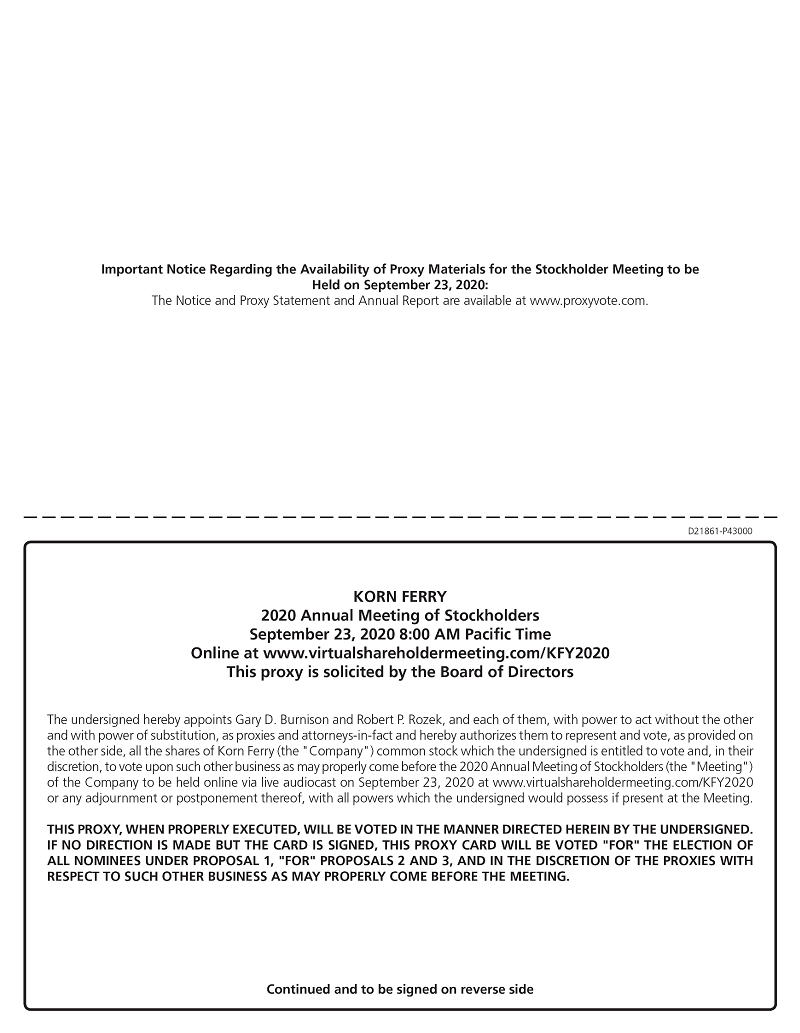
 | 2020 Proxy Statement
| 2020 Proxy Statement









